- ~ Home
- ~ Camino Sanabrés (The Sanabrés Way)
- Susana to Santiago de Compostela, Day Seventeen
Jump to Camino Sanabrés Stages
Camino Sanabrés, A Susana to Santiago de Compostela, Day Seventeen, 10.3 Kilometers (6.4 Miles)
Disclosure: the PilgrimageTraveler.com is an associate of Booking.com, Roamless, and Amazon. As associates of these merchants, we earn from qualifying purchases from our links.
Our day seventeen on the Camino Sanabres from A Susana to Santiago de Compostela, was a short and joyous day, starting at the foot of the Pico Sacro and finishing in the holy city.
🙋♀️ Why Trust Us at the Pilgrimage Traveler?
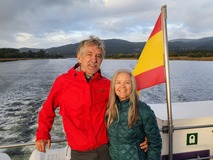
We’re not a travel agency ~ we’re fellow pilgrims! (See About Us)
We've trekked Pilgrimage Routes Across Europe since 2014!
💬 We’ve:
- Gotten lost so you don’t have to. 😉
- Followed waymarks in the glowing sunlight, the pouring rain and by moonlight. ☀️🌧️🌙
- Slept in albergues, hostels & casa rurals. Ate and drank in cafés along the way. 🛌 😴
- Created comprehensive and downloadable GPS maps and eBook Guides, full of must-have information based on real pilgrimage travels. 🧭 🗺️
- Shared our complete journeys, step by step to help YOU plan your ultimate pilgrimage and walk with your own Heart and Soul. 💙✨
Every detail is from our own experiences. Just fellow pilgrims sharing the Way. We have added a touch of spirituality, heartfelt insights and practical guidance from the road ~ offering a genuine connection to the spirit of pilgrimage. Tap into the wisdom of seasoned pilgrims!
Ultreia and Safe Pilgrimage Travels, Caminante! 💫 💚 🤍
Quote for Day Seventeen on the Camino Sanabrés, A Susana to Santiago de Compostela
Now this is not the end. It is not even the beginning of the end. But it is, perhaps, the end of the beginning. ~ Winston Churchill
What an interesting idea this quote presents. Indeed, on this day, it felt like the lines between the ending and the beginning were blurred. Therefore I really like the idea that the end of our physical pilgrimage was only the end of the "beginning."
Maps and Stats of Day Seventeen on the Camino Sanabrés, A Susana to Santiago de Compostela
For the short day, we were less worried about any services, but they are there as you can see from our map of our GPS tracks. Surprisingly, the walk is mostly through the countryside. However, as you near Santiago, you will find everything that you need.
There are several climbs on this short day, the most significant starts at about six kilometers, at the Ermita de Santa Lucía, where you will gain about 125 meters (410 feet) over approximately the next 2.5 kilometers.
The final climb into Santiago is more joyful than strenuous, but it does exist.
👣 Camino Sanabrés EBook:
Offline Guide with Bonus Route
~ Includes 4-5 additional days on the Vía de la Plata from Salamanca!
Walk smarter with our ad-free, beautifully formatted Camino Sanabrés eBook Guide, perfect for offline use ~ important in the mountainous and remote areas. Includes daily stage details, stunning photos, historical background and a BONUS digital guide on the Vía de la Plata from Salamanca, called the Camino Fonseca. This allows you the opportunity to add 4-5 more days to your Camino in the beginning.
Don't carry a hard copy guide book to increase your pack weight. Use our frequently updated digital guide on your next Camino instead!
📲 Instant download. 💸 Money-back guarantee. 🔄 Free updates for 1 year.
👉 Click here for more info or BUY NOW!
Jump to Camino Sanabrés Stages
Photo-Rich Travelogue for Day Seventeen on the Camino Sanabrés, A Susana to Santiago de Compostela
We started out at sunrise from the Albergue Reina Lupa. We crossed the N-525 to join the road directly across from the Bar Rosende, where we had breakfast. Only 150 meters from the bar, we rejoined the Camino (see day sixteen if you desire to see a photo of this intersection) by turning left and up the hill. It is at this turn where I started my GPS tracking.
The sunrise over the Pico Sacro to the south, was glorious. See also day sixteen for the legends surrounding this Sacred Peak. As I walked up the hill, I kept turning back to look at it!
After only 280 meters or so, you come to a sawmill, and this T-intersection. Stay to the left as indicated in the photo.
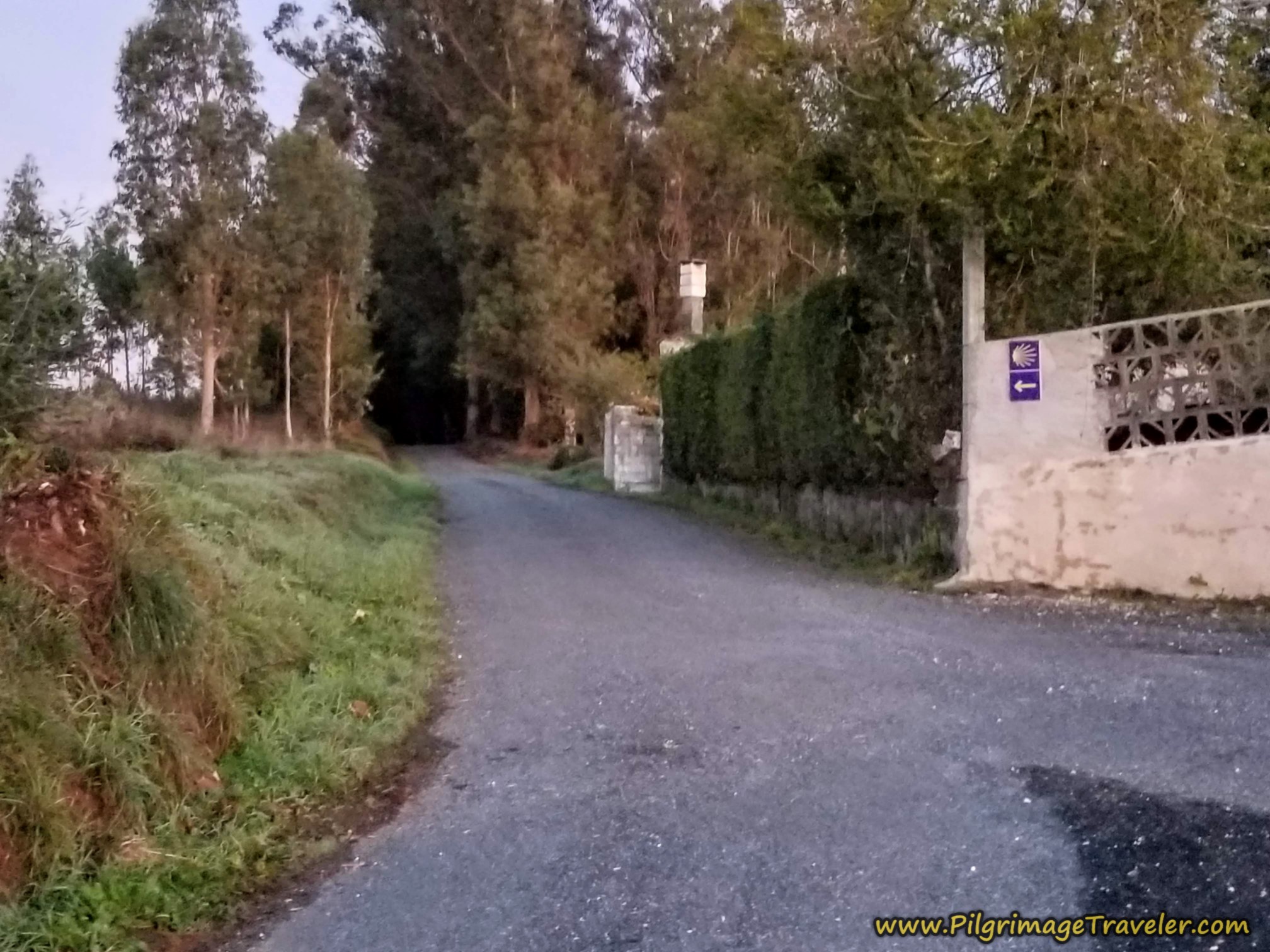 Stay Left Toward a Path in Gándara
Stay Left Toward a Path in GándaraContinue to climb for about 1/2 kilometer as you pass the sawmill. As we walked we had a look to the East and we were graced with more beauty of the sunrise over the countryside.
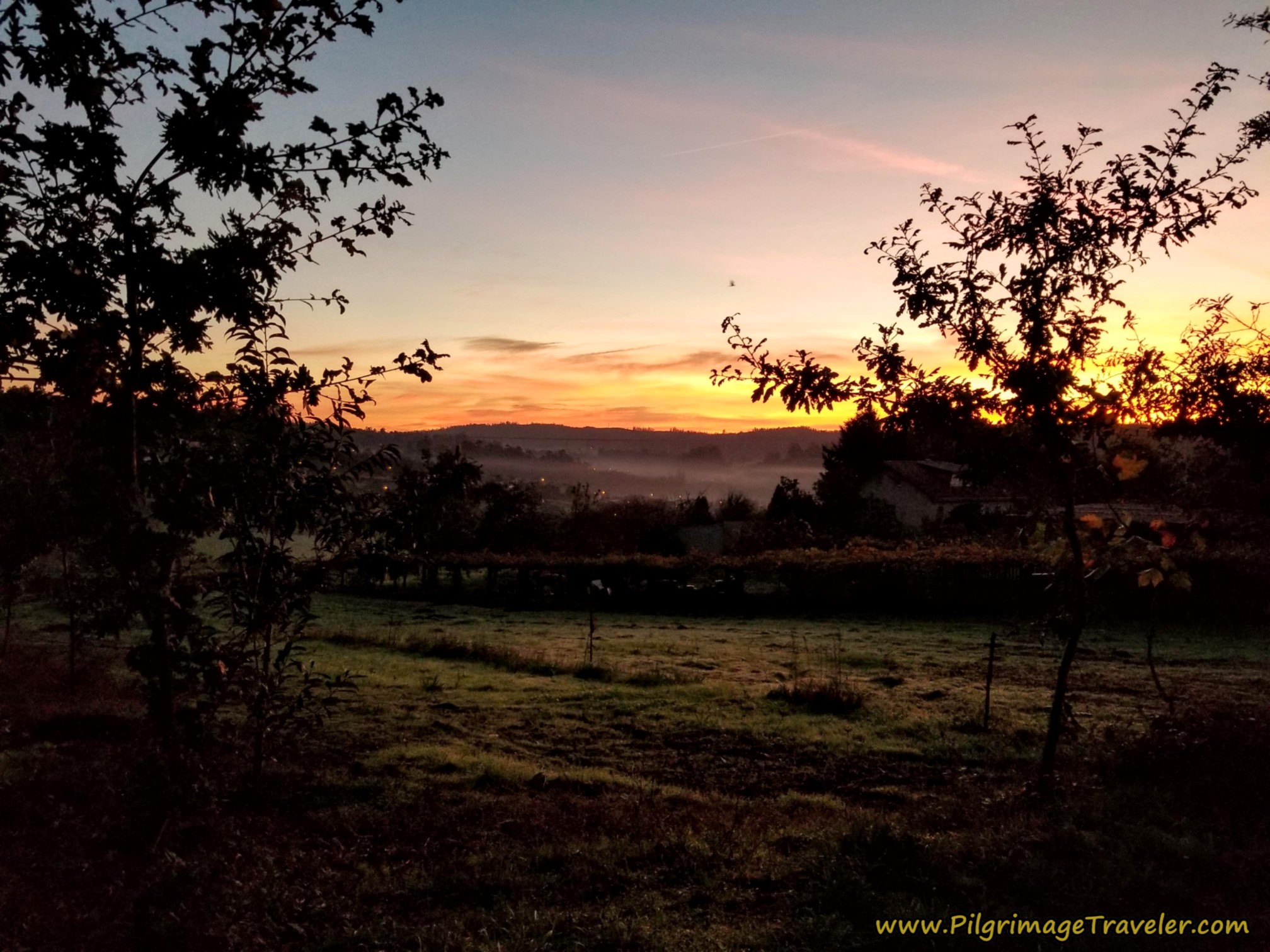 Sunrise Over Gándara
Sunrise Over GándaraAfter about 620 meters and just after the sawmill, come to a T-intersection and turn right, onto this nice lane.
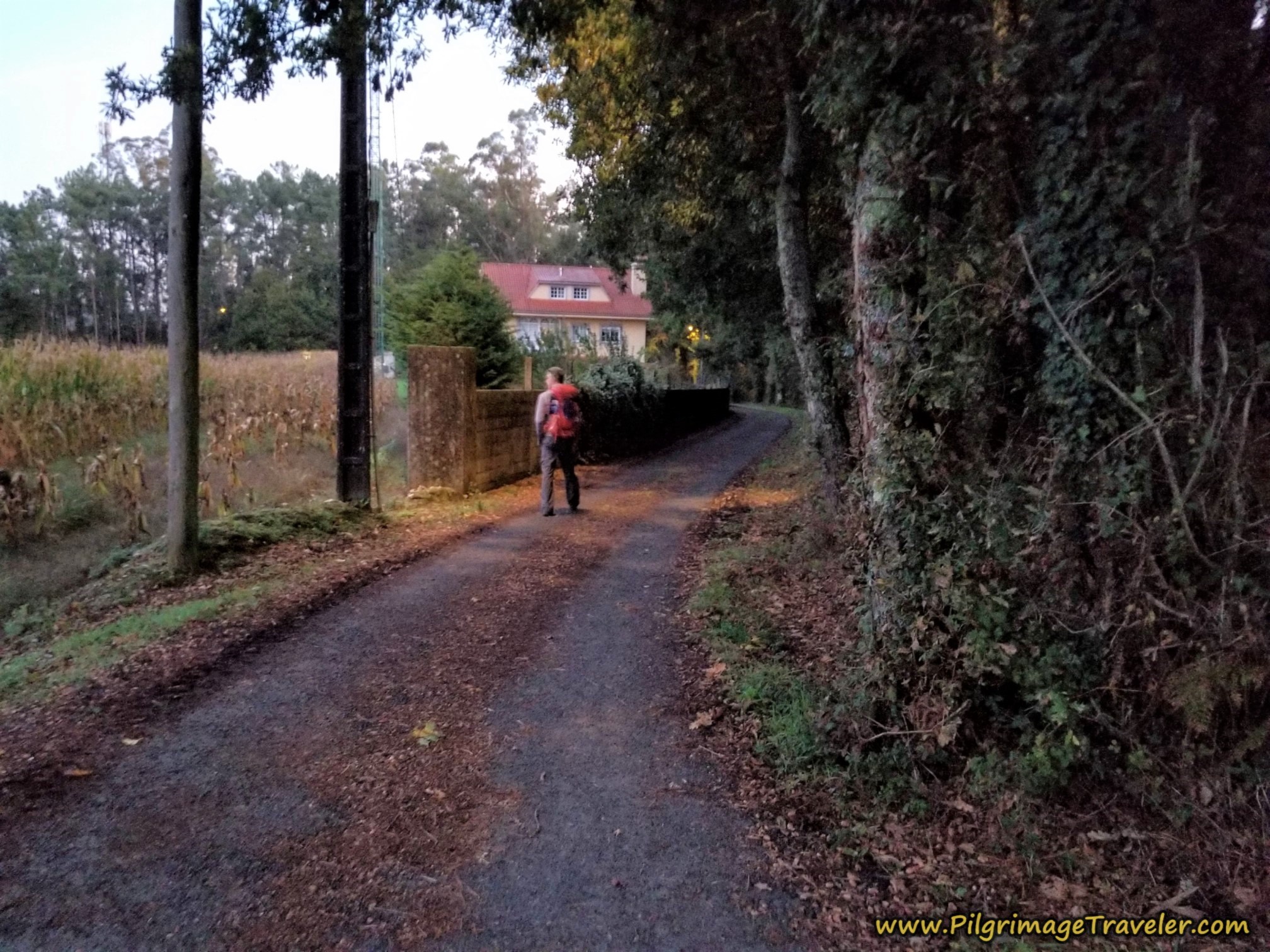 Right Turn Here Onto This Lane
Right Turn Here Onto This LaneYou walk on the lane until it becomes paved and downhill a bit in the area called A Gándara.
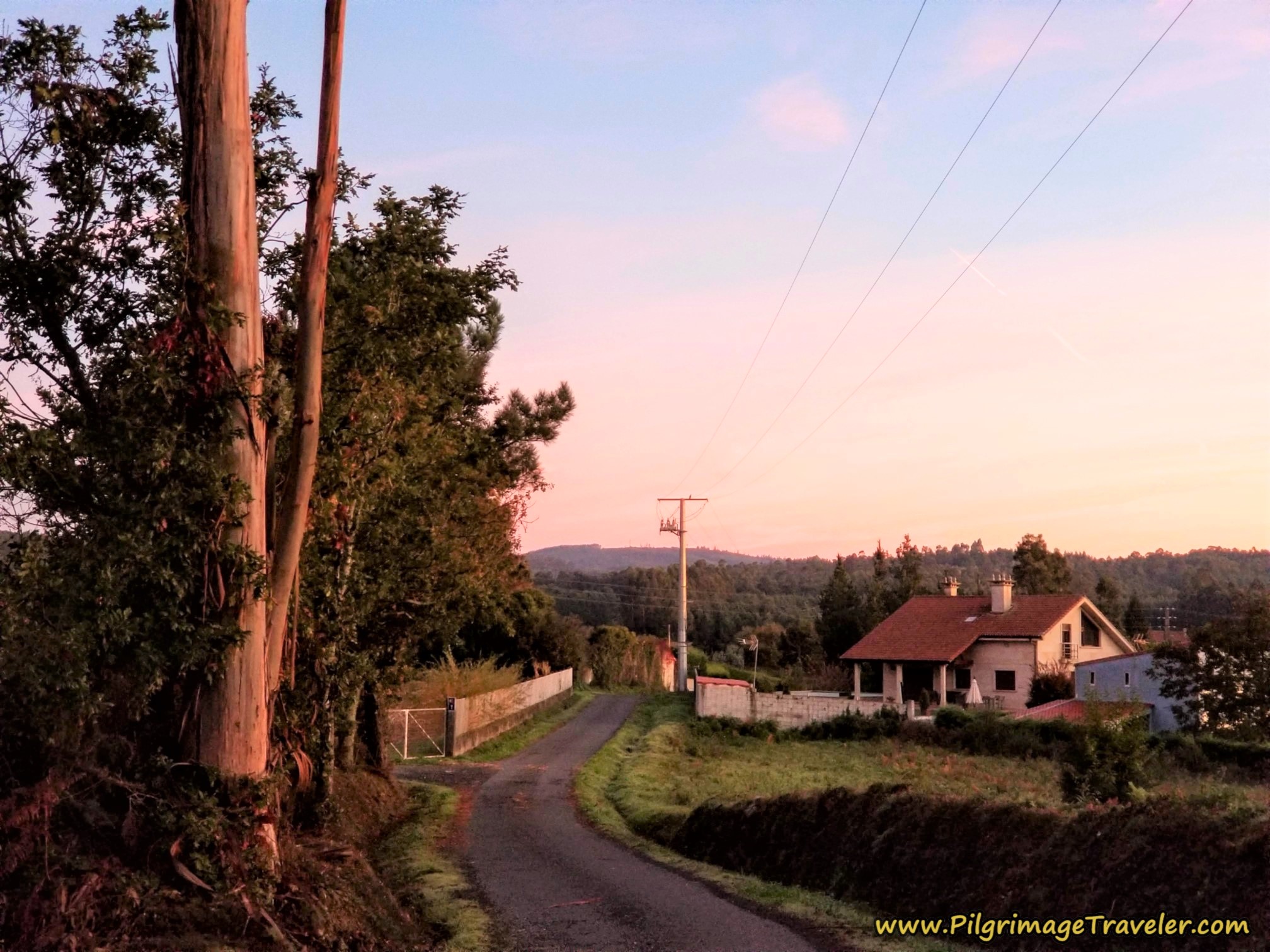 Downhill in Gándara
Downhill in GándaraAt kilometer 1.1 come to this crossroads, and turn to the left.
 Left Turn Ahead
Left Turn AheadOn this day that was the "end of the beginning," it felt like the sunrise was prolonged. I took a lot of photos! I love this time of the day, and on our final day to Santiago we were so blessed with this long sunrise.
In a few more meters, you take the next left at this bus station at approximately kilometer 1.27 on the Camino Sanabrés from A Susana to Santiago de Compostela. You are now on a street called the Calle de Sergude (AC-960).
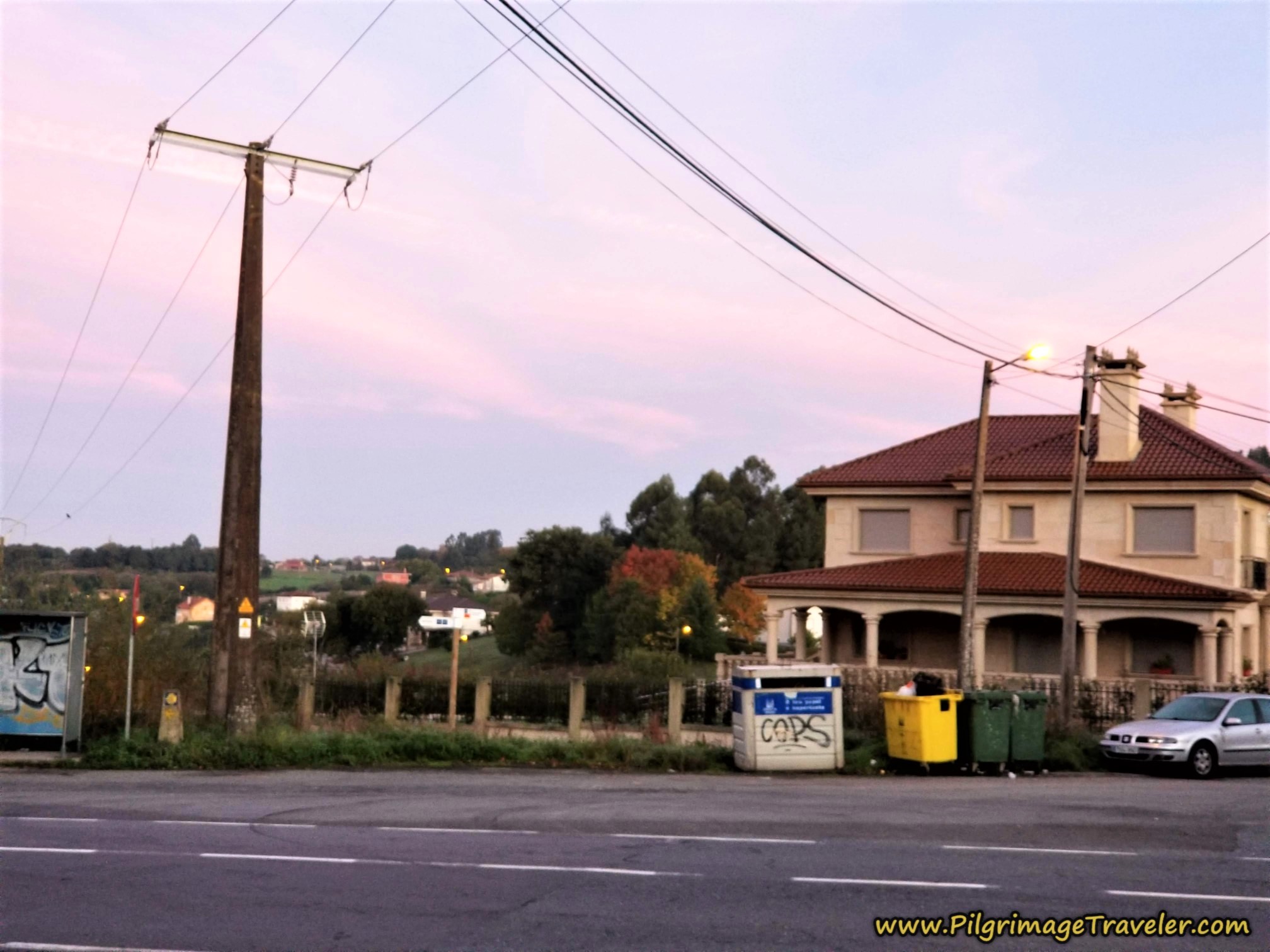 Left Turn Onto AC-960 Toward A Susana Center
Left Turn Onto AC-960 Toward A Susana CenterThe Calle de Sergude will now take you into the heart of A Susana. While this stage is titled as starting in A Susana, in actuality, it starts in a small area called Deseiro, just south of A Susana.
After walking on the main road into A Susana for about 160 meters, you come to this roundabout with the N-525 at about kilometer 1.43. We laughed when we saw that it was only six kilometers to Santiago by the N-525, when we still had at least nine kilometers on our Camino.
There is a café bar to the left of the roundabout if you need one as you walk through town.
You walk straight through the roundabout and pick up the small street called the Travesa da Susana, between the two buildings, shown below.
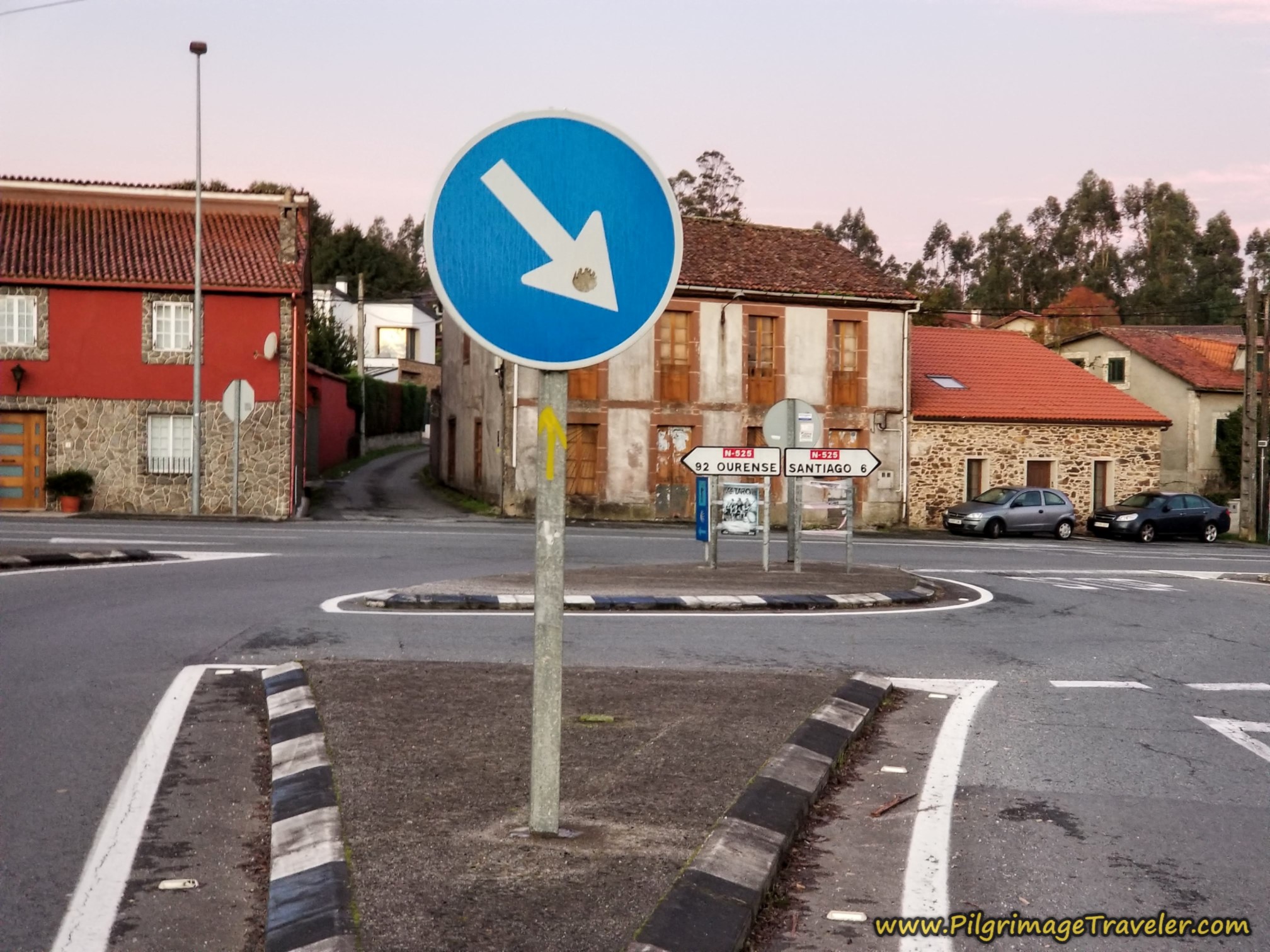 Walk Through the Roundabout in A Susana
Walk Through the Roundabout in A SusanaFollow the quiet Travesa da Susana, below, until the pavement gives way to a back lane, shown next.
 Along the Travesa da Susana
Along the Travesa da Susana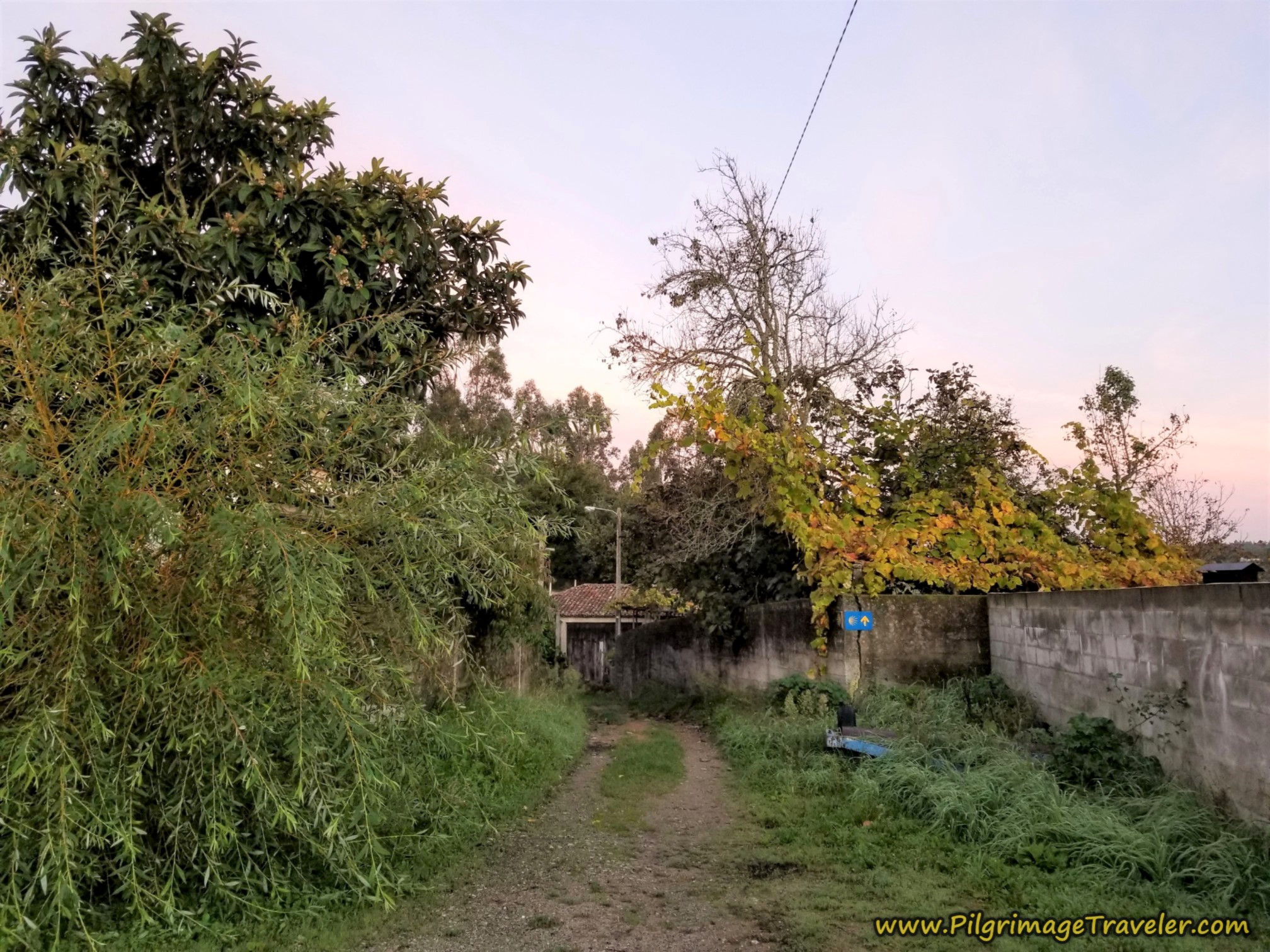 Road Turns to Back Lane
Road Turns to Back LaneThis is a scenic little lane, walking you through homes and grape arbors as you gently descend.
After 1.75 kilometers, come to a crossroads, where the lane ends, but you walk straight through onto a paved road, and by this picnic area.
Jump to Camino Sanabrés Stages
You have entered a recreational area, and the Camino drops steeply from here, through the area and towards the River, the Barranqueira de Peiras.
First, descend and walk under the N-525 through this tunnel, and stay to the left at a Y-intersection after the tunnel.
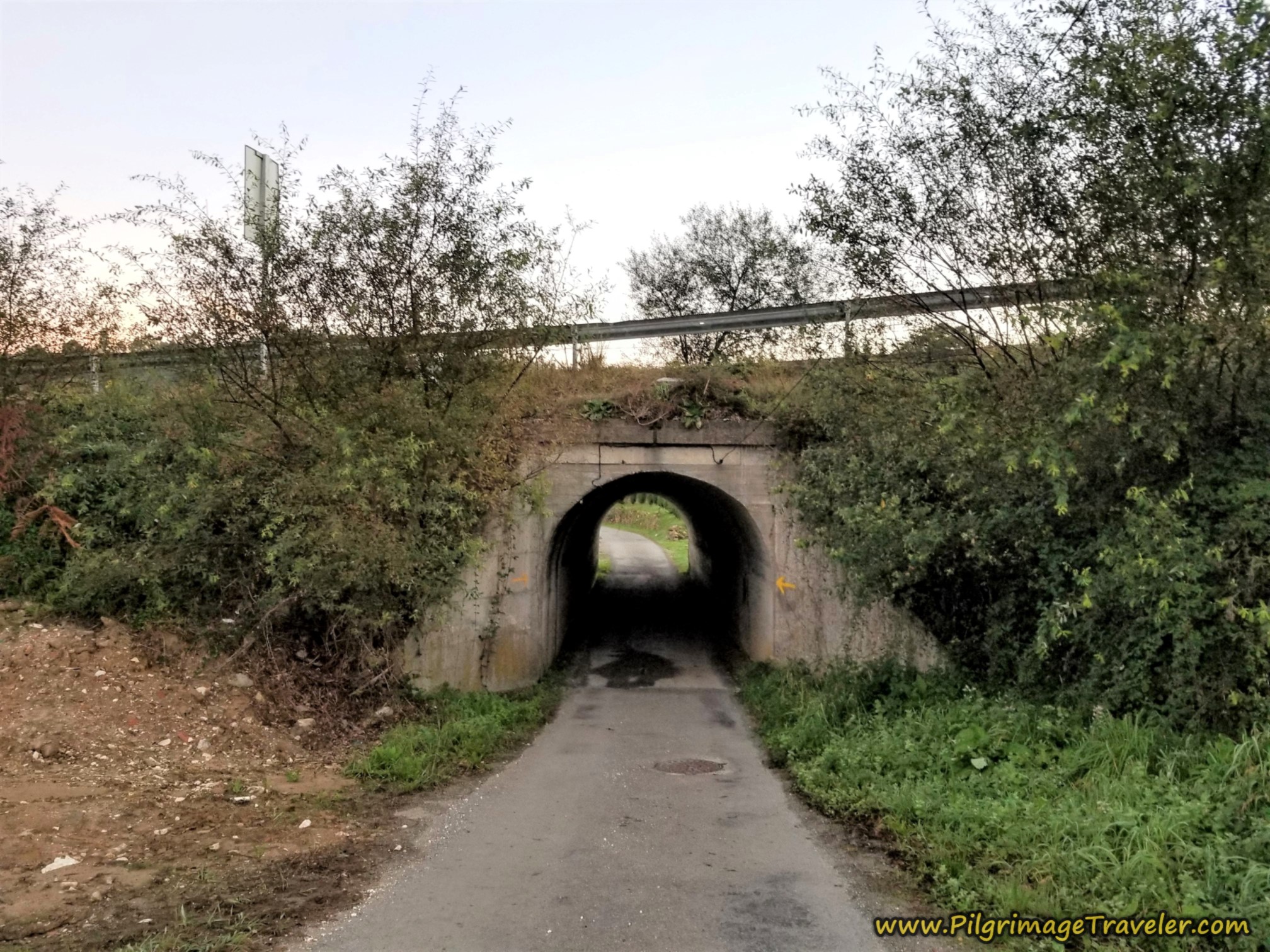 Walk Under the N-525
Walk Under the N-525You will reach the low-point of the river after about 2.0 kilometers total on the Camino Sanabrés from A Susana to Santiago de Compostela.
After crossing the river, of course it is all uphill for the next 1/2 kilometer. Stay left at the first Y-intersection after the river. 70 meters later, take the first right hand turn, shown below, to continue the steep climb.
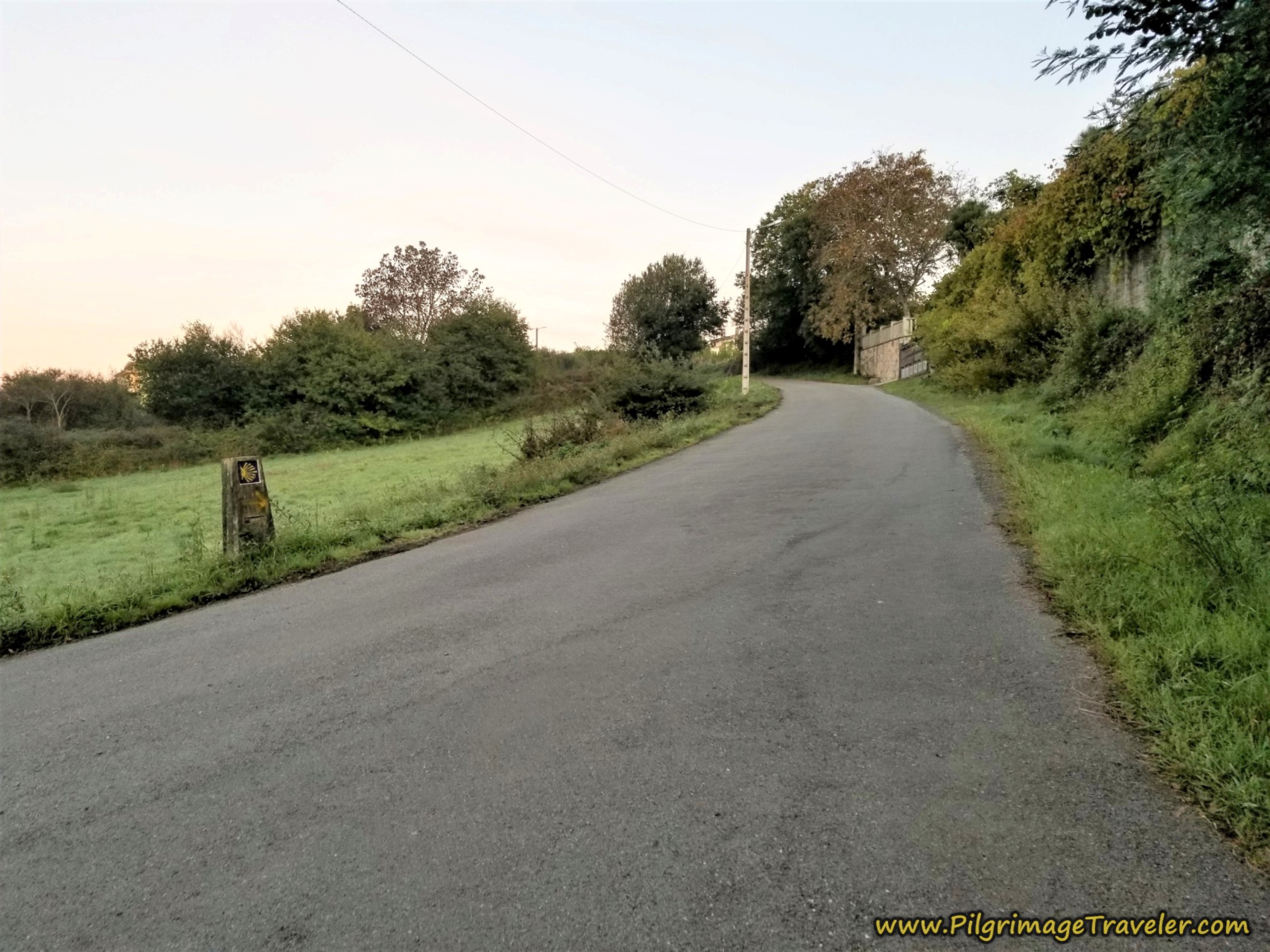 Uphill from the River, Barranqueira de Peiras
Uphill from the River, Barranqueira de PeirasFollow this road for about 1/4 kilometer, and the Camino directs you to turn right again, continuing the steep climb from the river, shown below. At this turn, you are now approximately 2.3 kilometers into this final day.
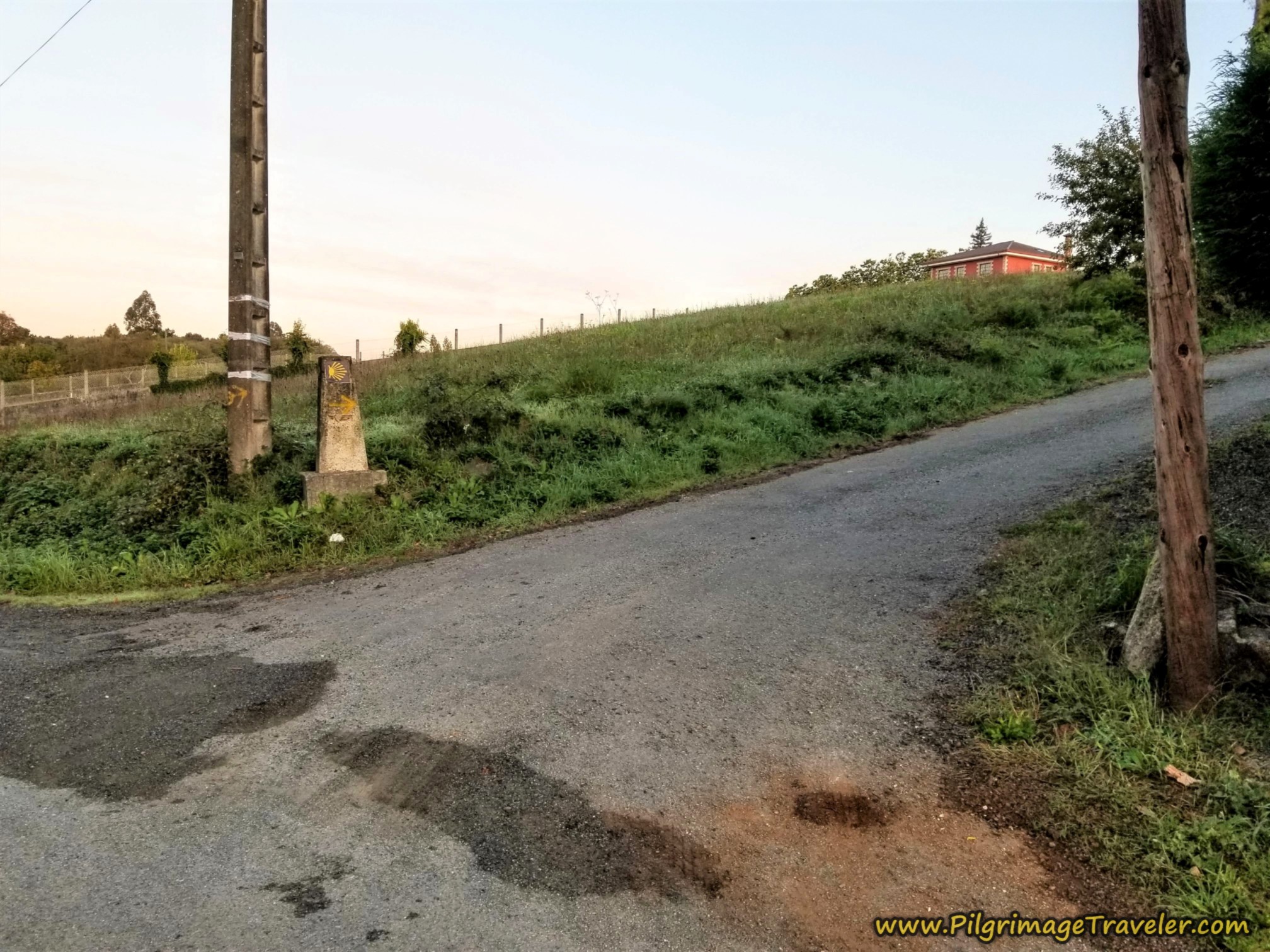 Take a Right Turn to Continue Climbing
Take a Right Turn to Continue ClimbingAfter about 160 meters more, come to a T-intersection, where you will turn to the left. 60 meters later you turn right to cross over these railroad tracks on a bridge. It is important to note that you are at 2.5 kilometers total, about 1/4 of day seventeen finished, on the Camino Sanabrés from A Susana to Santiago de Compostela!
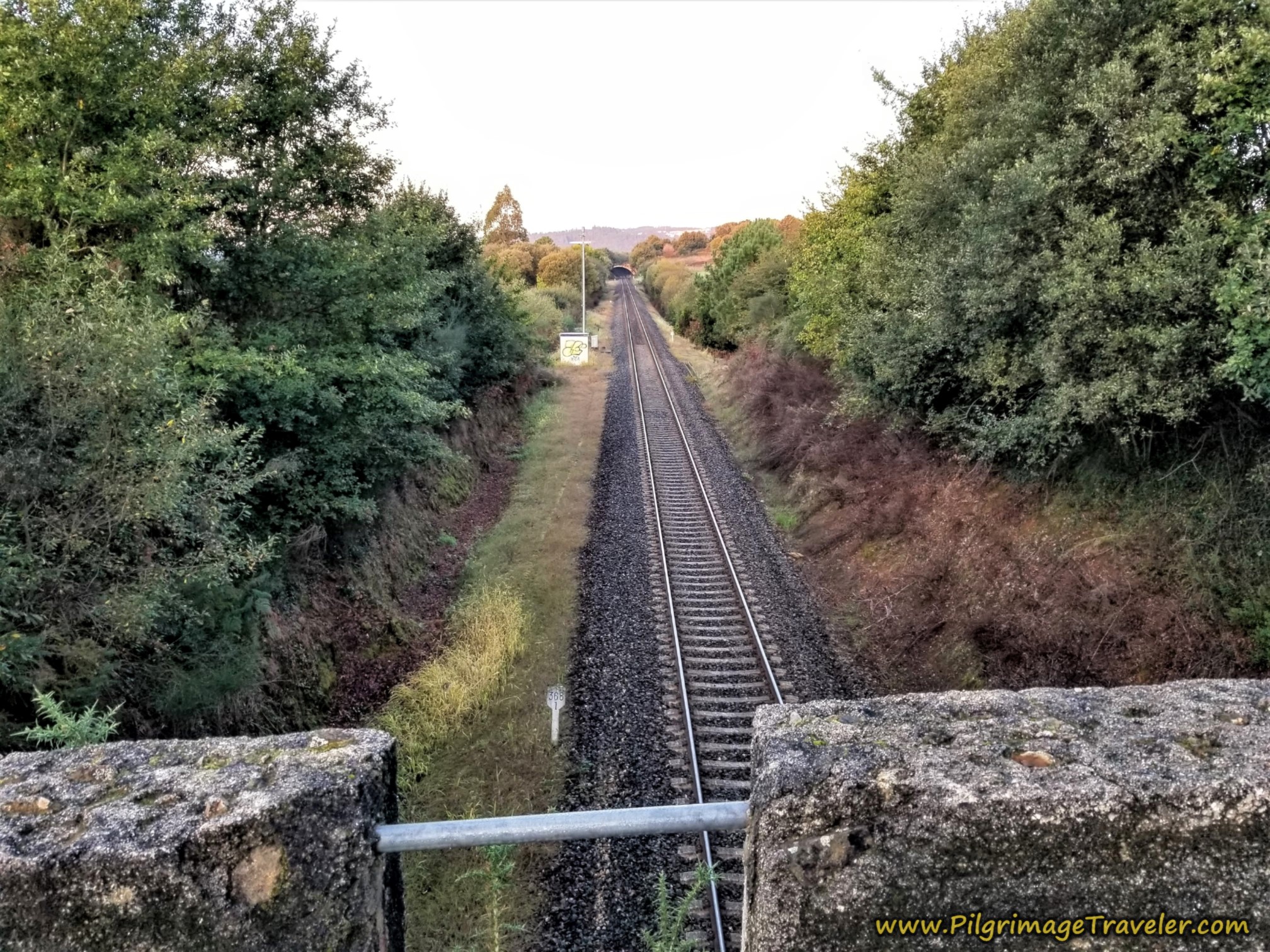 Cross Railroad, Camino Sanabrés, A Susana to Santiago de Compostela
Cross Railroad, Camino Sanabrés, A Susana to Santiago de CompostelaA few meters from the railroad crossing, at the next intersection, you take a hard left. 300 meters onward, you will see the next turn to the left, shown in the photo below.
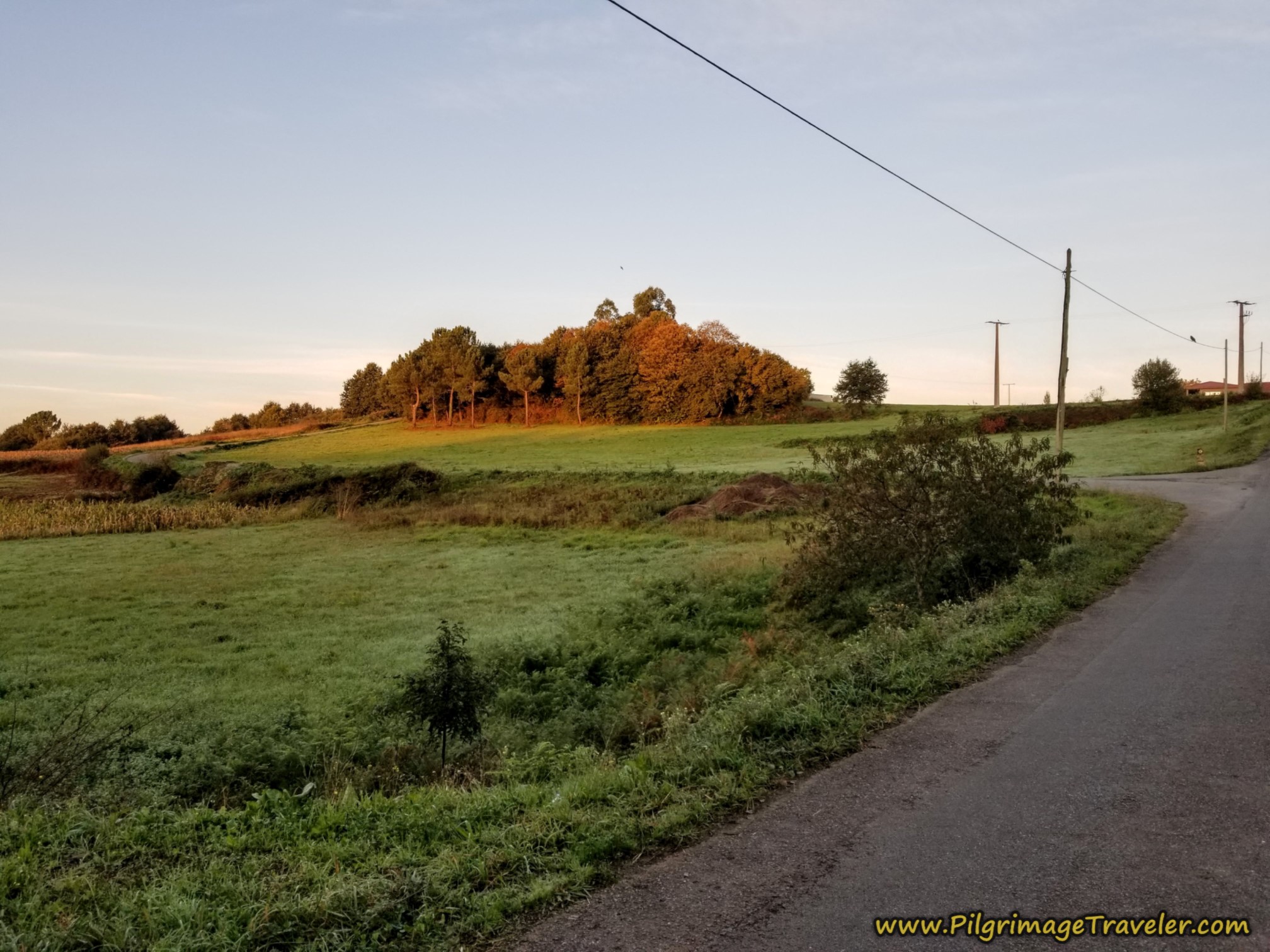 Left Turn Towards Aldrei
Left Turn Towards AldreiCrest a hill after the turn, and this is the altitude top from the river bottom at kilometer 3.17. This is the climb in the initial part of the day.
Head down the hill towards Aldrei. You can see larger towns in the far hills, but these are not the hamlet of Andrei.
If you look very carefully over your right shoulder, as you walk by a clearing, you can see the towers of the cathedral of Santiago to the north. Look for the ridgeline and see the large white radio tower. The cathedral spires will be just below it!
At the bottom of the hill, come to a T-intersection and make a right hand turn to enter the town of Aldrei.
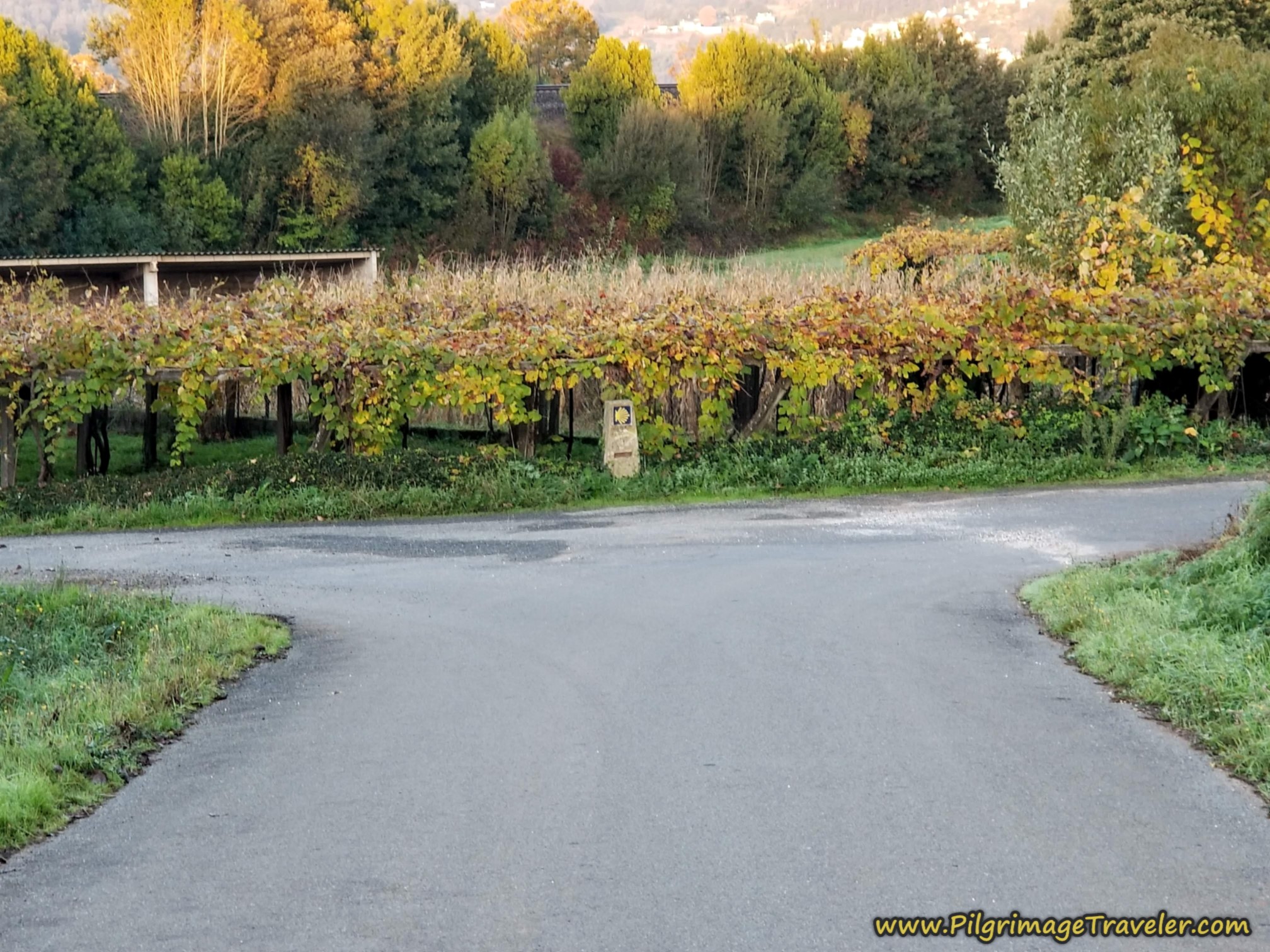 Right Turn Into Aldrei
Right Turn Into AldreiIn a few more meters, after arriving into the center of town, pass the town water fountain by the town cruceiro.
Stay to the left at the next Y-intersection pictured below. You are at about kilometer 3.62 on the Camino Sanabrés from A Susana to Santiago de Compostela.
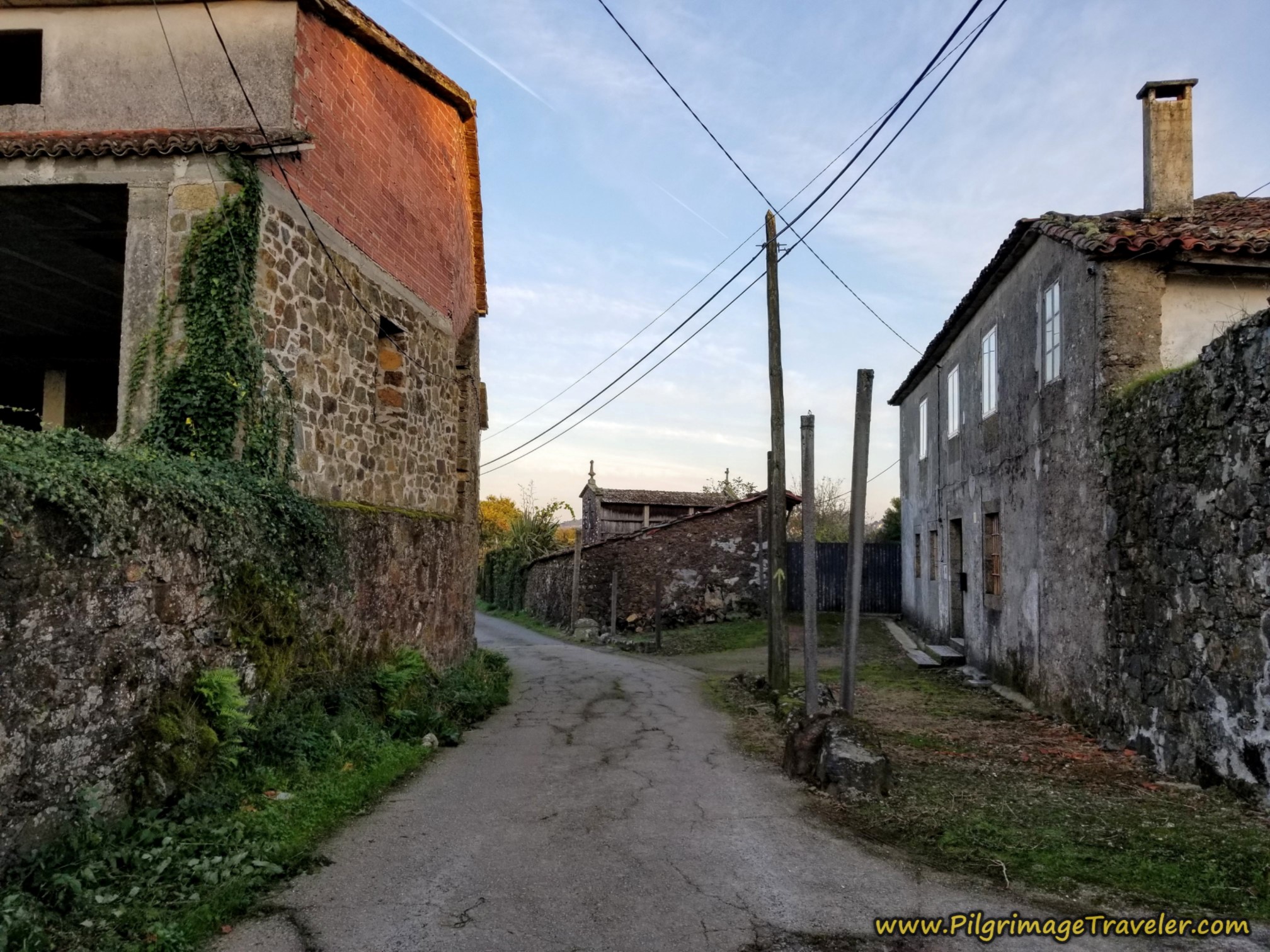 Stay Left in Aldrei
Stay Left in AldreiAt 1/4 kilometer onward, come to a T-intersection, and go left, walk down and under the railroad tracks again. Immediately on the other side of the railroad tunnel, take a right turn up a small hill with a sign that identifies the area as Vixoi.
About 1/3 kilometer after the turn in Vixoi, the Camino takes a left turn by a very large home on a hill. From this home, the steep descent towards the river begins, the Rega das Covas de Santa Lucía and the Ermita there. The town of Piñeiro is just beyond the river.
Stay straight through for the next 1/3 kilometer and continue down the steep hill. Where it levels out a bit, take a right turn at this intersection, shown below.
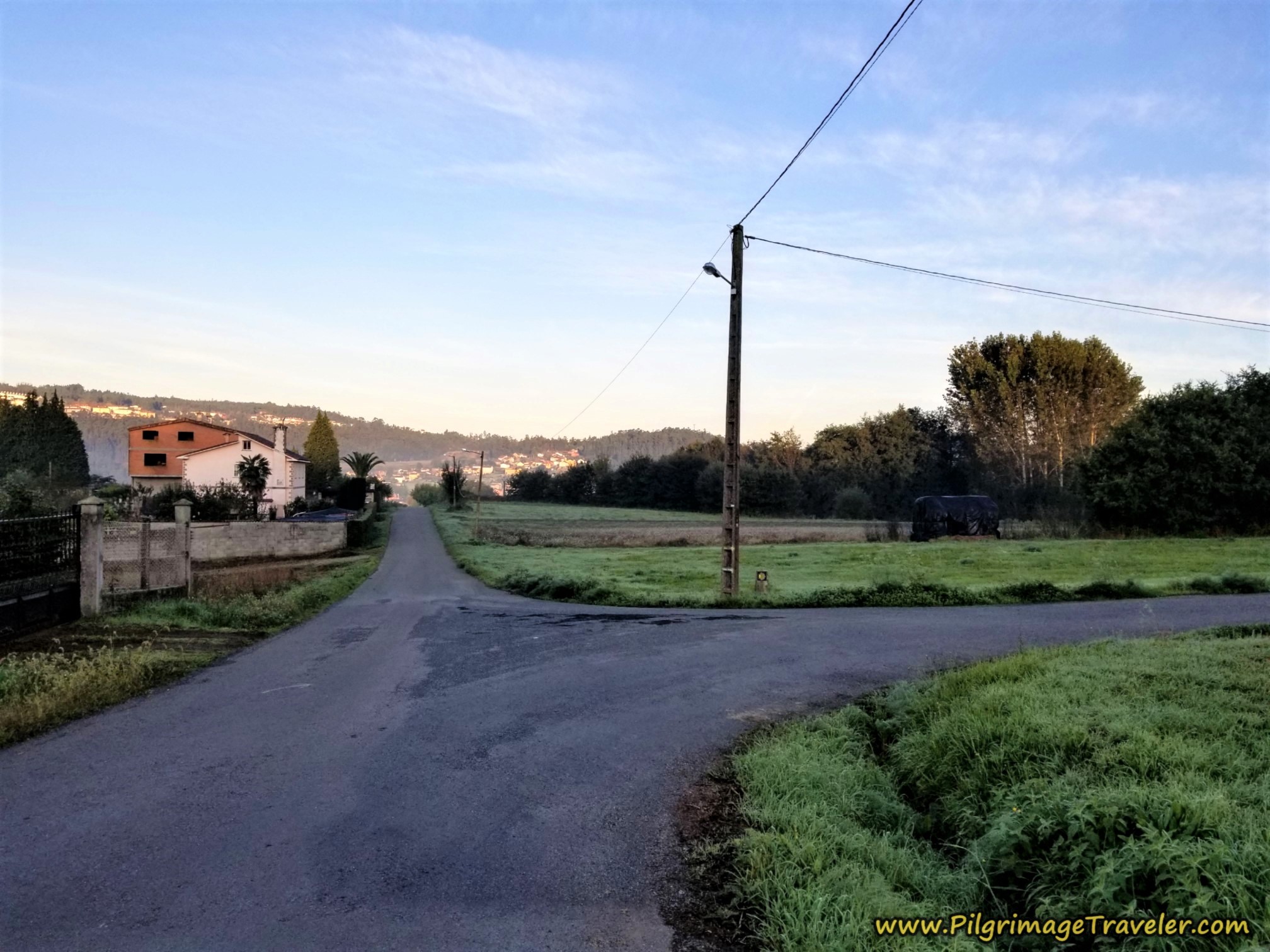 Right Turn Towards the Ermita de Santa Lucía
Right Turn Towards the Ermita de Santa LucíaAt the next intersection, 130 meters later, go left.
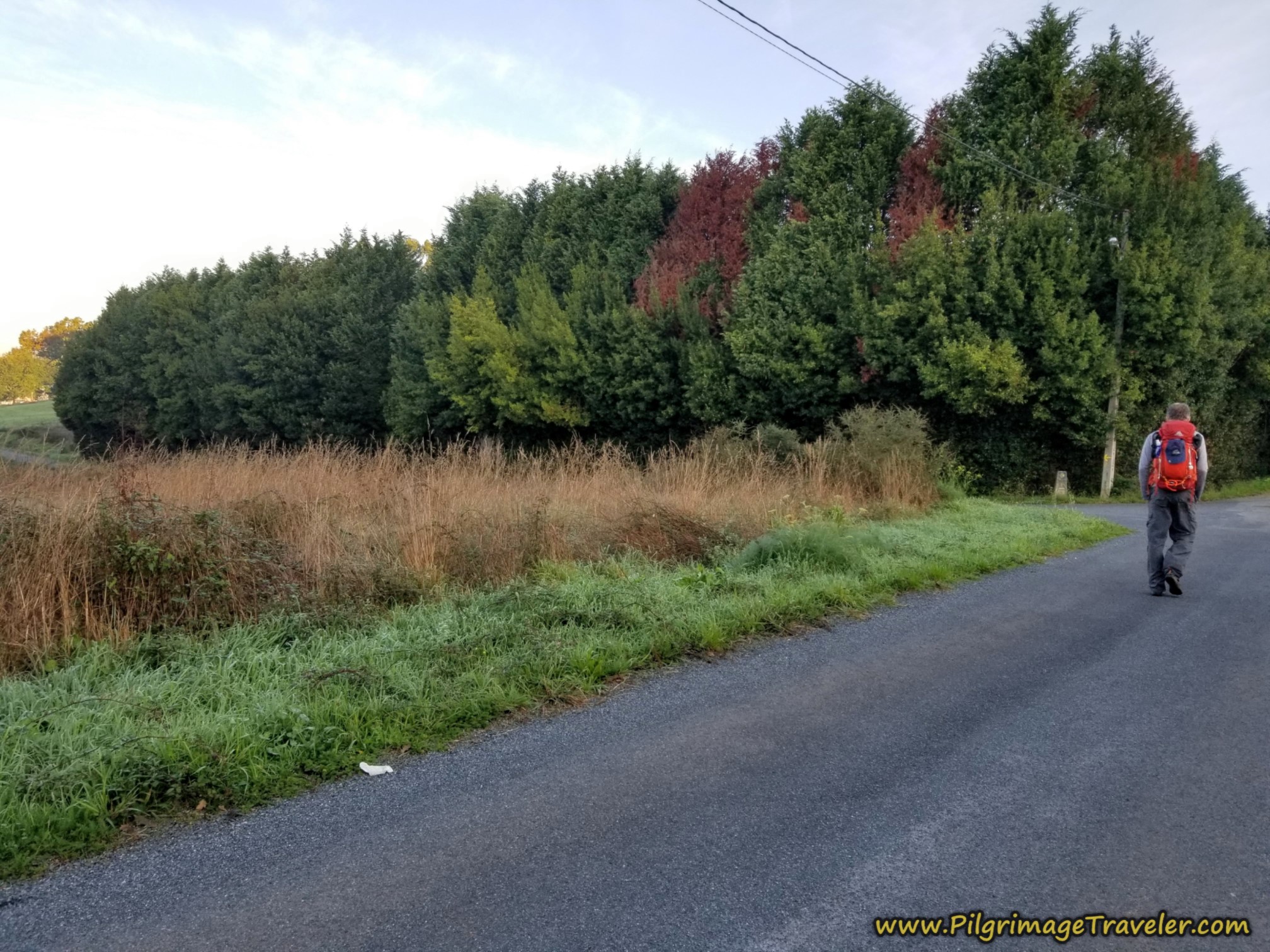 Left Turn Towards the Ermita de Santa Lucía
Left Turn Towards the Ermita de Santa LucíaThis road now takes you on the remaining 700 meters of steep descent to the river and the Ermita de Santa Lucía.
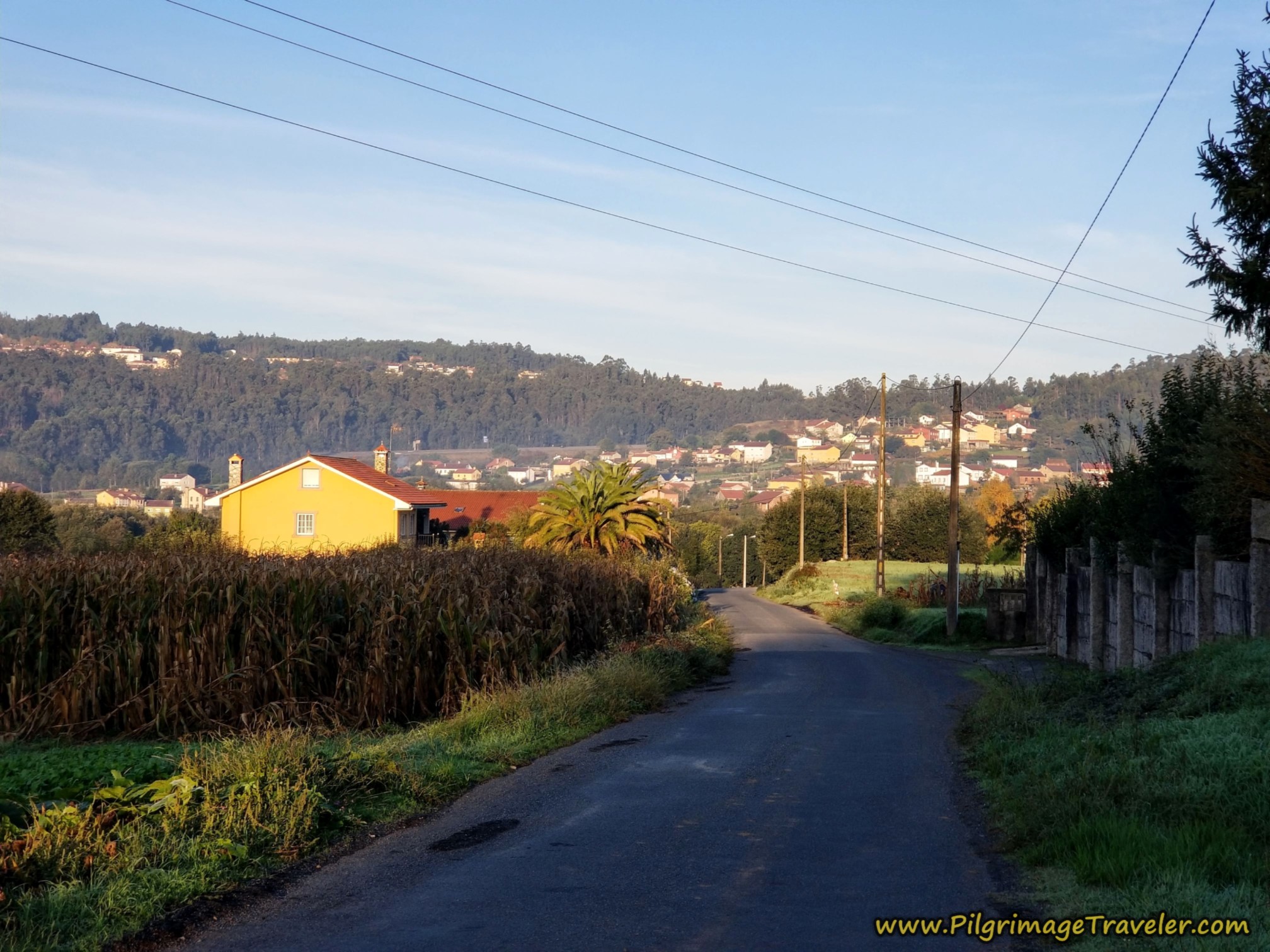 The Steep Descent to the Rego das Covas de Santa Lucía
The Steep Descent to the Rego das Covas de Santa LucíaWhen you finally reach the bottom at the Ermita and the river, you are at kilometer 5.5 on the Camino Sanabrés from A Susana to Santiago de Compostela. The Ermita is built right by the river itself, and unfortunately, was not open when we walked by.
Jump to Camino Sanabrés Stages
Pictured below is the bridge crossing the river by the Ermita. If you like, for a brief historic, and contemplative walk, you could leave the road, cross this bridge and go on a cobblestone path by the river that parallels the road.
The path comes out to a street in less than 100 meters, taking a stairway up to the street, where you can turn left and rejoin the adjacent Camino road.
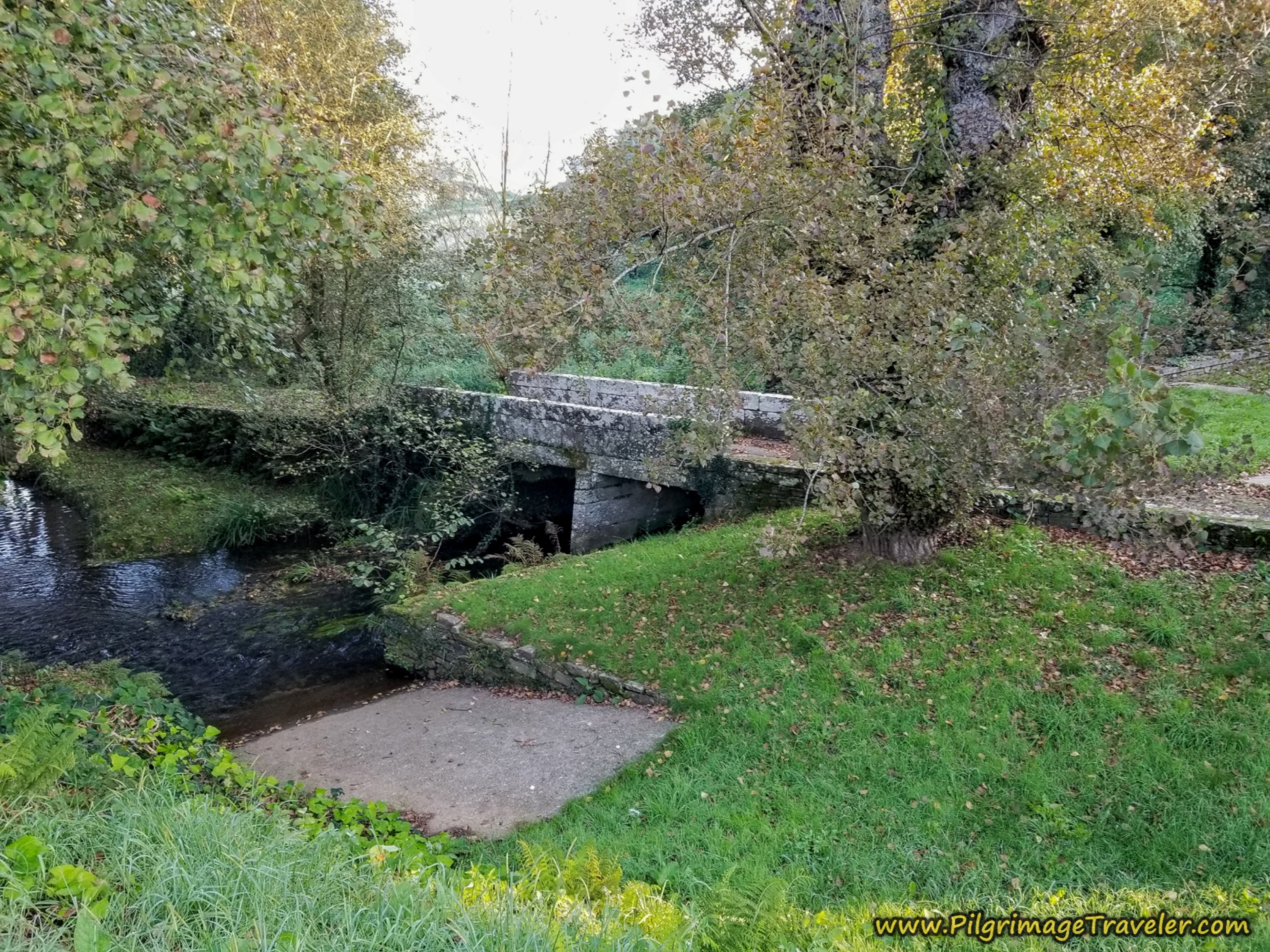 Bridge Over the Rego das Covas de Santa Lucía, by the Ermita
Bridge Over the Rego das Covas de Santa Lucía, by the ErmitaWhen you leave the river it is a short uphill walk into Piñeiro. Stay straight at the first crossroad, then stay to the right at the next two Y-intersections as you continue uphill through town and through the arbors, below. There are cafés in town if you need one. Reach the town cross after 350 meters.
 Walk Through Piñeiro
Walk Through PiñeiroOn the northern fringe of town, about 1/4 kilometer later, come to this intersection with the tower on the corner and go straight on by the tower.
 Straight on at Tower
Straight on at TowerWalk through the countryside on the secondary, paved road and after another 1/4 kilometer, the paved road ends at this sign. A dirt lane continues on, with the signage announcing that Santiago is only four kilometers away!
Indeed, it is 6.37 kilometers into the day on the Camino Sanabrés from A Susana to Santiago de Compostela, when you enter the forest for the final secluded walk. By my figures, that meant less than four kilometers!
You get to walk in serenity for about 2/3 kilometer, before the marks of civilization find you, when the AP-9 motorway looms before you. Stay on the dirt lane and walk under the motorway.
After going under the AP-9 and up and out on the other side, you can see the impressive white buildings of the City Cultural Center in Santiago ahead.
You keep to the lane for another 100 meters, as the lane turns to pavement by the first house. You now walk through a small park called the Parque de Angrois, with tennis courts and other amenities. There are picnic tables here if you need a break.
It is here by the tables that you will see a sign indicating that you have entered the Concello de Santiago.
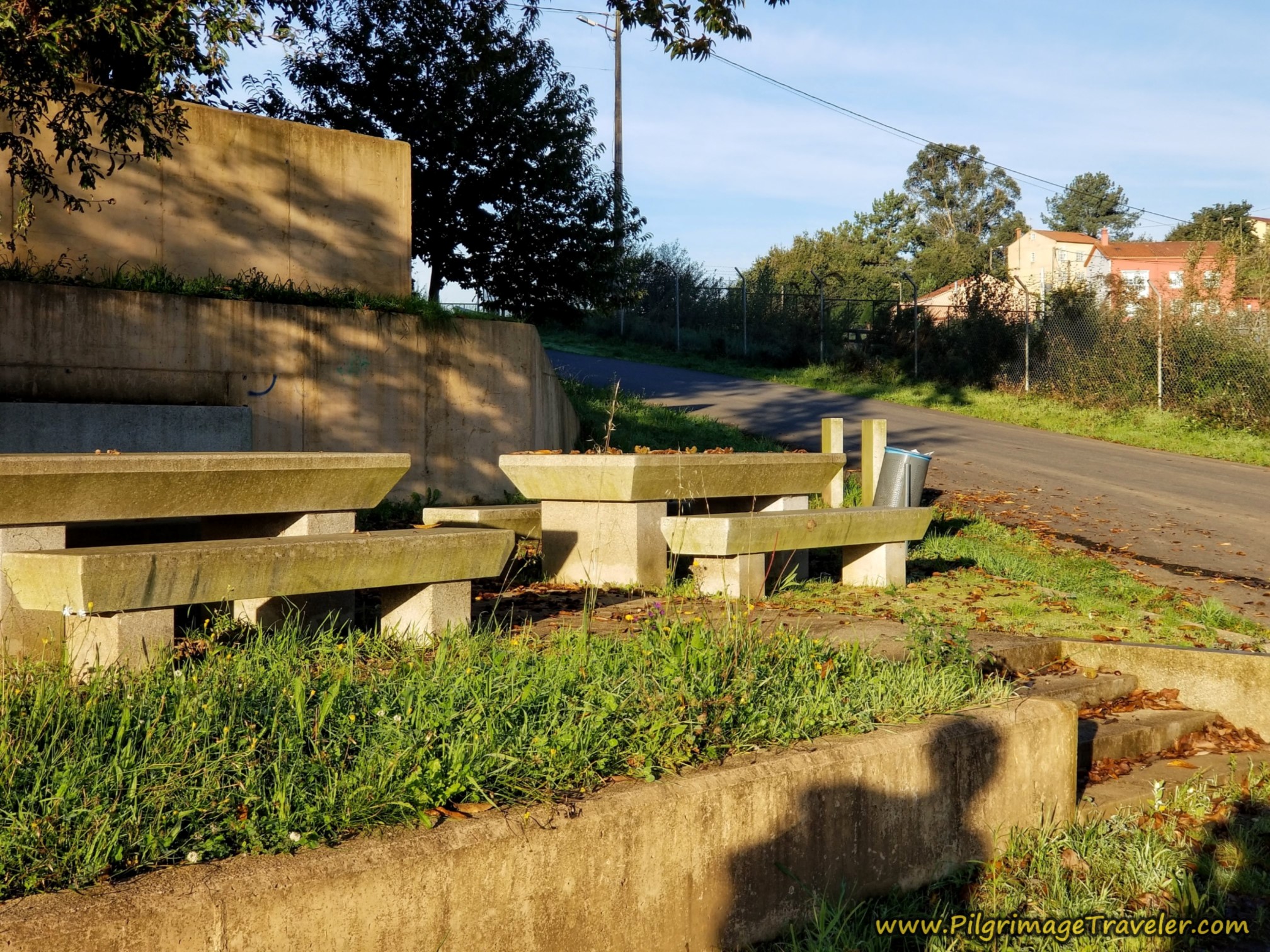 Turn Left After Picnic Tables in the Parque de Angrois
Turn Left After Picnic Tables in the Parque de AngroisJust past the picnic tables, there is a T-intersection, where you take a left turn onto the road that parallels railroad tracks. Walk up the hill on this road to the bridge that crosses the tracks. Turn right and cross the bridge.
After the railroad tracks, bend to the right and on the right side of the road by the bridge there is a cross. This cross is a memorial to the very serious passenger train accident in 2013. It was at this bend in the tracks, where a train derailed injuring 140 people and killing 79. The conductor was going twice the speed limit and was charged with 79 counts of homicide by professional recklessness. You may see candles at the cross, memorabilia, and perhaps even articles hanging on the fence along the railway bridge. So sad.
At the cross, you are at about 7.33 kilometers total on day seventeen on the Camino Sanabrés from A Susana to Santiago de Compostela.
After the cross, do not stay to the far right, but a few steps down the hill from the memorial, there is a bus stop. Take the middle road directly across from the bus stop, following pedestrian crosswalk markings on the street, up the hill and onto the Rúa de Angrois.
If you look closely, just after the turn where the wall ends is a very small bronze shell waymarker on the pavement, seen in the photo below. This confirms you have taken the right choice. (There is also a blue shell tile waymark and a blue Camino sign on the opposite wall that is easier to see!)
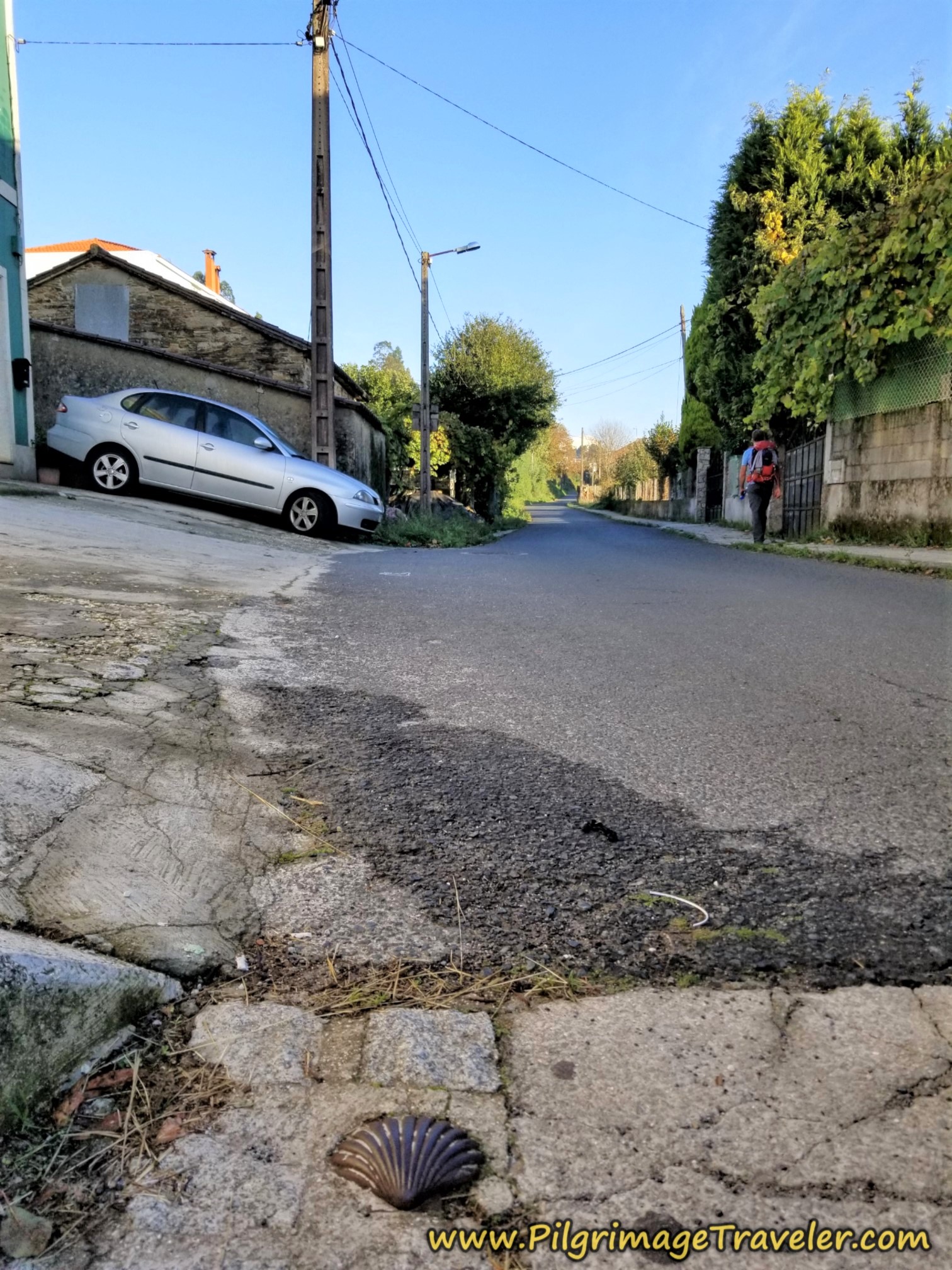 Up the Hill on the Rúa de Angrois
Up the Hill on the Rúa de AngroisContinue on the Rúa de Angrois, continuing the uphill walk, for another 700 meters. You will know you are at the top of this climb, when you come to this yellow house, shown below with the waymark. You are at about a bit more than 8.0 kilometers into the day on the Camino Sanabrés from A Susana to Santiago de Compostela.
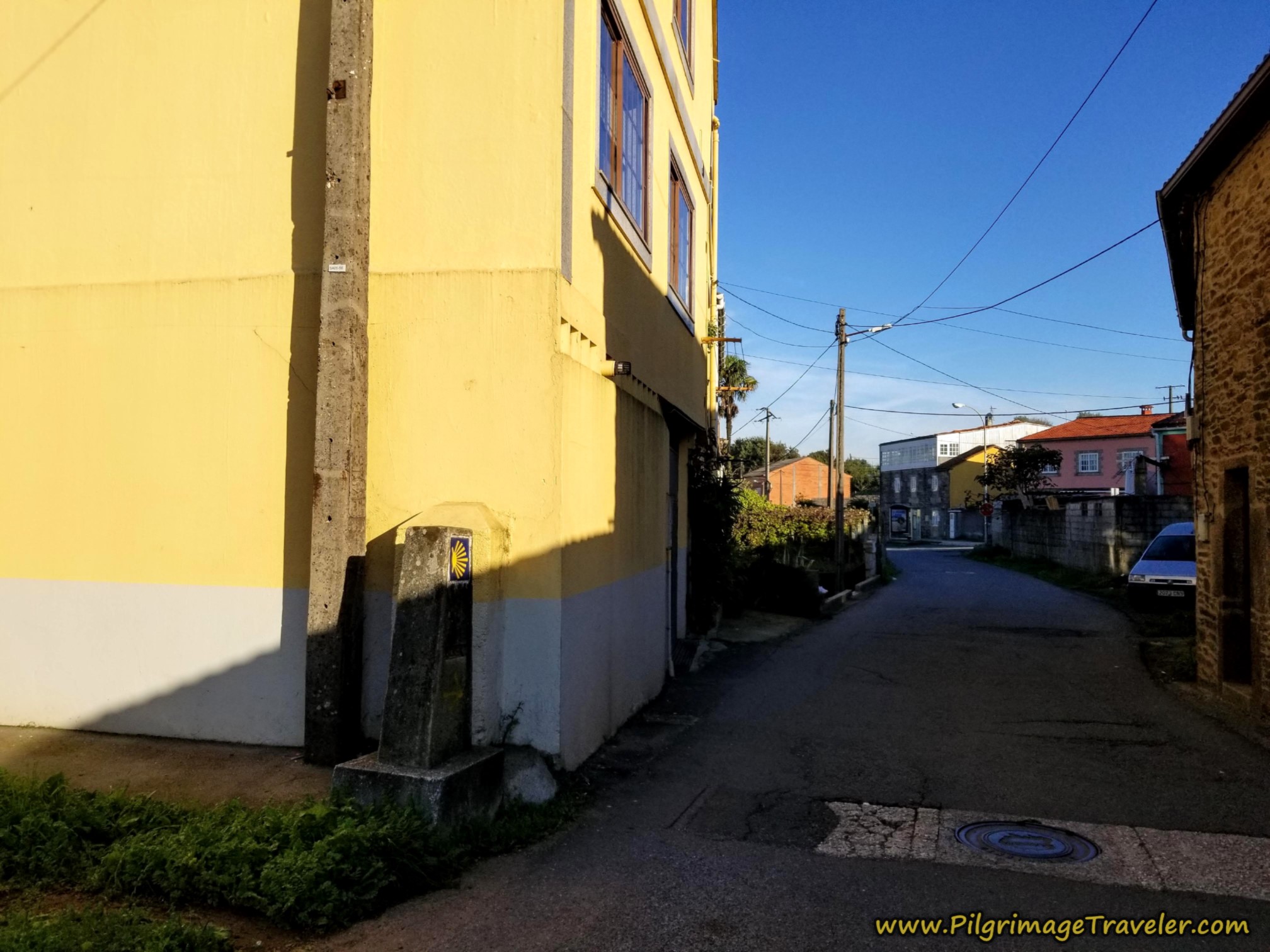 Continue on the Rúa de Angrois
Continue on the Rúa de AngroisContinue onward, past the yellow house, and in a few more meters you will come to a crossroads with a busy road. There is a large cross on this corner, the Crucero de Sar.
Cross over the busy road, on a diagonal trajectory and pick up the quieter Rúa de Sar, with lovely grassy cobblestones. You will now be descending quite steeply for about the next kilometer, towards the Sar River.
This descent affords dramatic views over the city of Santiago de Compostela! What is that ahead? For the first time since entering the city, you will have a view of the spires of the cathedral.
With the combination of the grassy cobblestone road and the amazing views of the cathedral, Rich and I thought this was the best entry, by far, into Santiago on any Camino!
Jump to Camino Sanabrés Stages
As you walk down the hill on the Rúa de Sar, you are afforded many more spectacular views of the cathedral spires and the clock tower. It was a motivating sight, unique to the Camino Sanabrés from A Susana to Santiago de Compostela!
With the cathedral still in view, the narrow Rúa de Sar joins the Rúa da Ponte do Sar, a wider avenue, after about 1/2 kilometer from the top.
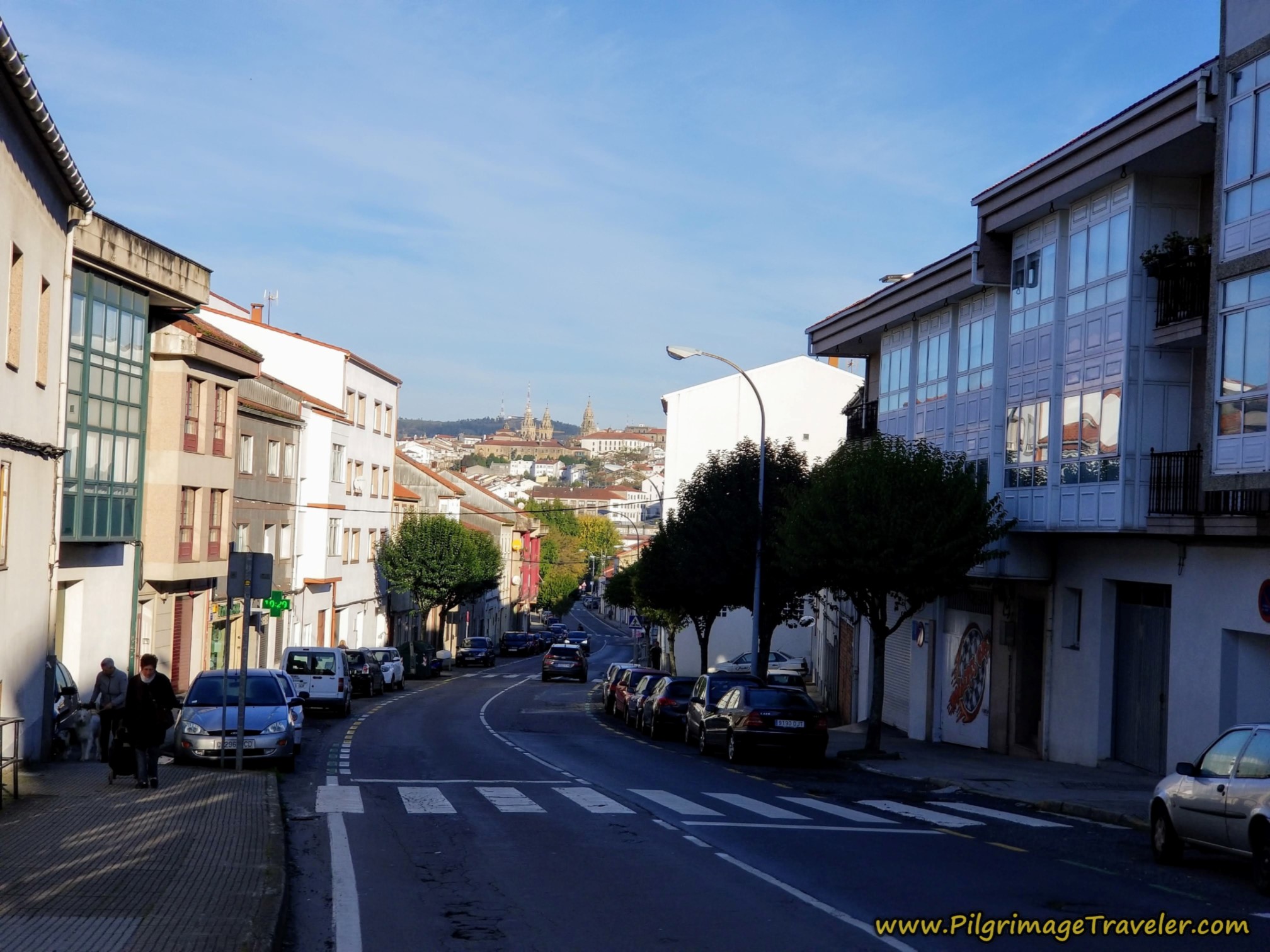 Join the Rúa da Ponte do Sar
Join the Rúa da Ponte do SarAfter a bit more than 1/3 kilometer, you come to the crossing of the Río Sar on this wonderful little Romanesque bridge, shown below. You are at almost exactly kilometer 9.0 at the bridge on the Camino Sanabrés from A Susana to Santiago de Compostela.
Now, you have a remaining 60 meter climb over about one kilometer, up from the river and into the old town of Santiago.
After crossing the Sar River, continue on the Rúa de Sar for 200 meters, crossing under railroad lines and a motorway.
Walk another 1/3 kilometer, where as is typical in cities in Spain, the street now becomes the Rúa do Castrón Douro. As you can see in the photo below, this street climbing is steep!
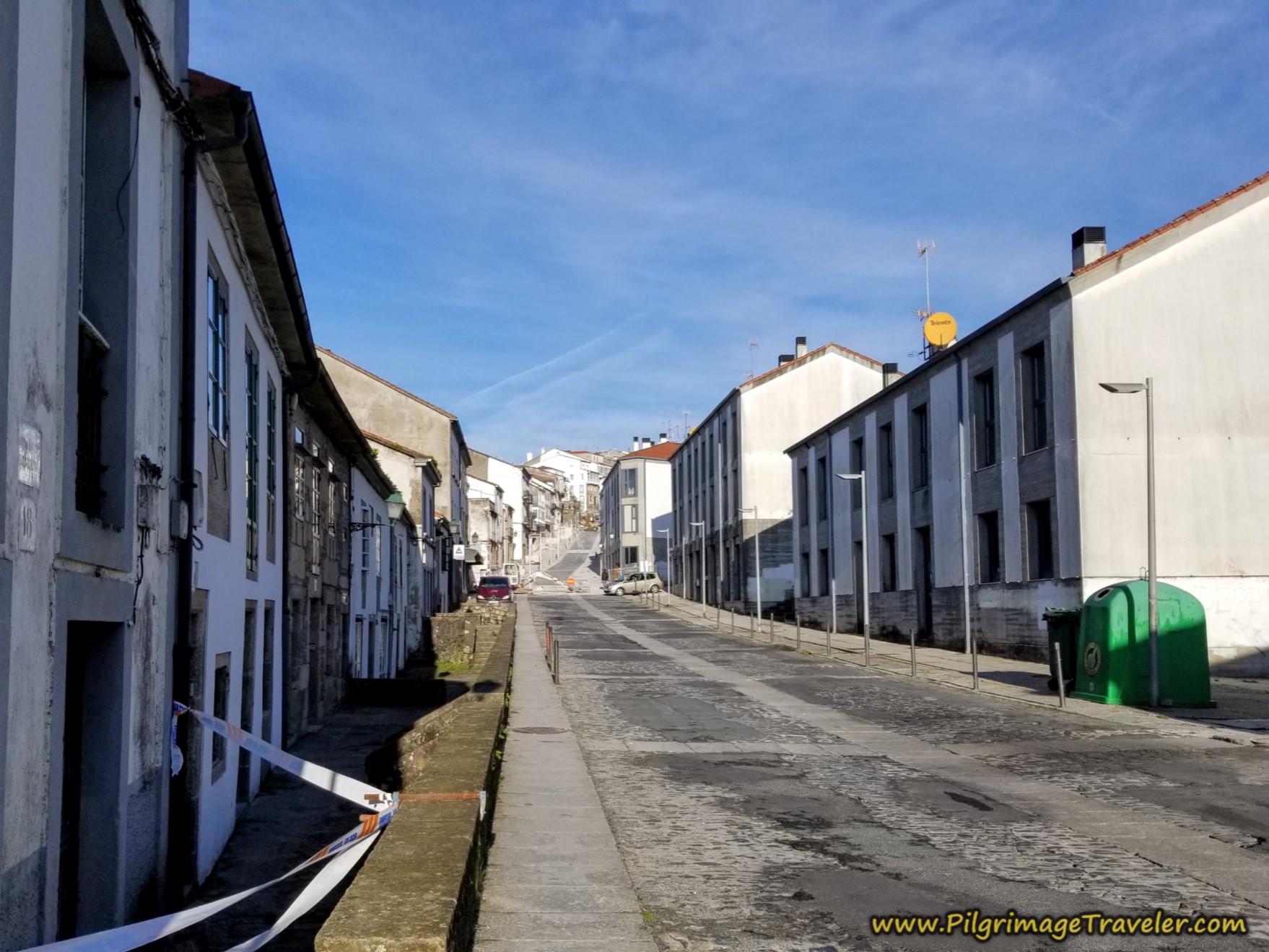 Along the Rúa do Castrón Douro
Along the Rúa do Castrón DouroAfter another 150 meters the street changes its name once again, to the Rúa do Patio de Madres! However, you keep on climbing up and now the old town is a mere block away.
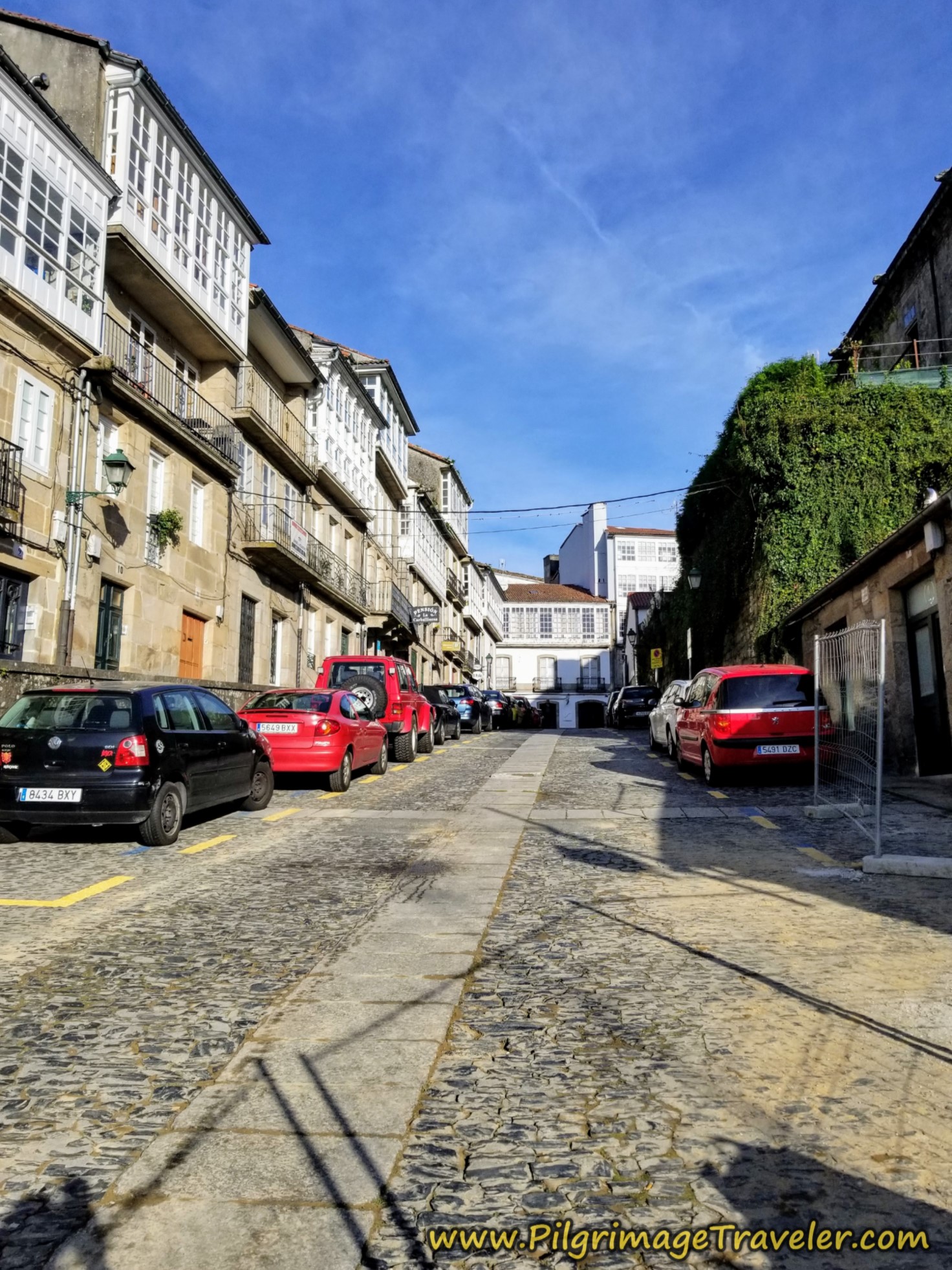 Climbing on the Rúa do Patio de Madres
Climbing on the Rúa do Patio de MadresOne block later, you come to an intersection, where the large and impressive Convento de Las Mercedarias Descalzas (not shown) is on your right. At the intersection, you will cross a major road that delineates the old town of Santiago, where the medieval city wall once stood. It is a circular road surrounding the old town.
Look for the small diagonal street across the busy crossroad. This is your passage, called the Rúa de Mazarelos.
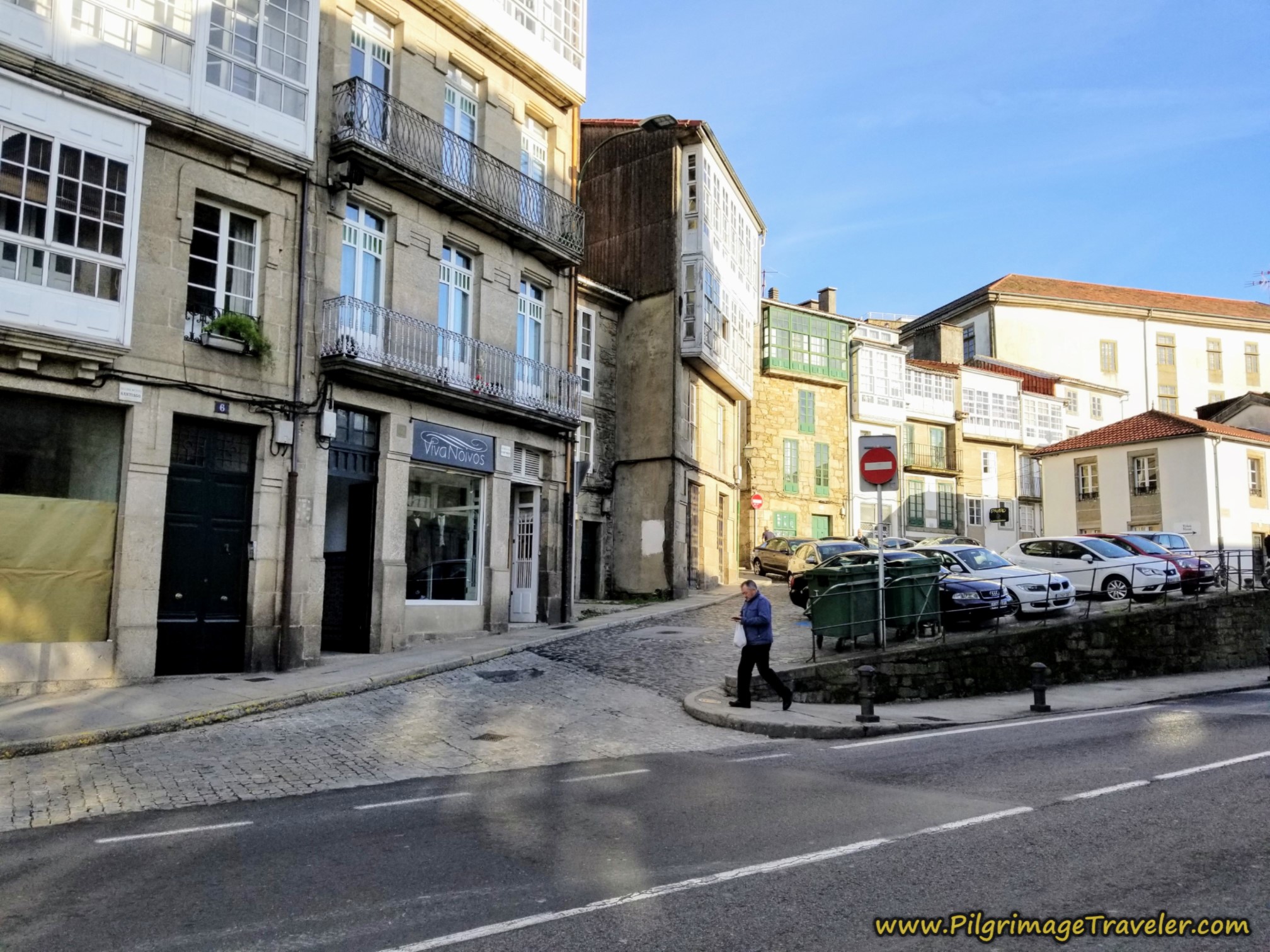 Crossover to the Rúa de Mazarelos
Crossover to the Rúa de MazarelosAs you make the bend in the road, a few meters later, you will see the Arco de Mazarelos. This was once one of the seven gates that led through the medieval wall and into the city. Congratulations! You have made it into the old town!
Continue onward, past the Praza de Mazarelos and the Praza de Universidade with its University buildings and the University Church.
Just after the University, you come to the next Praza de Entrepraciñas. Continue straight on and up the hill. Pass the statue of Alfonso II, the Chaste in the plaza. Pause to admire the statue because it is significant.
This statue depicts the ruler credited with starting the pilgrimage to Santiago in the 9th century when he established the Camino Primitivo or the "Original Way." He also became the protector of the Camino, establishing knights to guard the pilgrims and hospitals to care for them.
There is an identical statue of Alfonso II in Oviedo, by the cathedral at the start of the Camino Primitivo. Oviedo was the capital city at the time. It is an impressive image.
After the statue, continue along the Rúa do Castro. You can see the narrow cobblestone streets, so typical of the medieval towns.
After only about 50 meters, come to the first intersection with the Rúa de Xelmírez, shown below. Turn left.
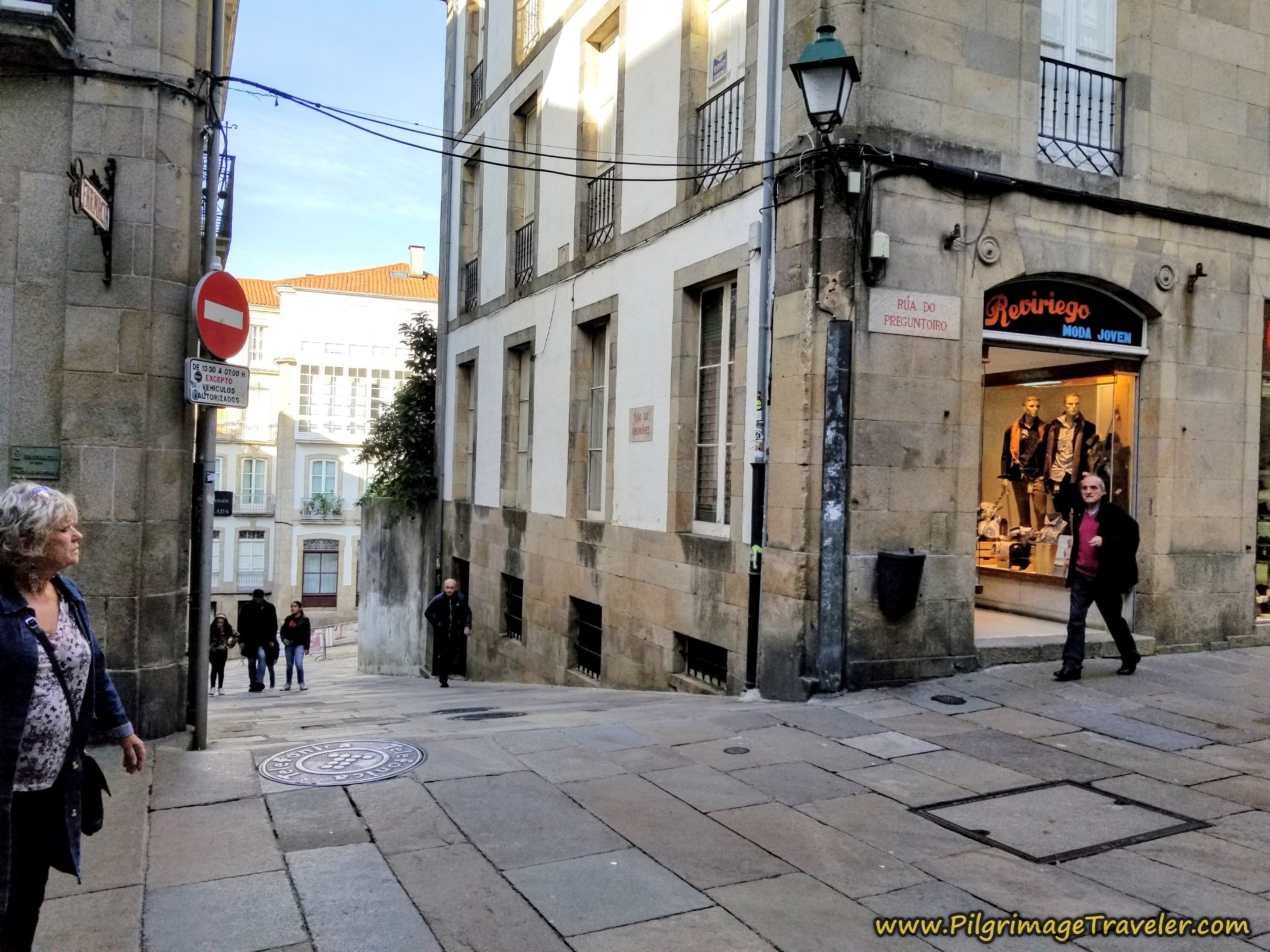 Turn Left Onto the Rúa de Xelmírez
Turn Left Onto the Rúa de XelmírezYou will now walk down the hill in your final steps to the cathedral! After a few meters, stay to the left here, continuing down the hill and along the Rúa de Xelmírez.
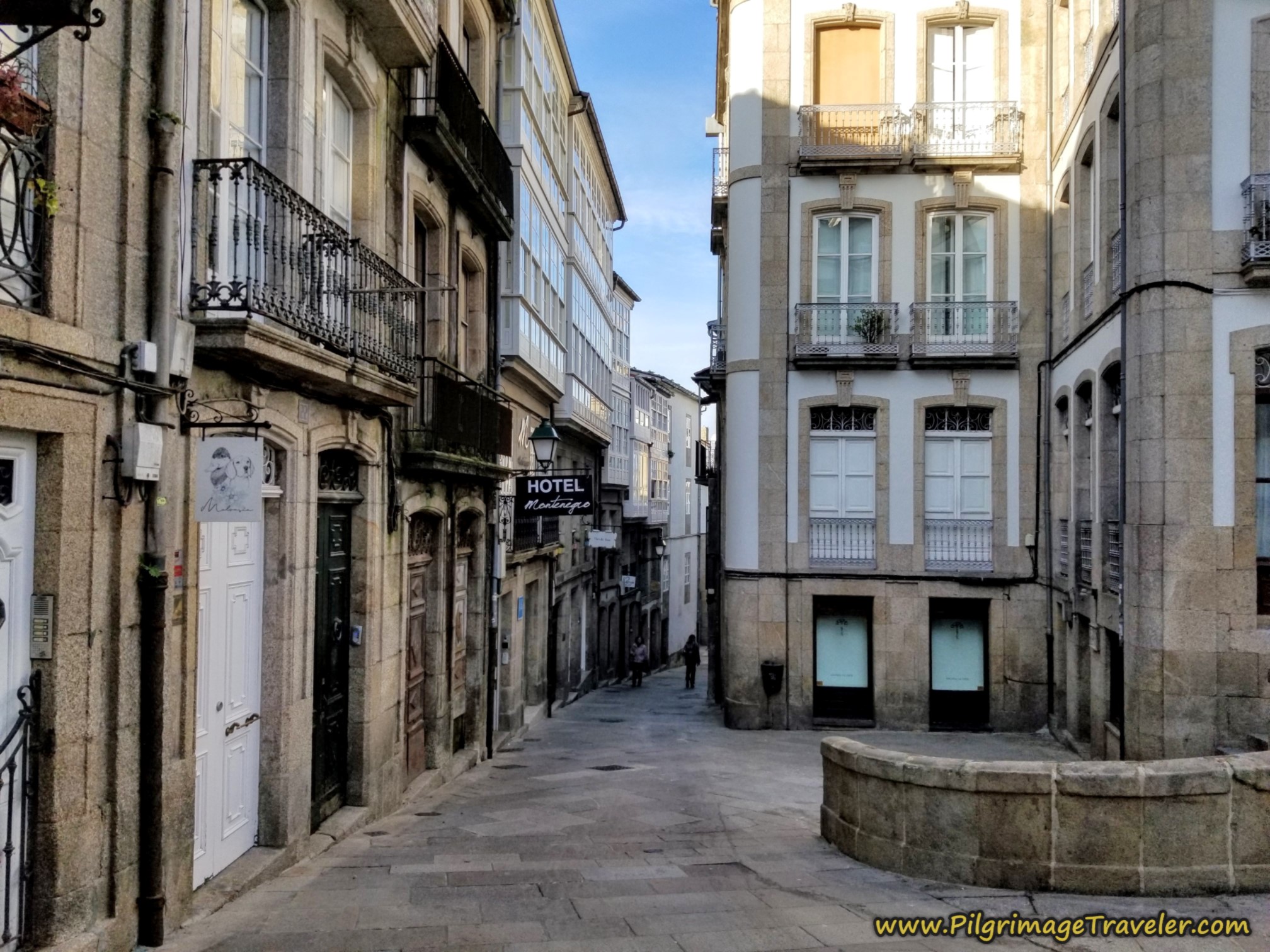 Stay Left Here, Along the Rúa de Xelmírez
Stay Left Here, Along the Rúa de XelmírezAfter about 150 meters, you come to the cathedral and pass by the fountain, the Fonte dos Cabalos and the southern entrance to the cathedral at the Praza de Platerías. This is not your destination!
Walk on by this side of the cathedral, on the now Rúa de Fonseca, for another 50 meters, and round the corner at the next right! You have now entered the famous Obradoiro Square! The main façade of the cathedral looms before you!
We were very lucky to be here by exactly 11 in the morning when it was not yet super busy with pilgrims and tourists. The church bells were chiming for us as we walked in! Nadine and Norm greeted us as we were walking into the square for a joyful reunion.
Here is the classic pose of us in front of the cathedral. We had done it! We had walked all the Way from Ávila on the Camino Teresiano first, then the Vía de la Plata from Salamanca where Norm and Nadine joined us, and finally from Granja de Moreruela, via the Camino Sanabrés, just shy of 600 kilometers. It was a great custom Camino!
I got to see Nadine with her crutches for the first time. Oh my, the truth of the severity of her injury hit home as I watched her try to walk. Later that day, when the sun was higher, we took their picture in front of the cathedral.
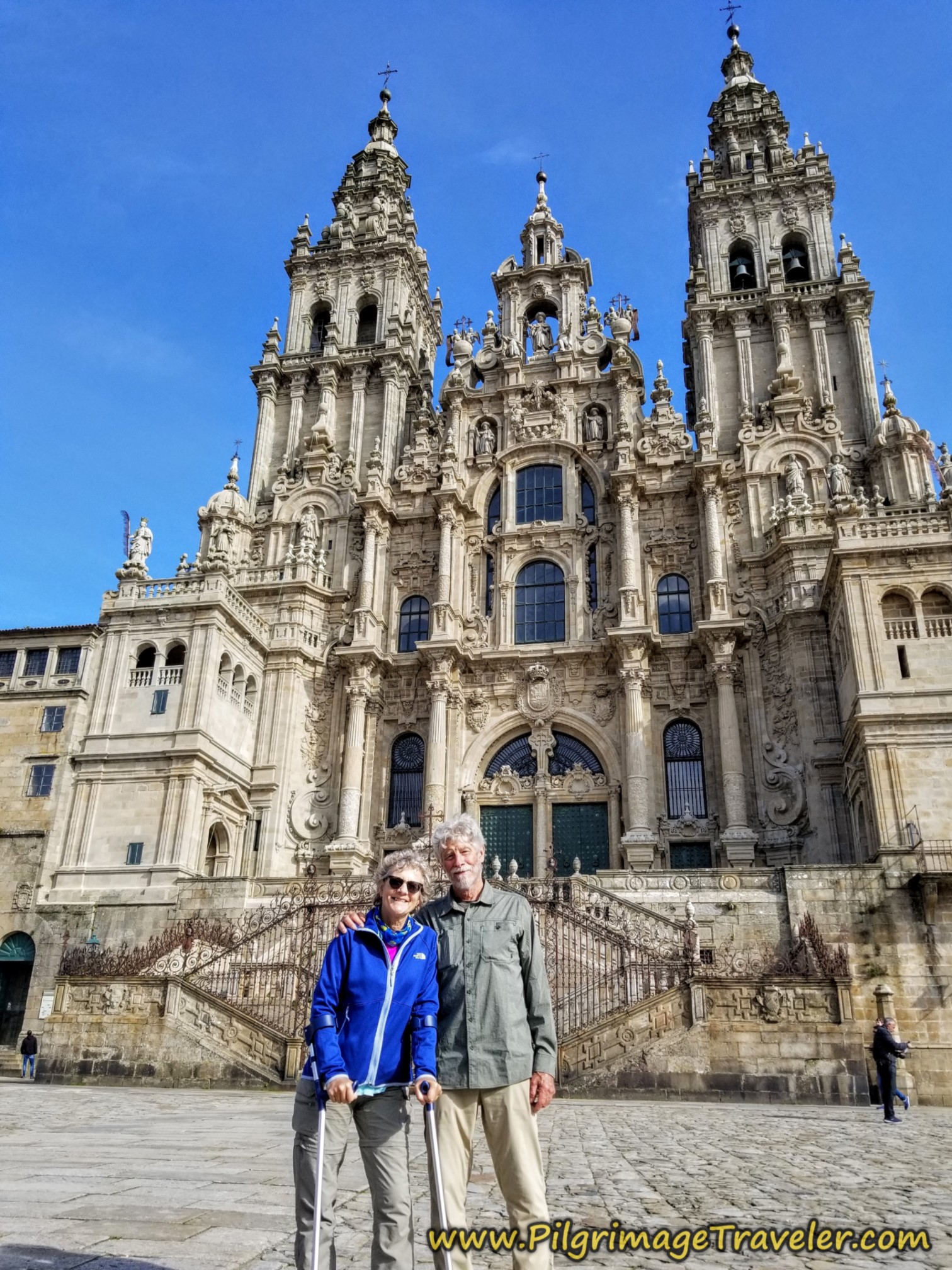 Nadine and Norm, Catedral de Santiago de Compostela
Nadine and Norm, Catedral de Santiago de CompostelaJump to Camino Sanabrés Stages
Accommodations in Santiago
This Camino, we checked into and stayed at the Pensión Residencia Fornos. It is an adequate, clean and economical place, right on the Praza de Galicia, most convenient if you plan to bus to the Santiago airport later. It is, however, a few steps outside of the old town, if that matters to you.
We have also stayed at the wonderful, historic, former monastery of the Hospedería de San Martín Pinario, (+34 981 56 02 82), right across from the cathedral. It is a bit pricey, but well worth it. Be sure to call to get the special pilgrim price. It is not available online. Or you can try the link for booking if you have no success.
There are many accommodations available in the city of Santiago de Compostela. We usually prefer to stay in a hotel once we arrive in Santiago, and have stayed in the Casa Celsa - Barbantes, the Pensión Pazo de Agra, and the Hotel Entrecercas. They are all comfortable, clean and economical. You never know who will have the best deal at any given time, so I recommend searching on booking.com for current prices.
There are also many albergues in the city, two right along the French Way just before the cathedral, the Albergue The Last Stamp, +34 981 563 525, and the Albergue Azabache. In addition, to the north of the cathedral there is the Blanco Albergue, the Albergue Santiago KmO, and the Albergue Alda O Fogar de Teodomiro. There is the huge Albergue Seminario Menor on the southeast side of town, and farther south by the train station is the Albergue la Estación. Finally, on the west side of town is the Mundoalbergue.
It may be prudent to book ahead in Santiago, especially during holidays and peak summer months.
Reflections on Day Seventeen of the Camino Sanabrés, A Susana to Santiago de Compostela
While our final 10k walk into Santiago was without a glitch, our reunion with our friends in Santiago was bitter sweet. Nadine, on crutches, was not herself. Her disappointment and frustration that she had not completed her physical pilgrimage in Santiago was palpable. She had made it over 400 kilometers, but not the final 50. Oh my! This was indeed a tragedy for her.
Because of our many pilgrimages to Santiago, Rich and I would not have stood in line at the pilgrim's office for yet another Compostela. However, we had already decided that we would stand in line and get one for Norm and Nadine.
We excused ourselves from our reunion in Obradoiro Square, to go to the pilgrim's office. As we were in line, suddenly Nadine came hobbling in to join us. I will never forget her fury, as she complained to me how bitter she was that she could not get a Compostela. She had walked well over 400 kilometers from Salamanca and felt she deserved something. I had never seen her like this before.
I was numb as I just stated, "I clearly understand your frustration and bitterness." I knew she would be dealing with her anger and her grief for many weeks to come.
But alas, the rules were the rules (at that time), and without doing the final 100 kilometers, the pilgrim's office would not budge. She had inquired if she could get a certificate of kilometers completed, and they would not even do that.
In truth, I reminded her that her stamps on her credential were her own personal proof of her accomplishment. This was still a great achievement. However this did not placate her at that time, as her desire to complete the goal was so very great. My heart ached for her.
When we finally reached the desk at the pilgrim's office, I asked if I could have the Compostela placed in Nadine's name. They would not do it. I even had a pilgrim's office newbie, and she had to ask a more seasoned volunteer what to do. It was not like in the movie "The Way!"
All they would do is write Nadine's name at the bottom of my Compostela, with the words: Vicarie Pro. In Latin this means, "substitute." Rich did the same for Norm. It would have to do.
When Rich and I presented Norm and Nadine with their "Compostelas" later that evening at dinner, Norm was grateful and said that this was a very nice thing to do. However, Nadine's grief was too great and she acknowledged the gift with little fanfare. It was totally understandable.
As per Winston Churchill in the famous quote above, we now had entered the time, when it was clearly not the end. Nor the beginning of the end. Truly, for all of us and our relationships going forward, it was the end of the beginning.
We were now only entering a new phase of understanding the meaning of it all. This was certain. And the unfolding of the mysteries continues to this day. And so it is.
Salutation
May your own day seventeen on the Camino Sanabrés from A Susana to Santiago de Compostela be filled with many ends of your beginnings! Ultreia!
Camino Fonseca Stages
~ Vía de la Plata Stages from Salamanca
~ Camino Sanabrés Stages
Please Consider Showing Your Support
Many readers contact me, Elle, to thank me for all the time and care that I have spent creating this informative website. If you have been truly blessed by my efforts, have not purchased an eBook, yet wish to contribute, I am exeedingly grateful. Thank you!
Search This Website:
🙋♀️ Why Trust Us at the Pilgrimage Traveler?

We’re not a travel agency ~ we’re fellow pilgrims! (See About Us)
We've trekked Pilgrimage Routes Across Europe since 2014!
💬 We’ve:
- Gotten lost so you don’t have to. 😉
- Followed waymarks in the glowing sunlight, the pouring rain and by moonlight. ☀️🌧️🌙
- Slept in albergues, hostels & casa rurals. Ate and drank in cafés along the way. 🛌 😴
- Created comprehensive and downloadable GPS maps and eBook Guides, full of must-have information based on real pilgrimage travels. 🧭 🗺️
- Shared our complete journeys, step by step to help YOU plan your ultimate pilgrimage and walk with your own Heart and Soul. 💙✨
Every detail is from our own experiences. Just fellow pilgrims sharing the Way. We have added a touch of spirituality, heartfelt insights and practical guidance from the road ~ offering a genuine connection to the spirit of pilgrimage. Tap into the wisdom of seasoned pilgrims!
Ultreia and Safe Pilgrimage Travels, Caminante! 💫 💚 🤍
Follow Me on Pinterest:
Find the Pilgrimage Traveler on Facebook:
Like / Share this page on Facebook:
***All Banners, Amazon, Roamless and Booking.com links on this website are affiliate links. As an Amazon associate and a Booking.com associate, the Pilgrimage Traveler website will earn from qualifying purchases when you click on these links, at no cost to you. We sincerely thank you as this is a pilgrim-supported website***
PS: Our eBook Guide books are of our own creation and we appreciate your purchase of those too!!
Shroud Yourself in Mystery, along the Via de Francesco!
Walk in the Footsteps of St. Francis, and Connect Deeply to the Saint and to Nature in the Marvelous Italian Countryside!
Need suggestions on what to pack for your next pilgrimage? Click Here or on the photo below!
Find the Best Hotel Deals Using This Tool!
Carbon Trekking Poles ~ My Favorites!
Carbon fiber construction (not aluminum) in a trekking pole makes them ultra lightweight. We like the Z-Pole style from Black Diamond so we can hide our poles in our pack from potential thieves before getting to our albergue! There are many to choose from! (See more of our gear recommendations! )
Gregory BackPack ~ My Favorite Brand
Do not forget your quick-dry microfiber towel!

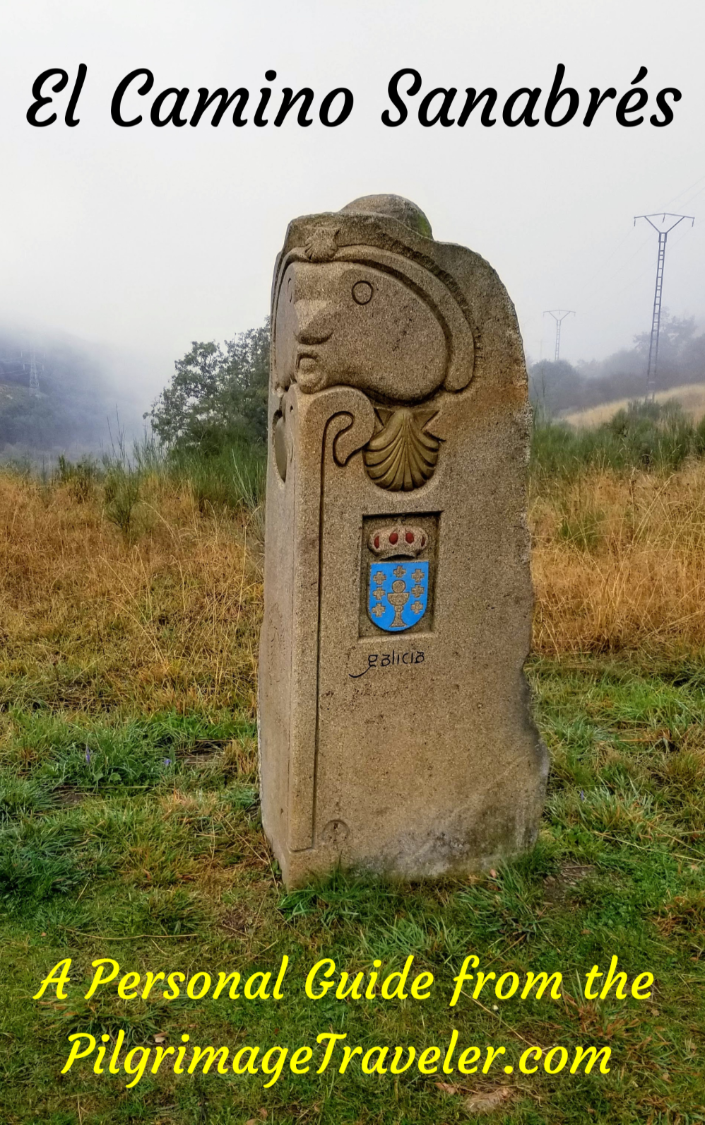
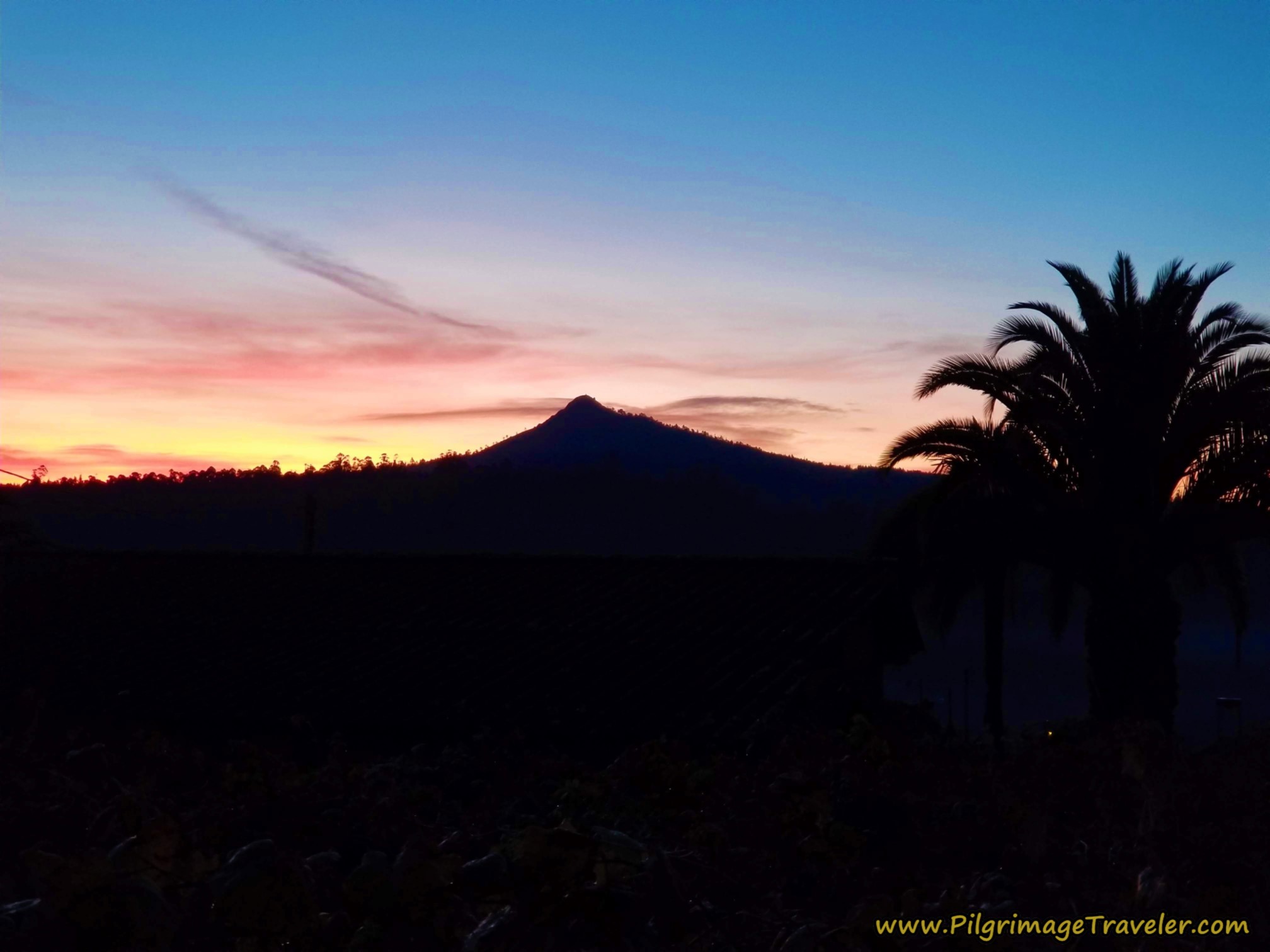
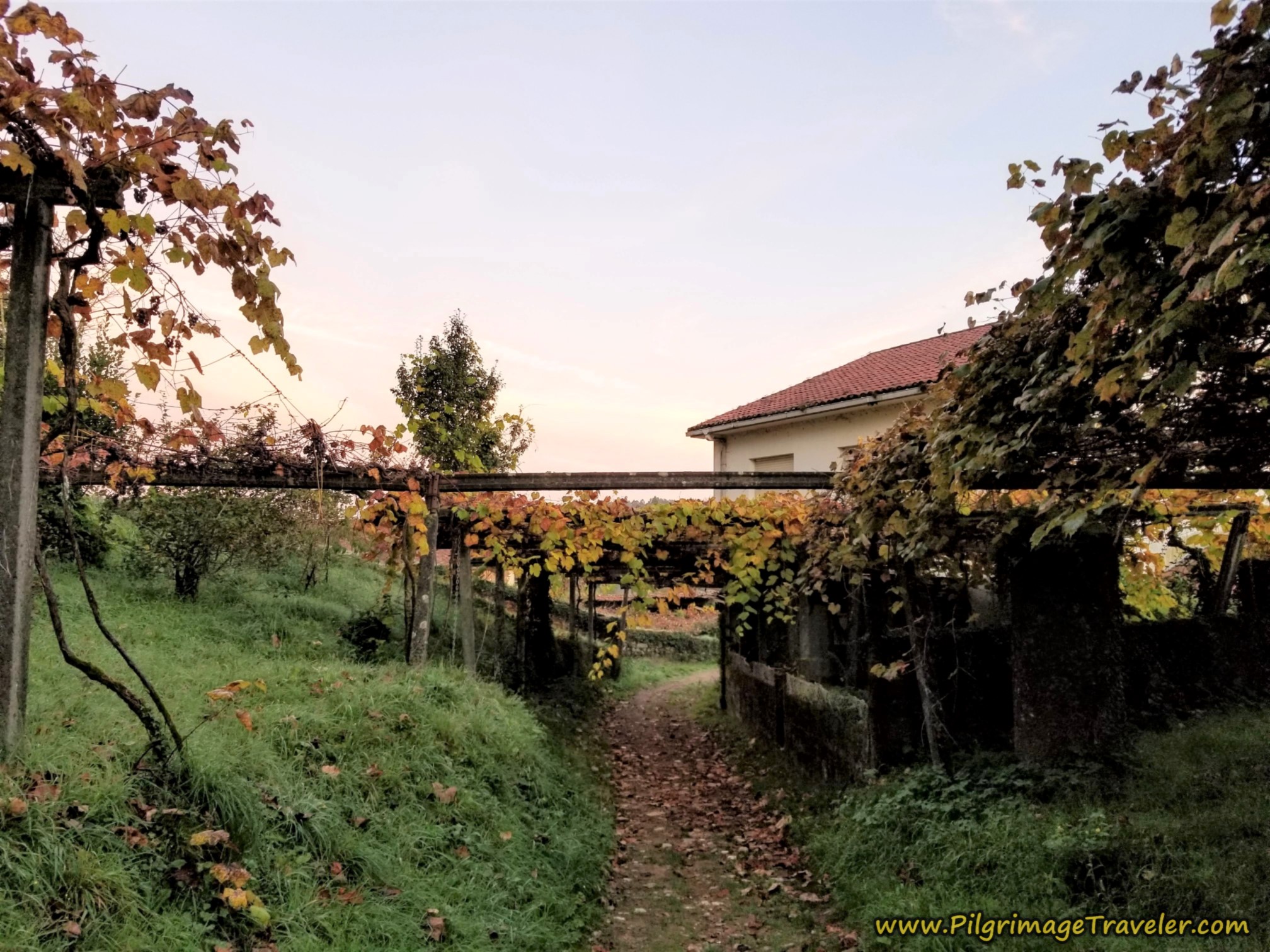
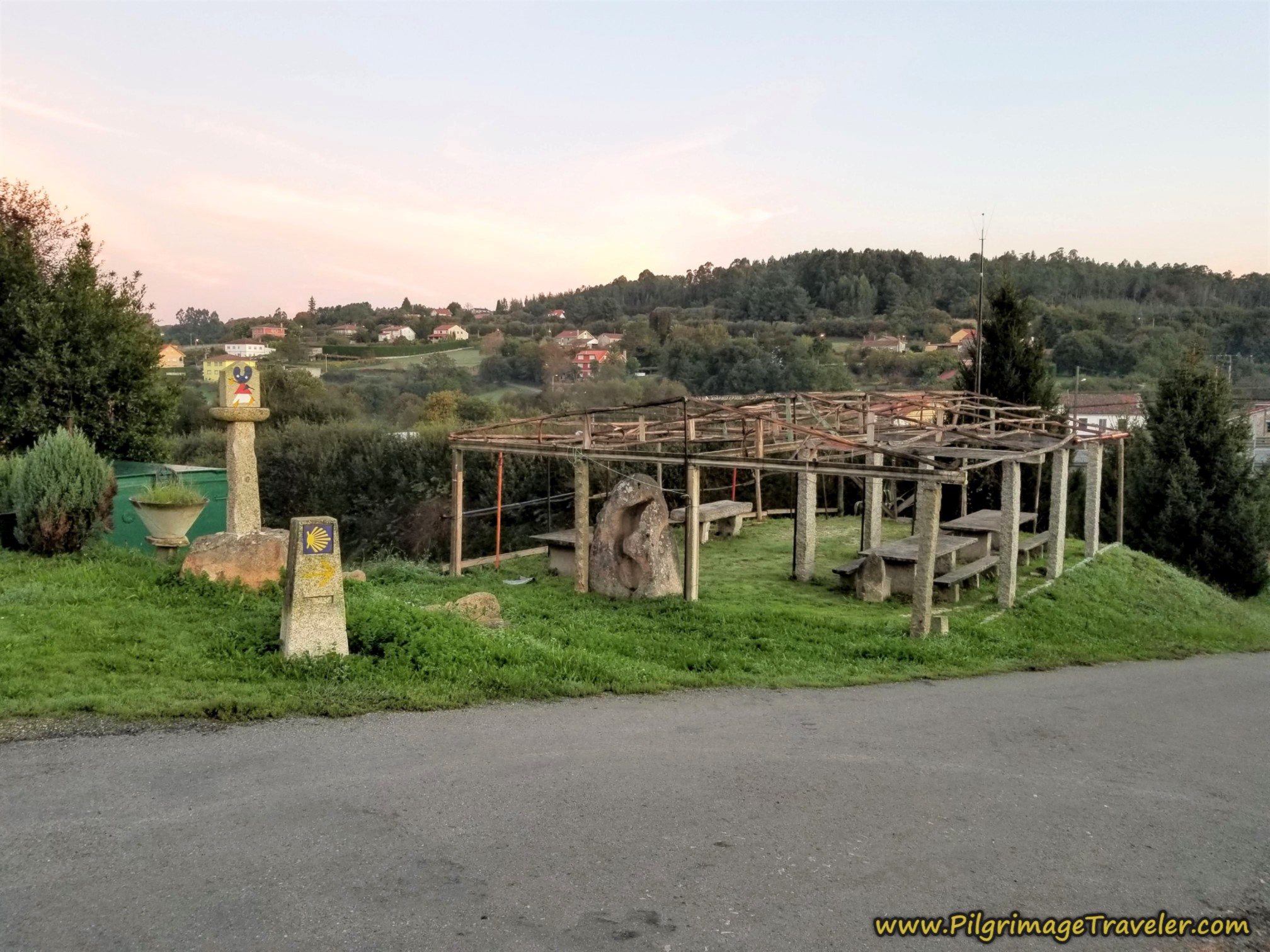
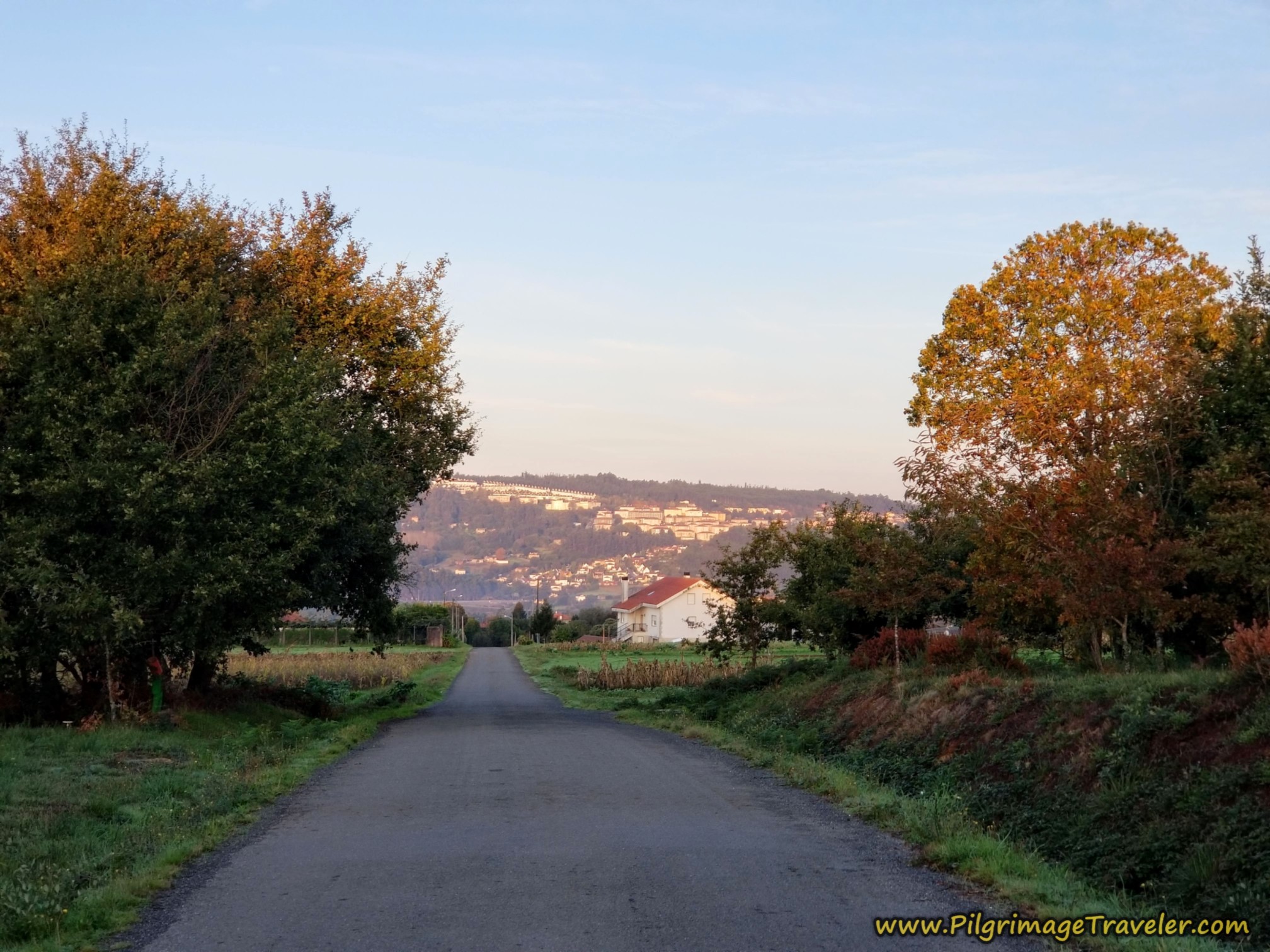
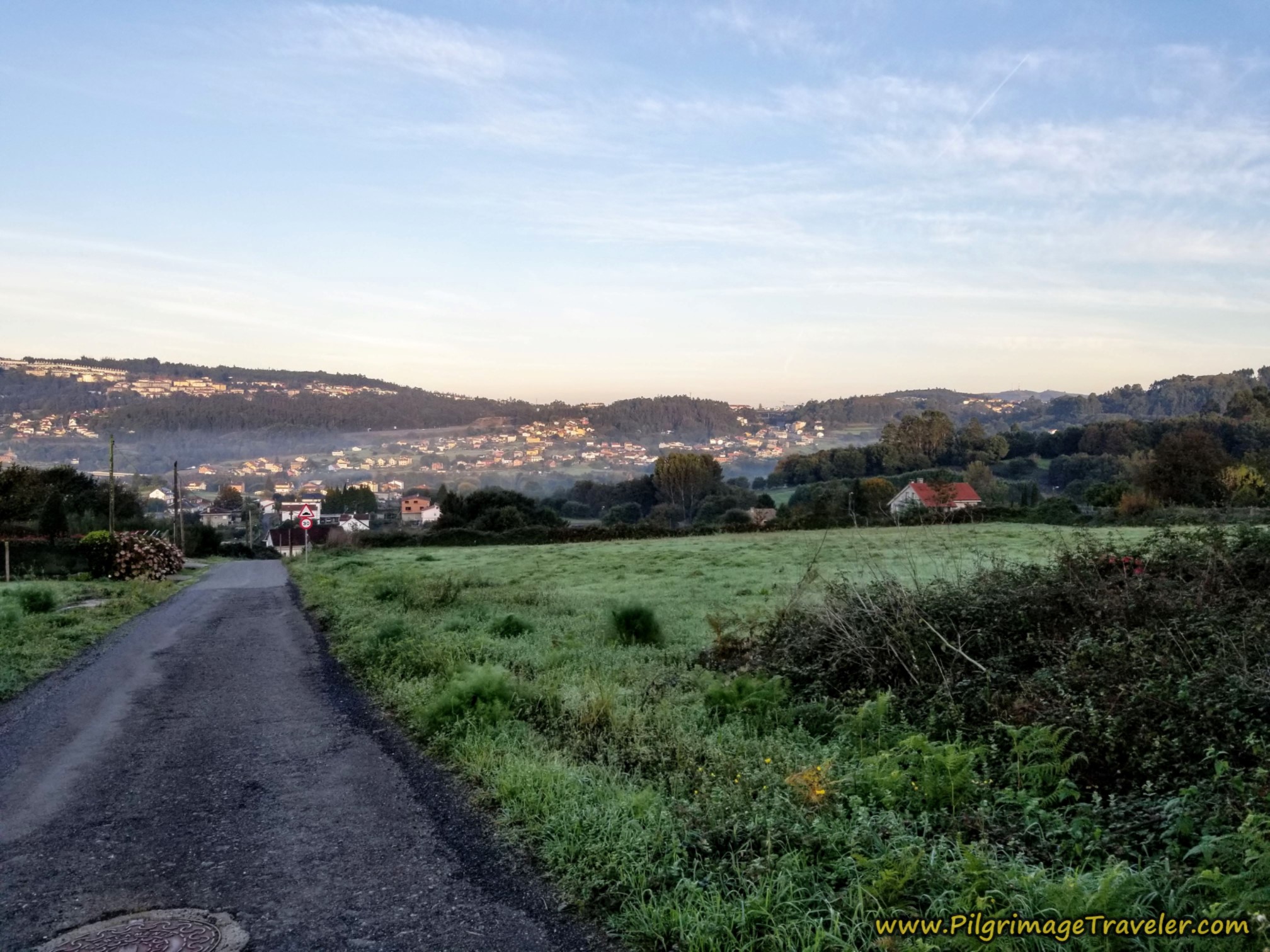

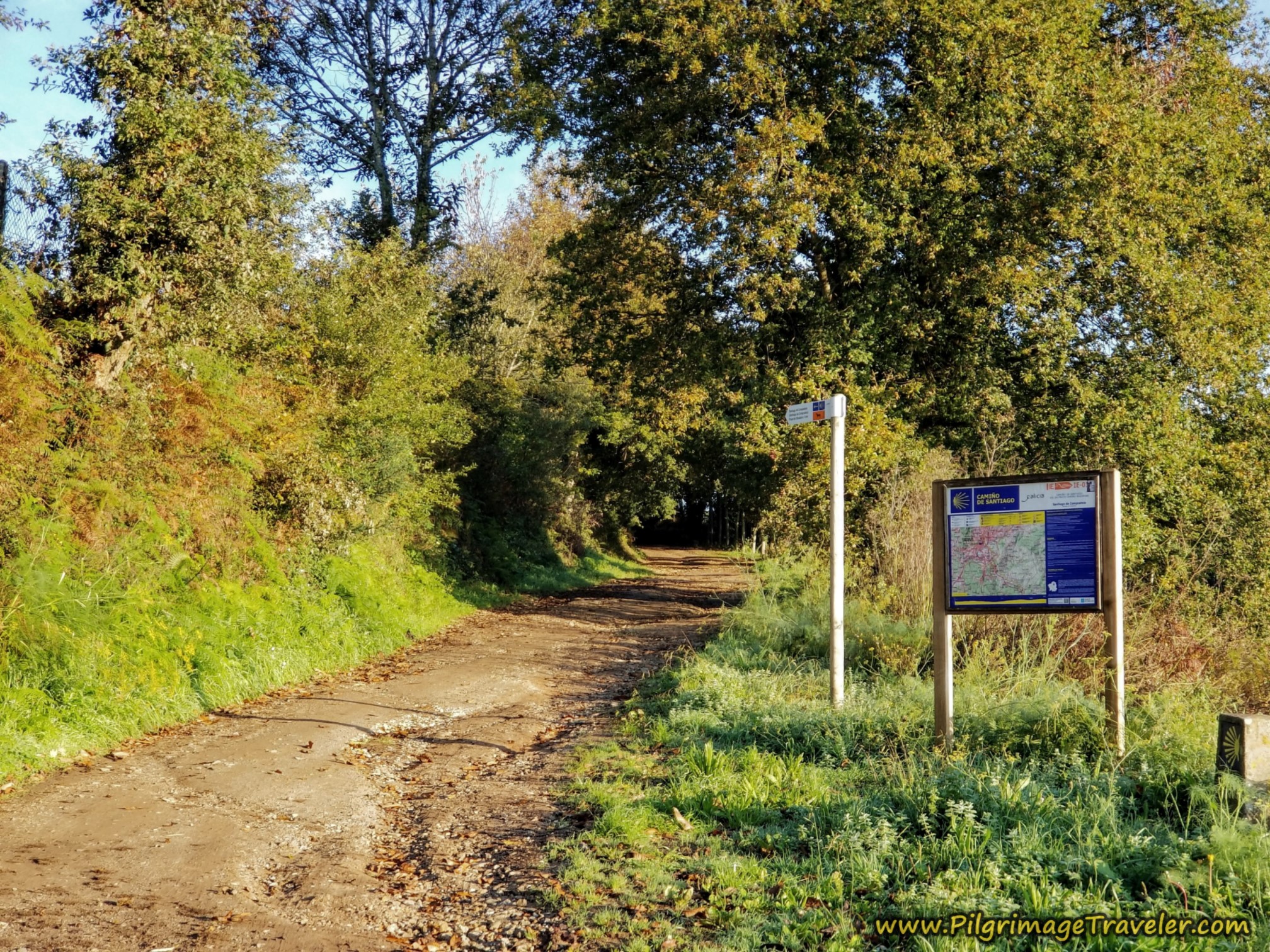
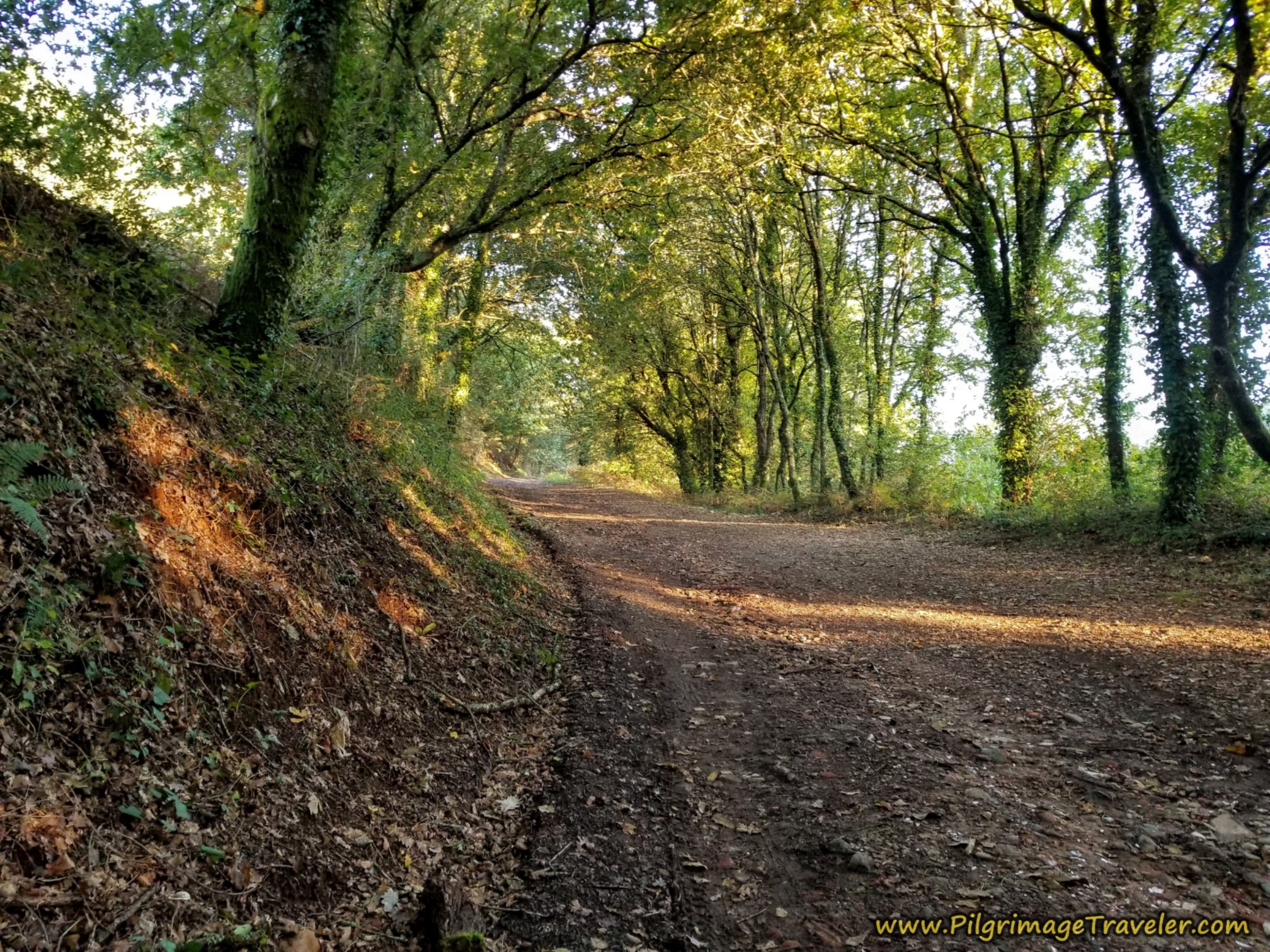
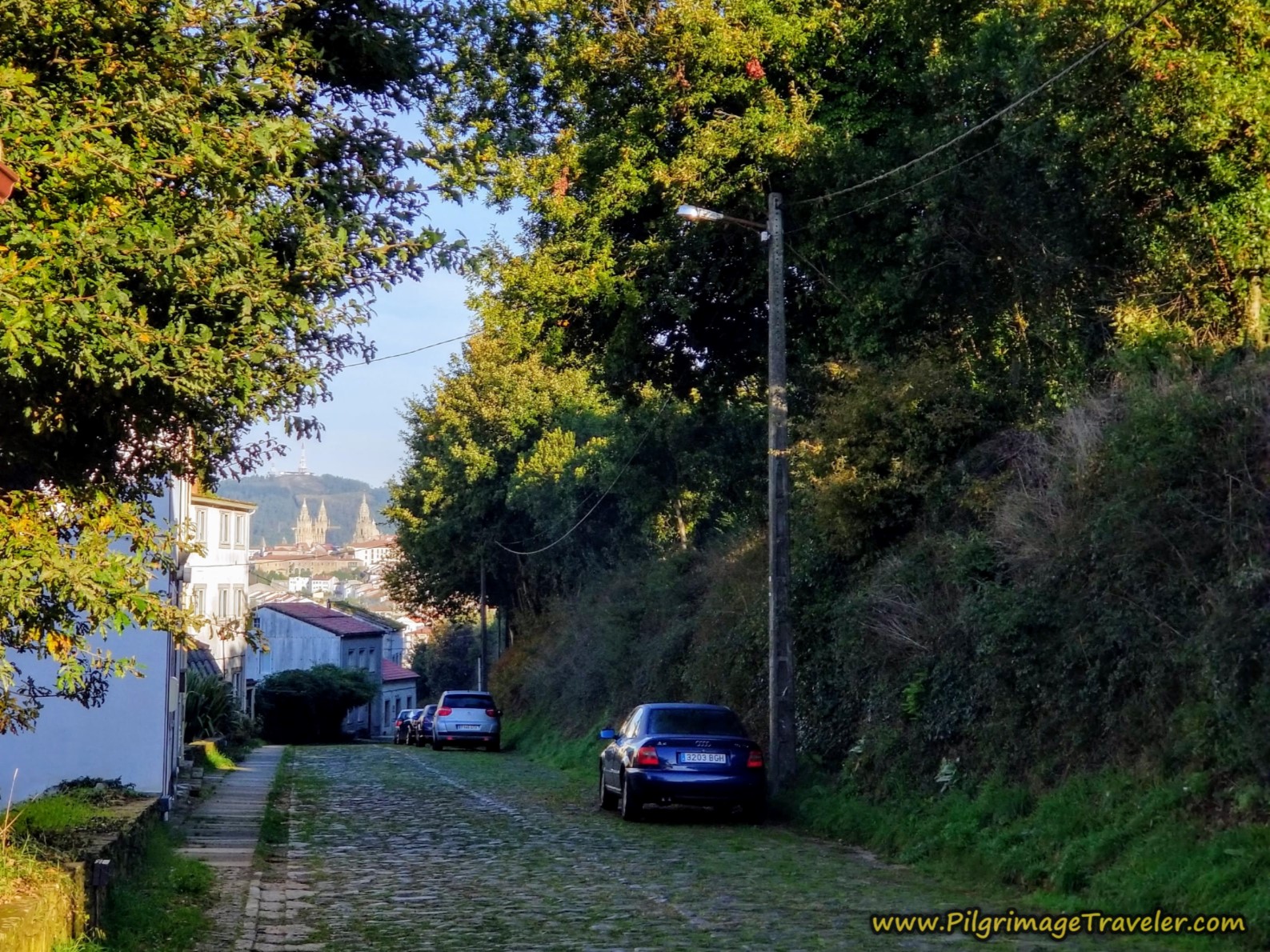
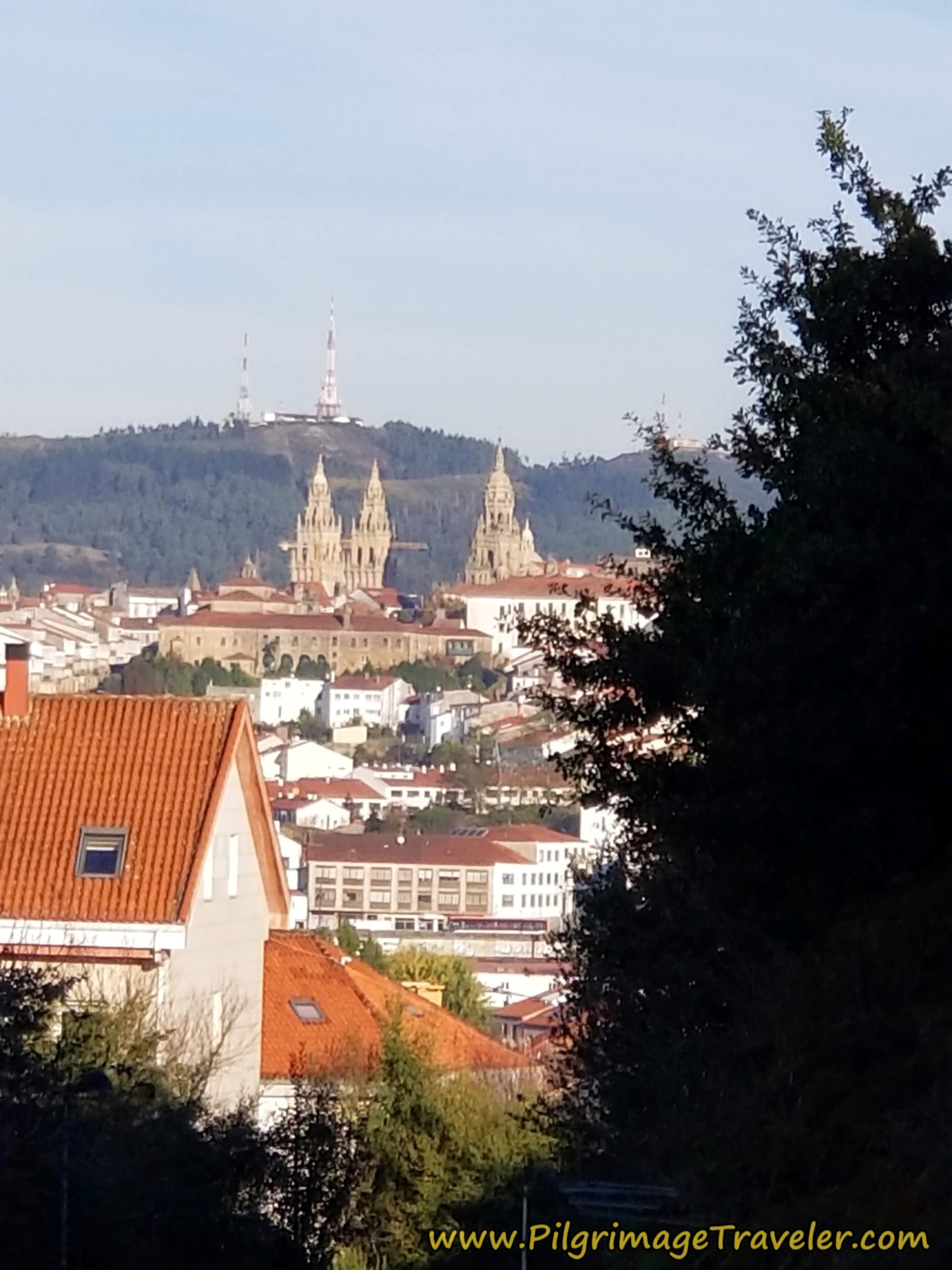
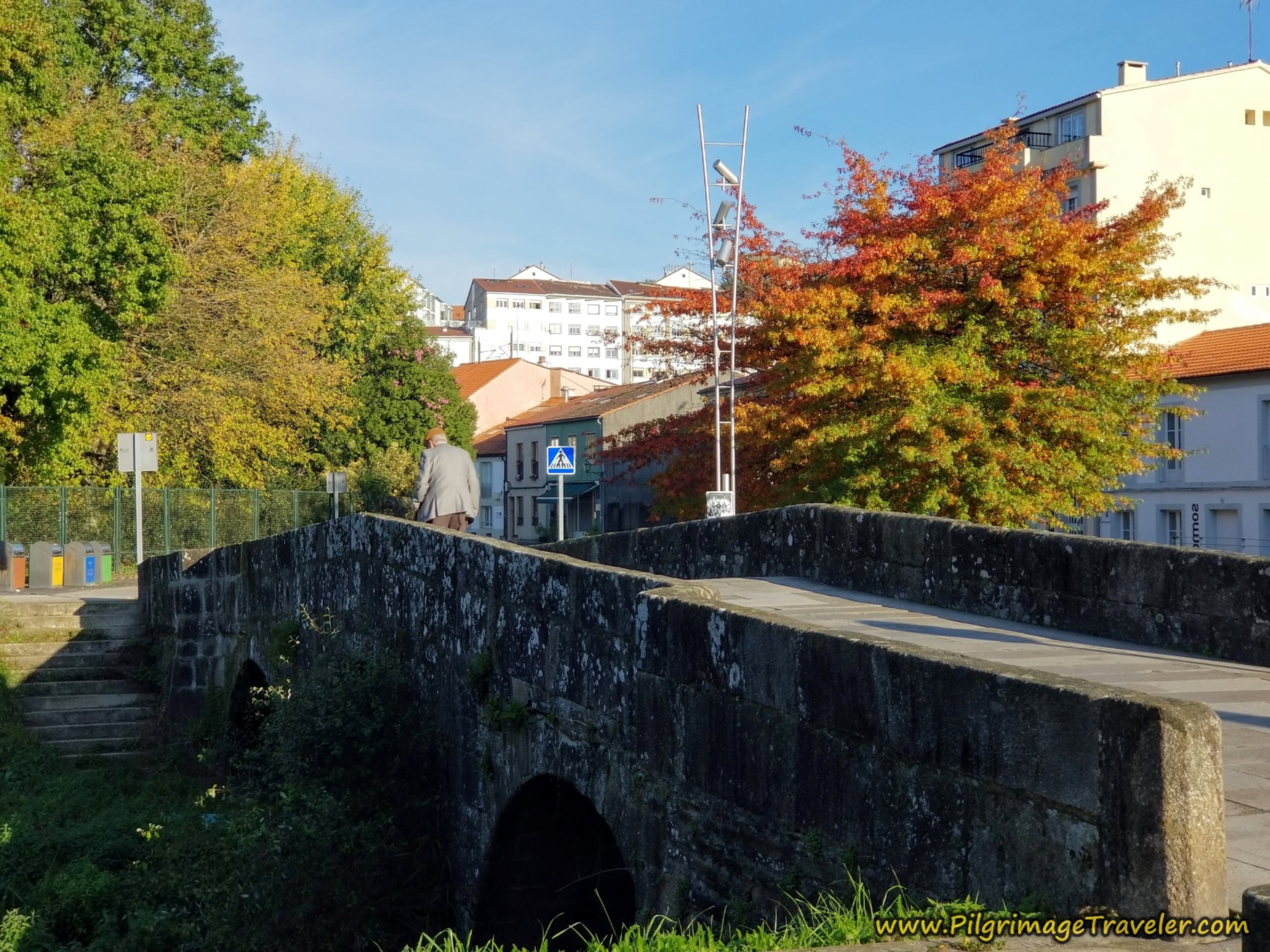
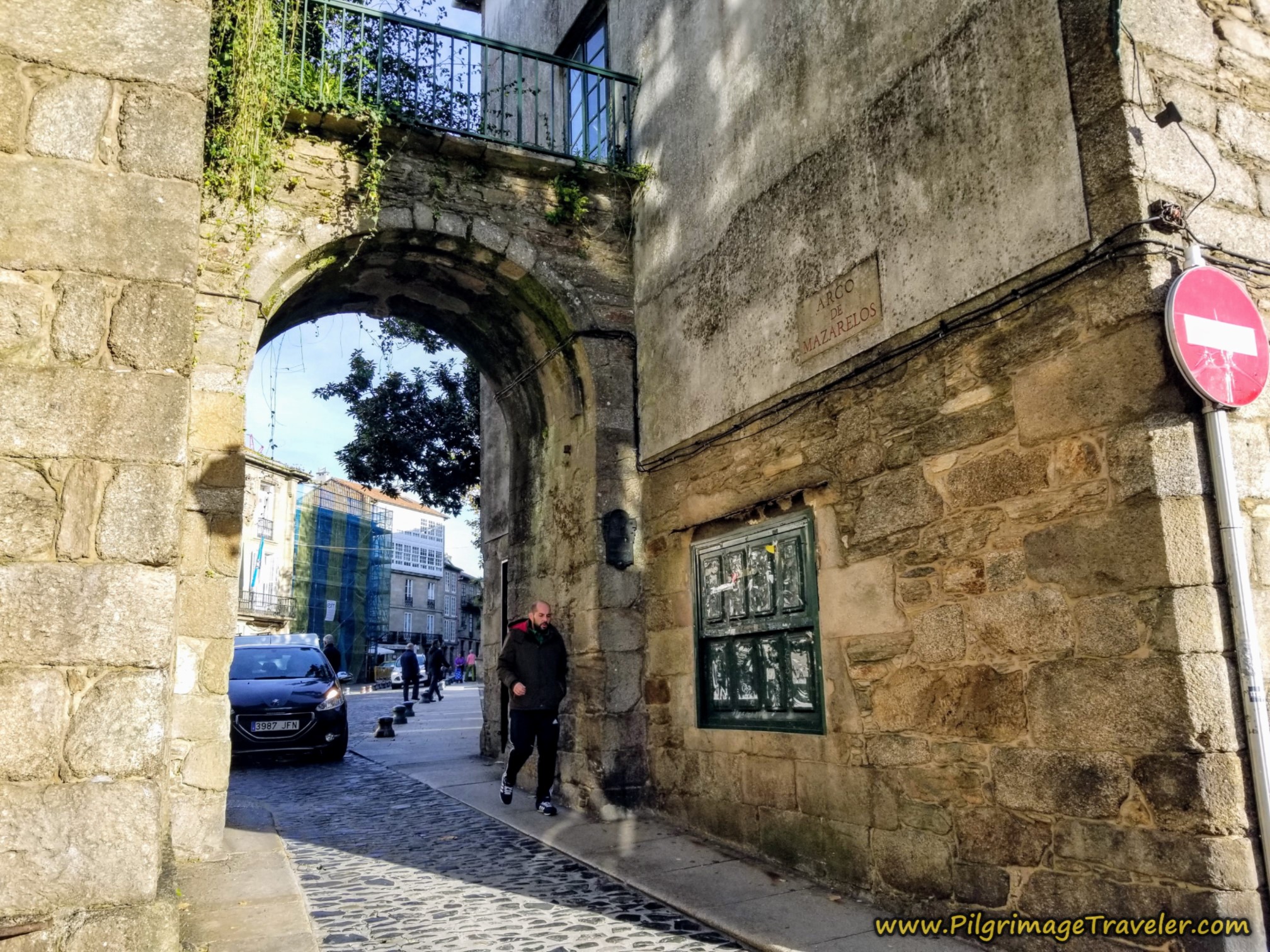
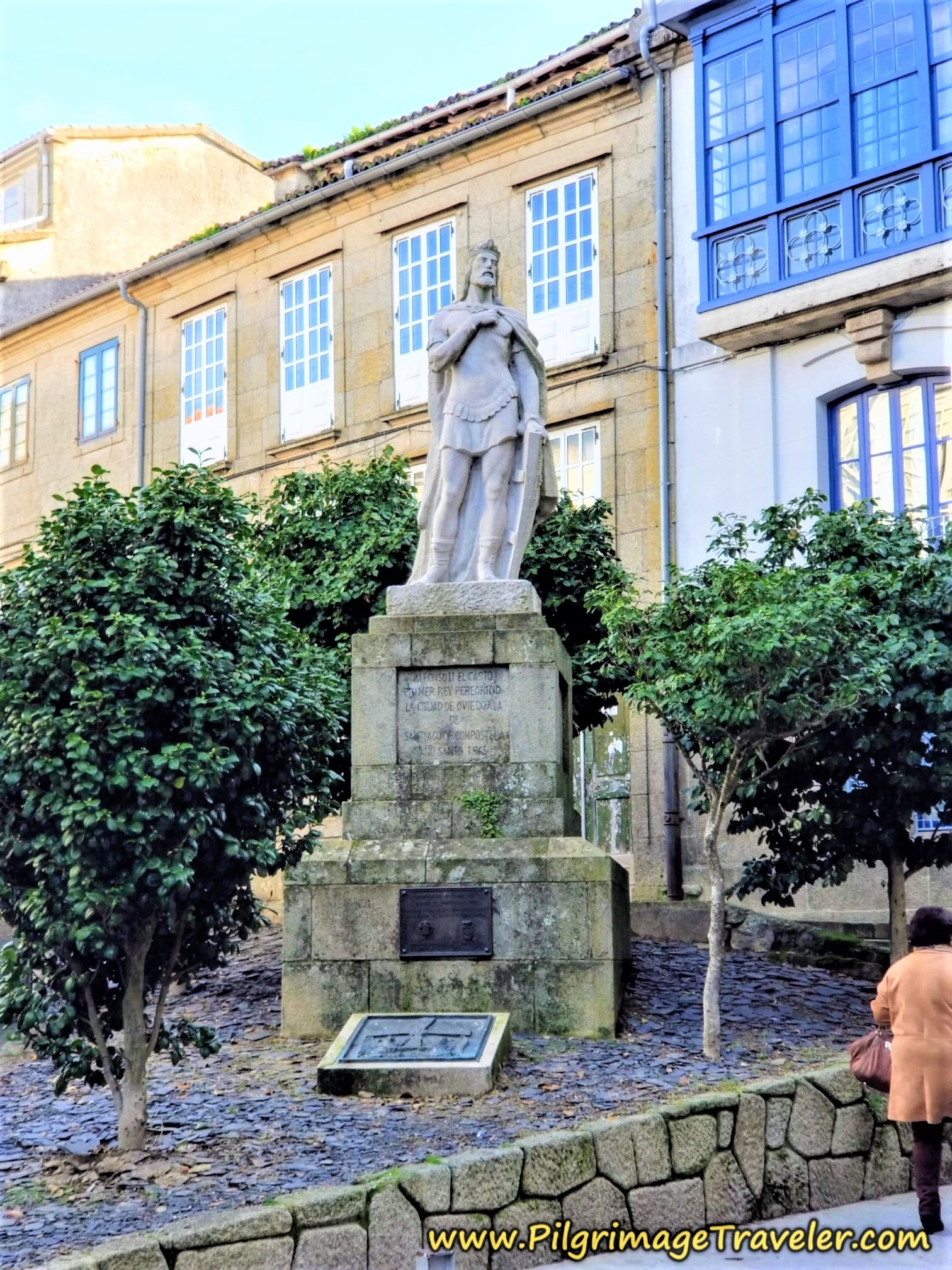
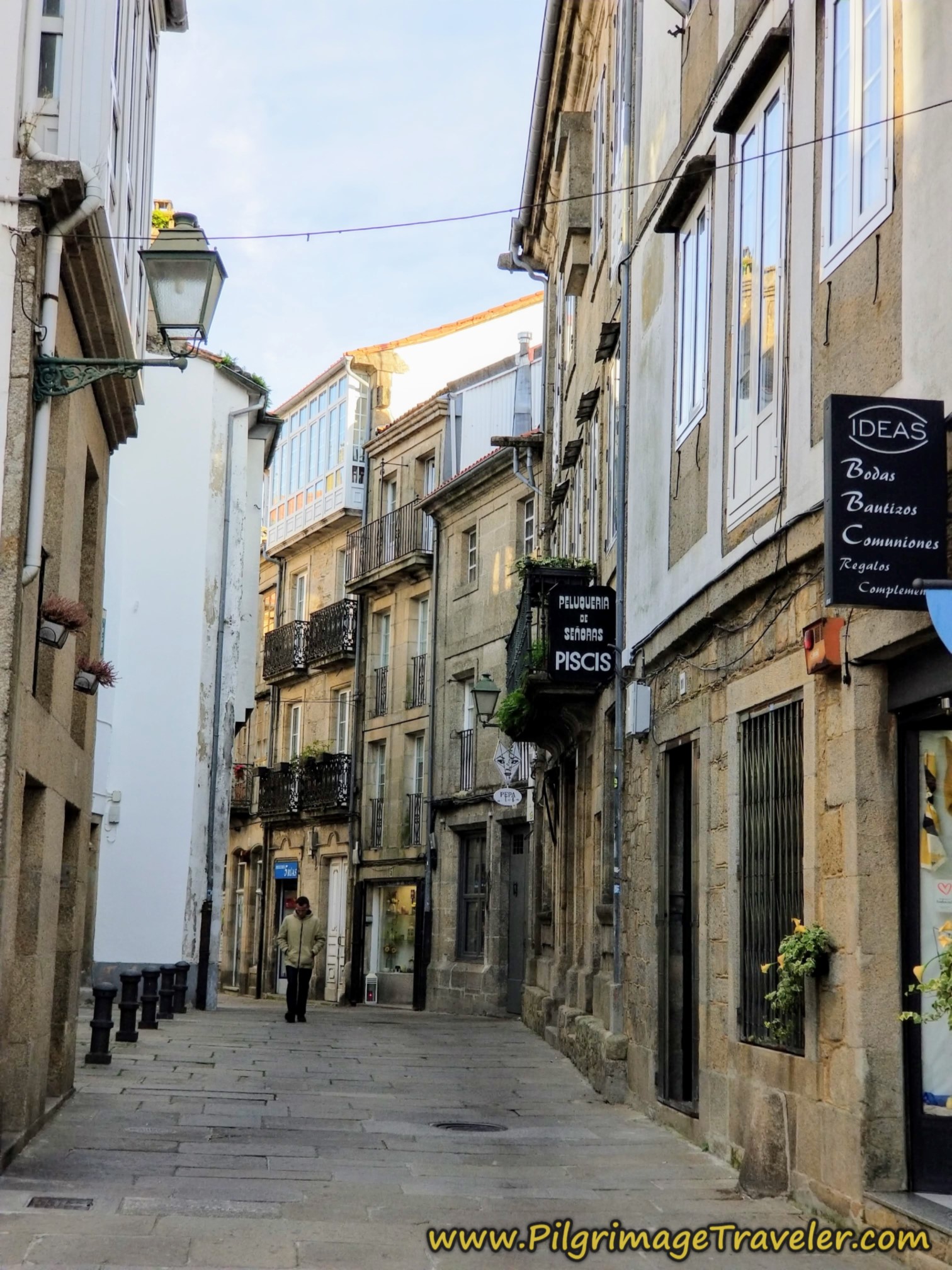

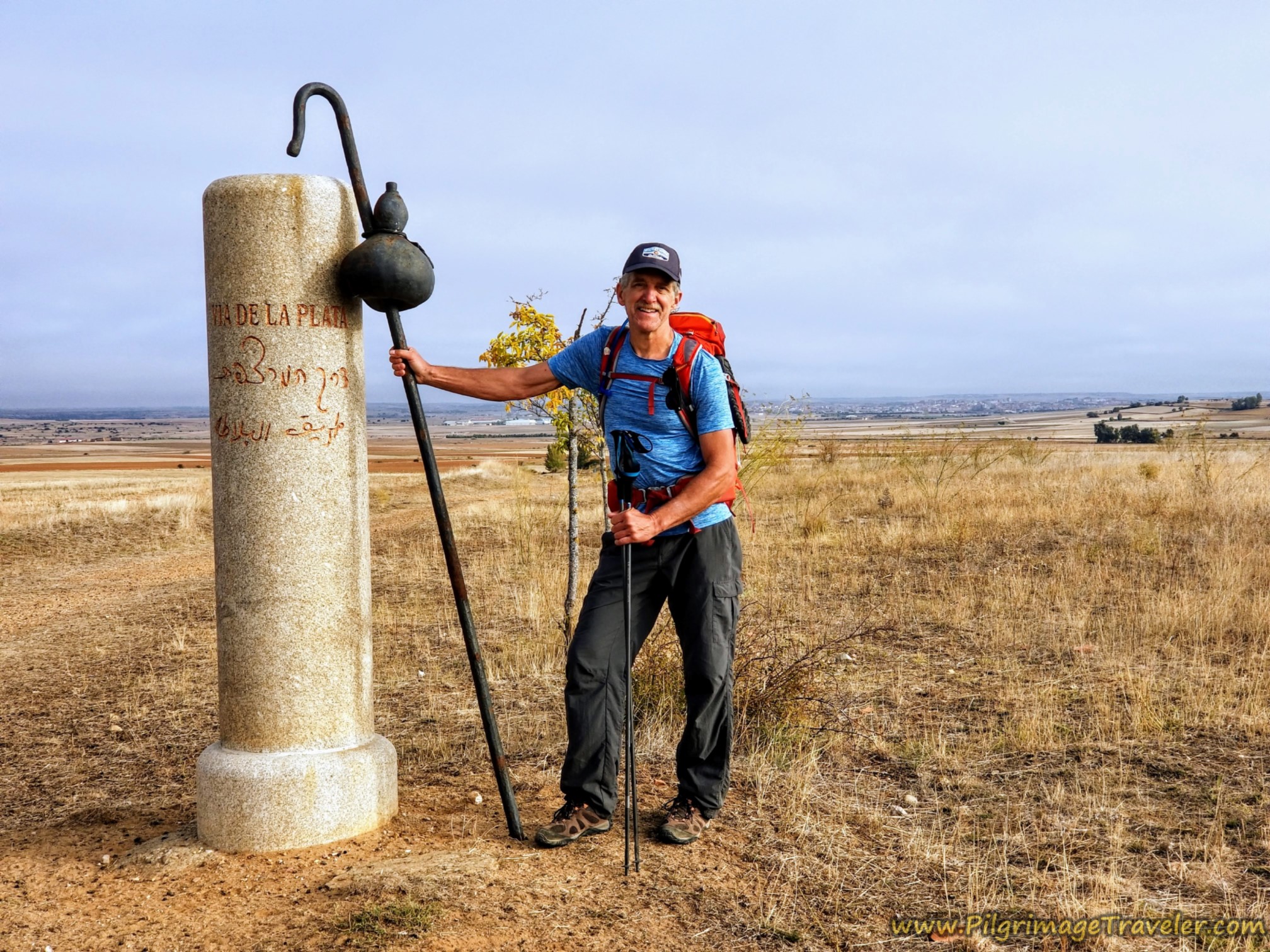
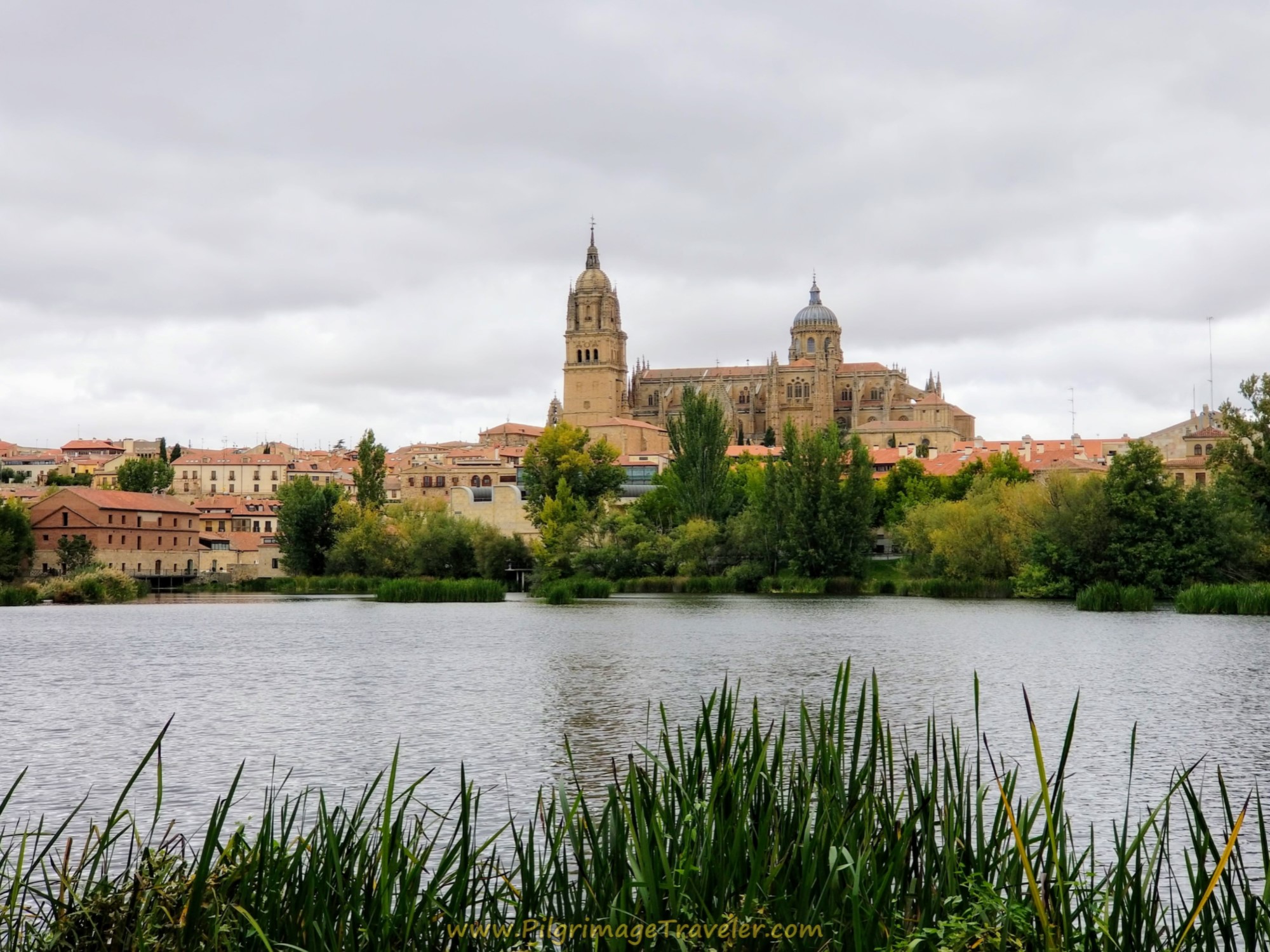
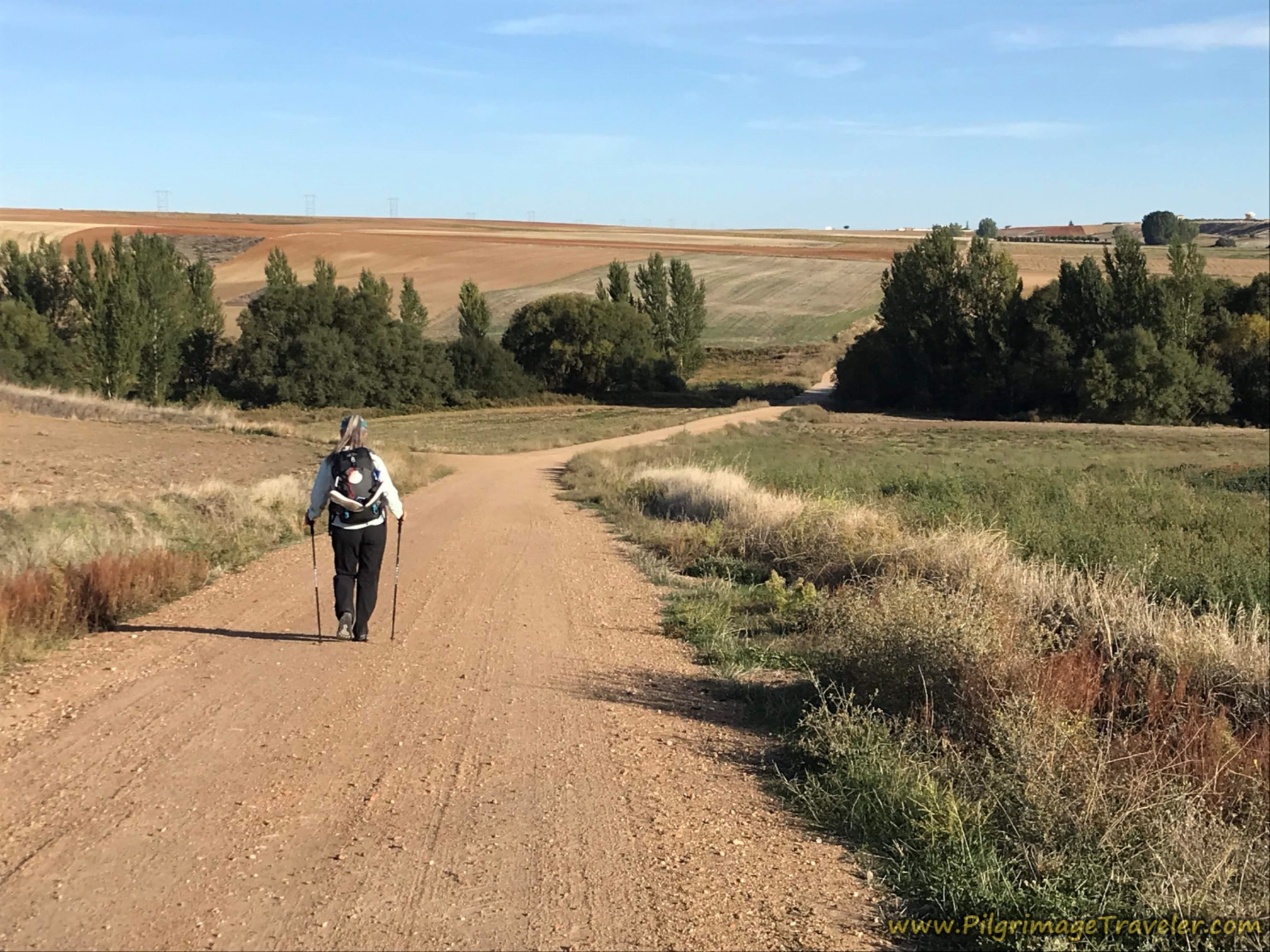
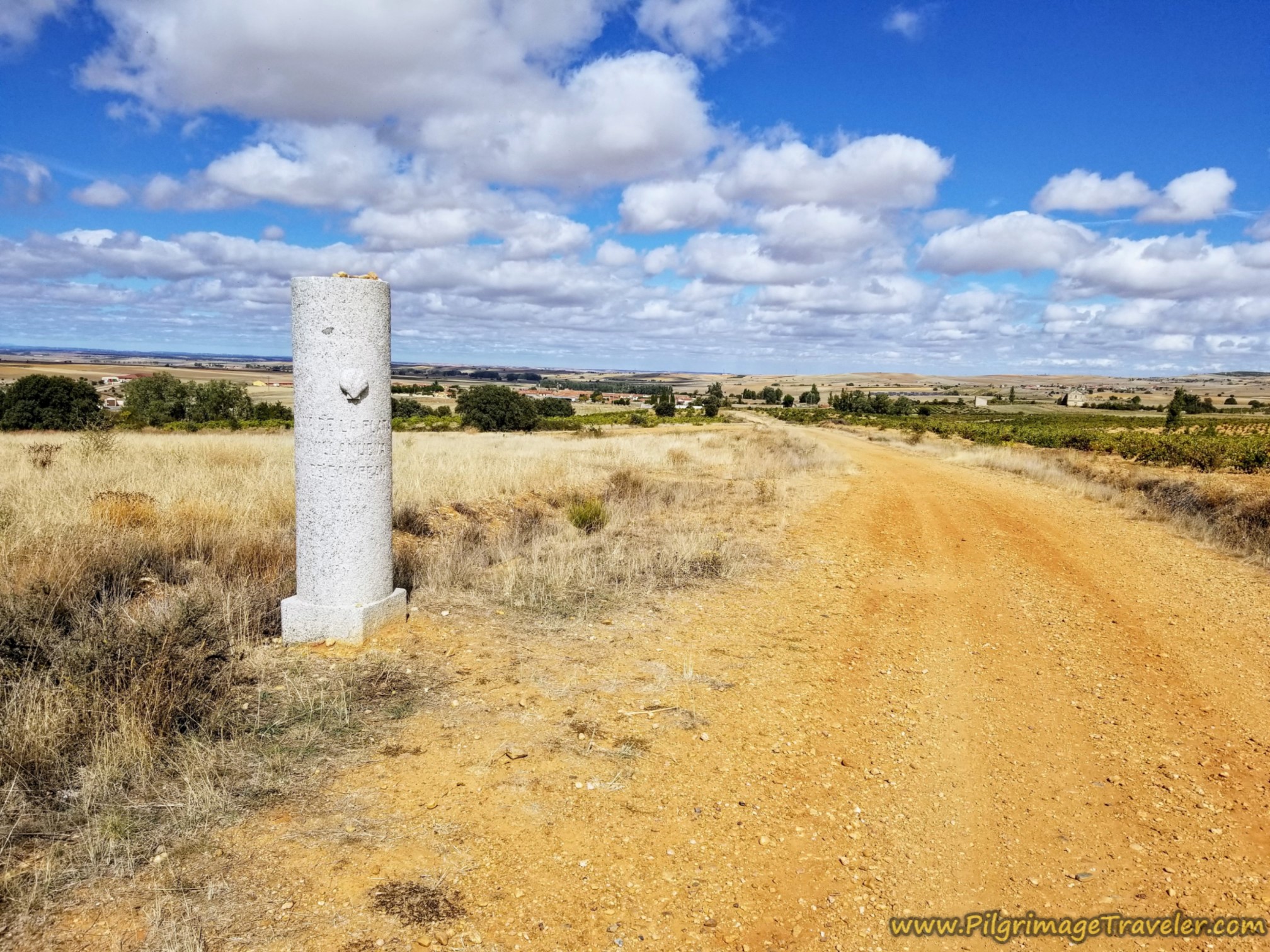
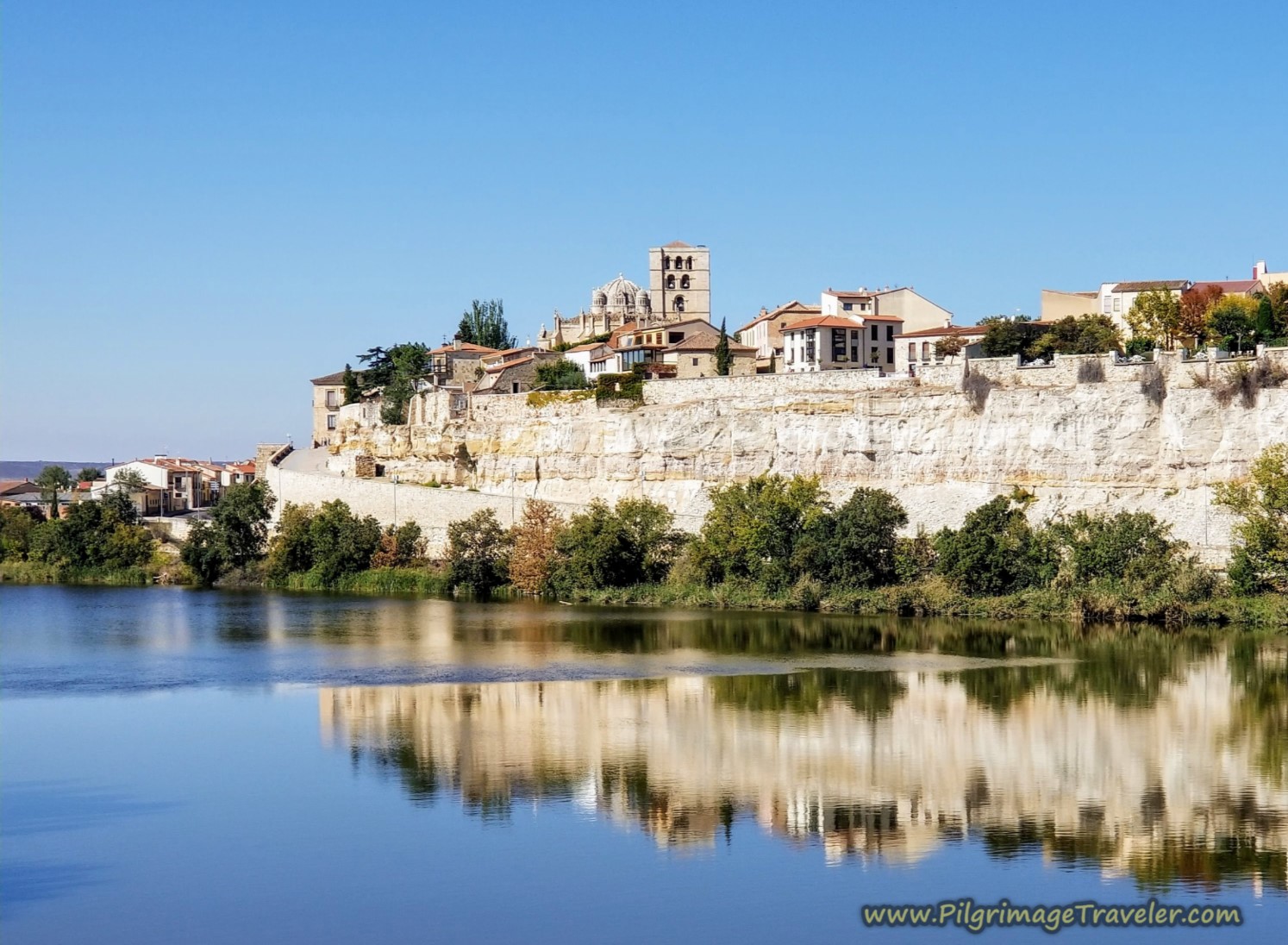
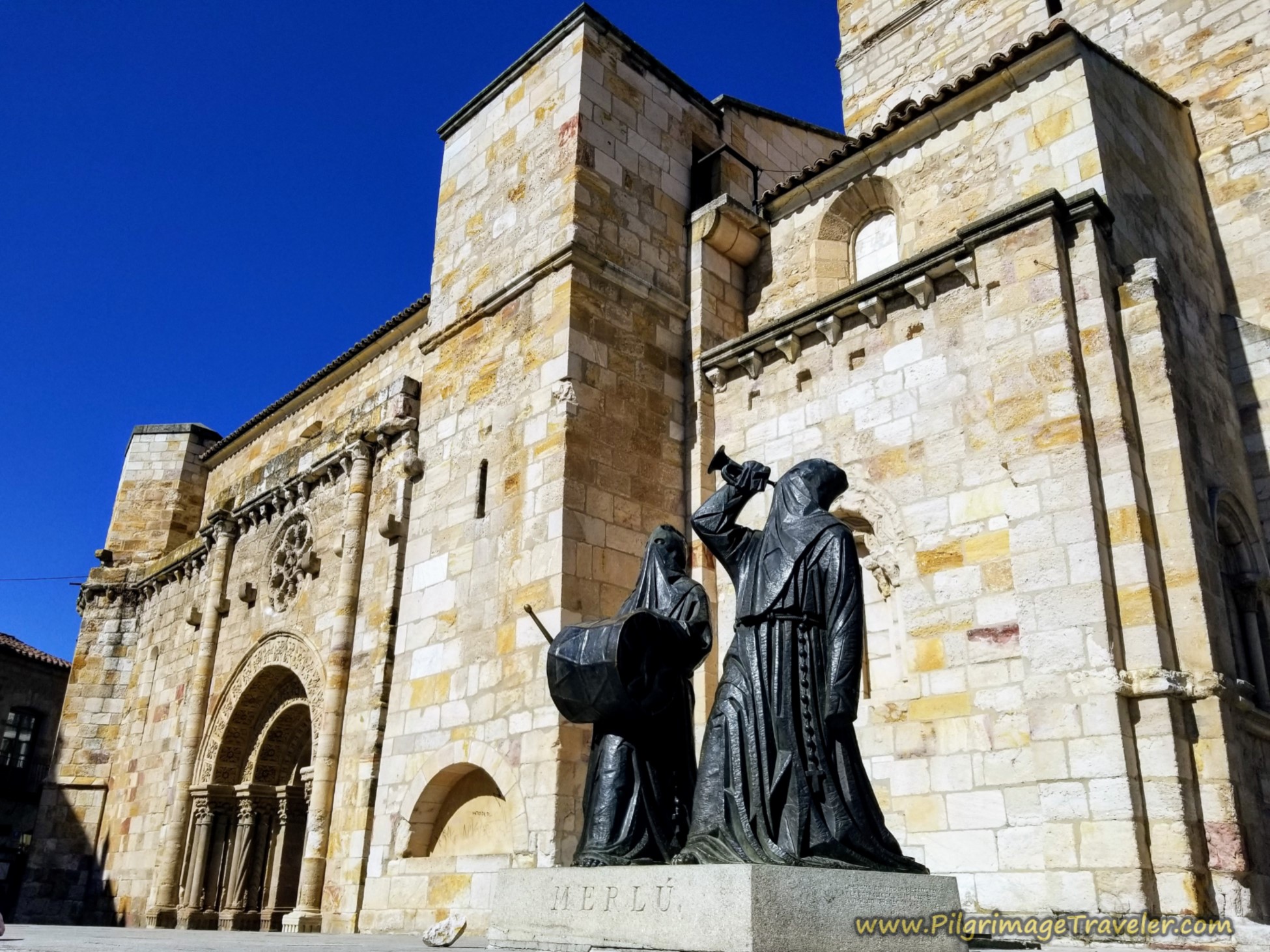
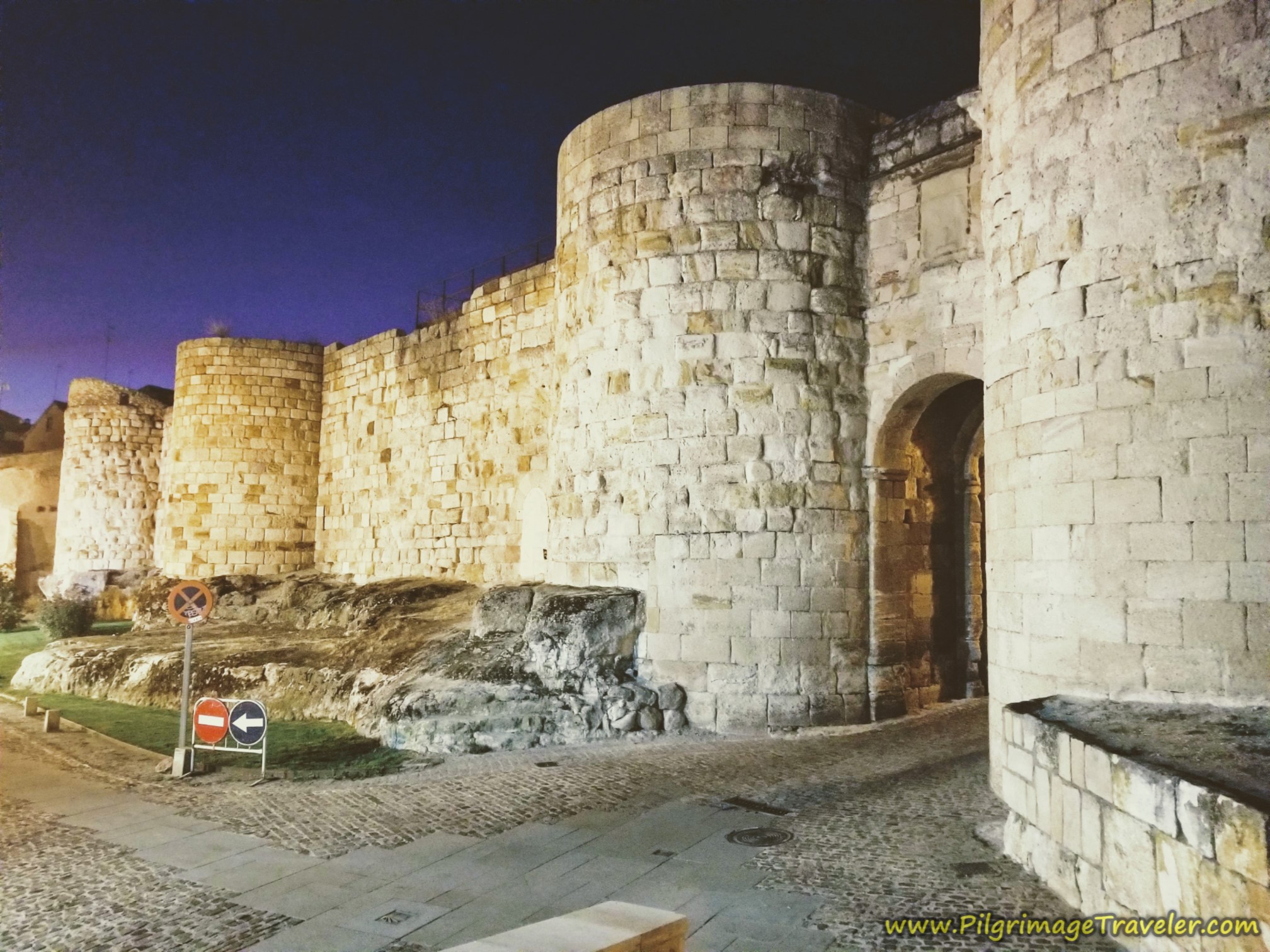
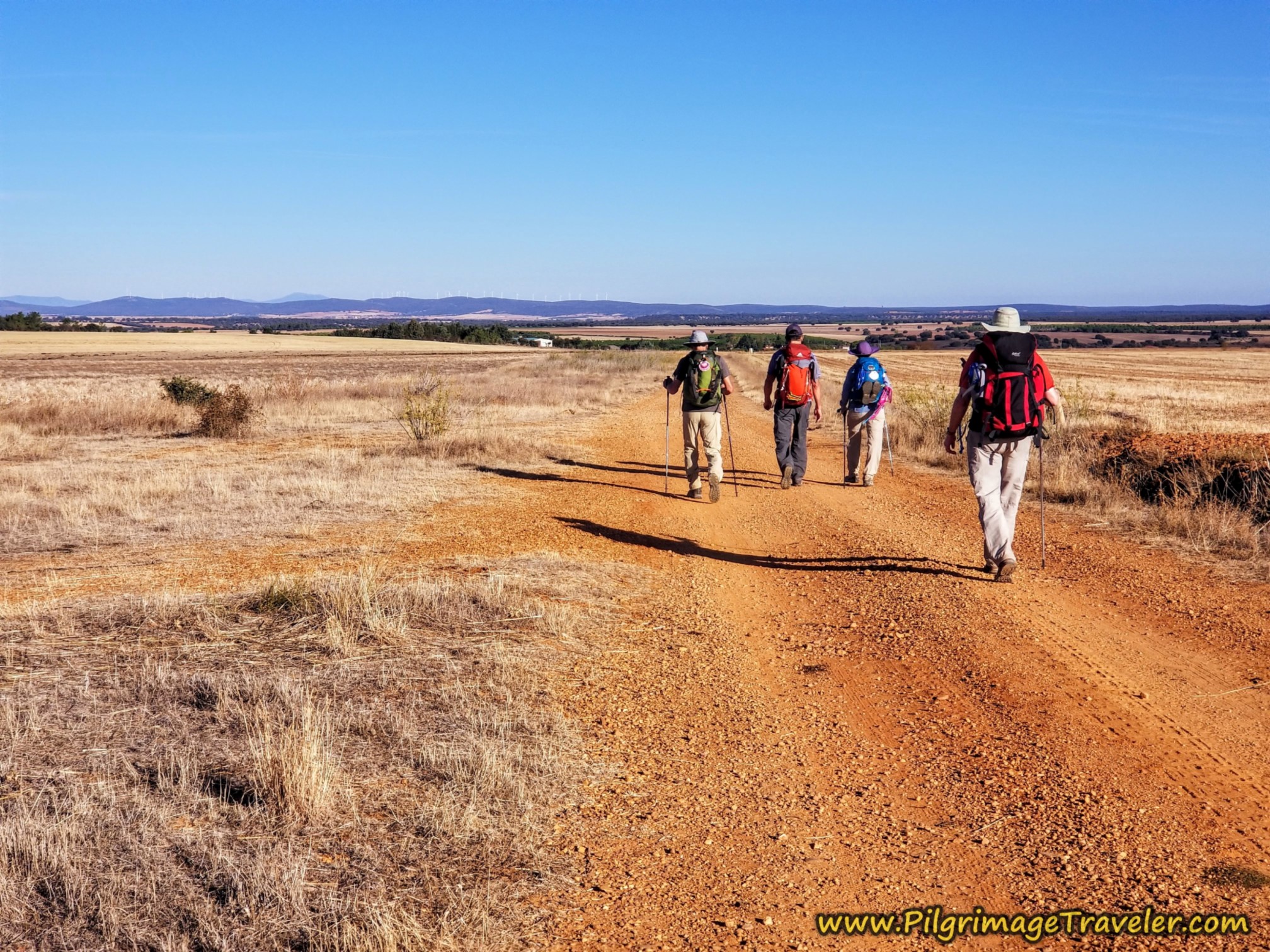
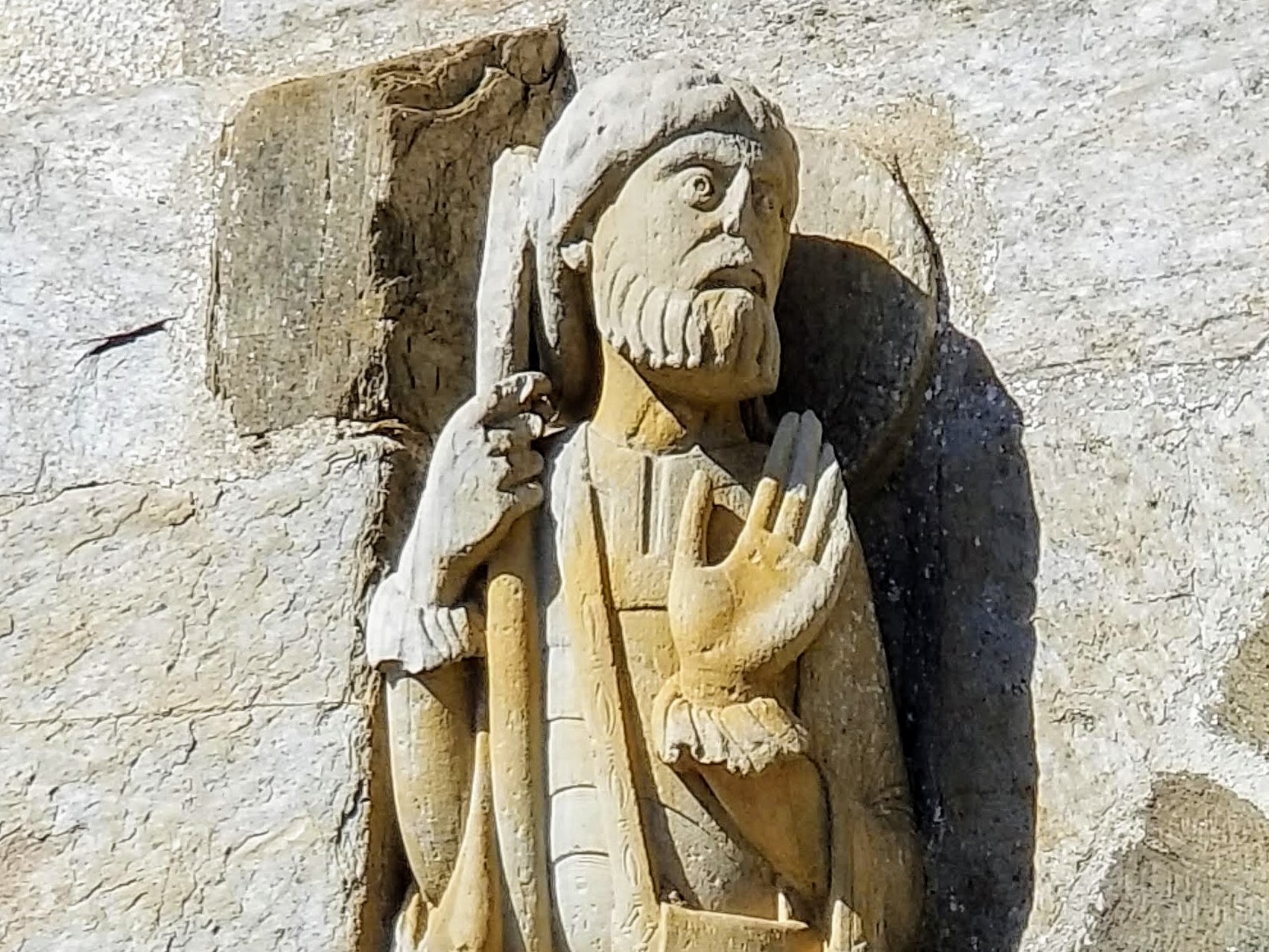
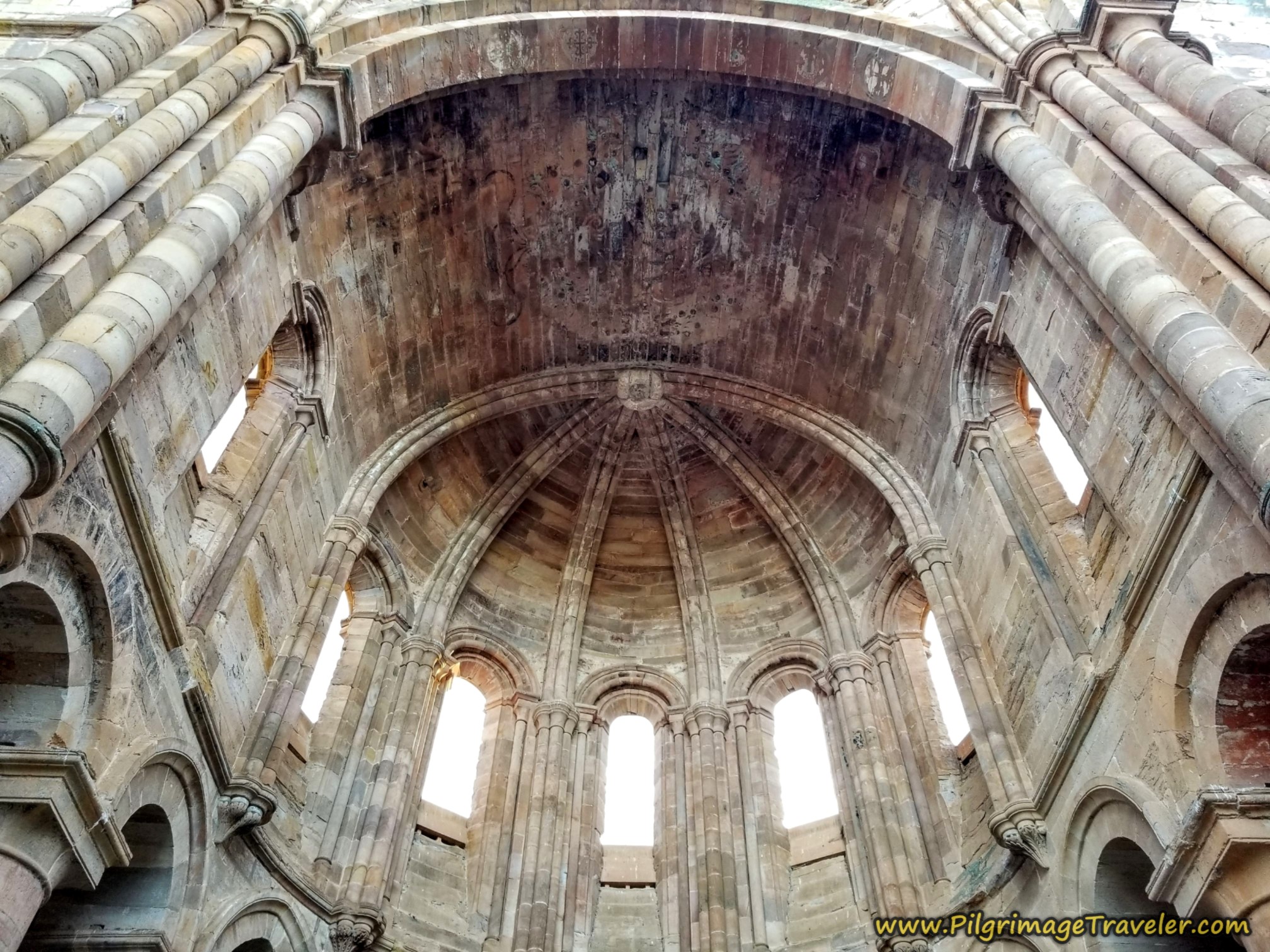
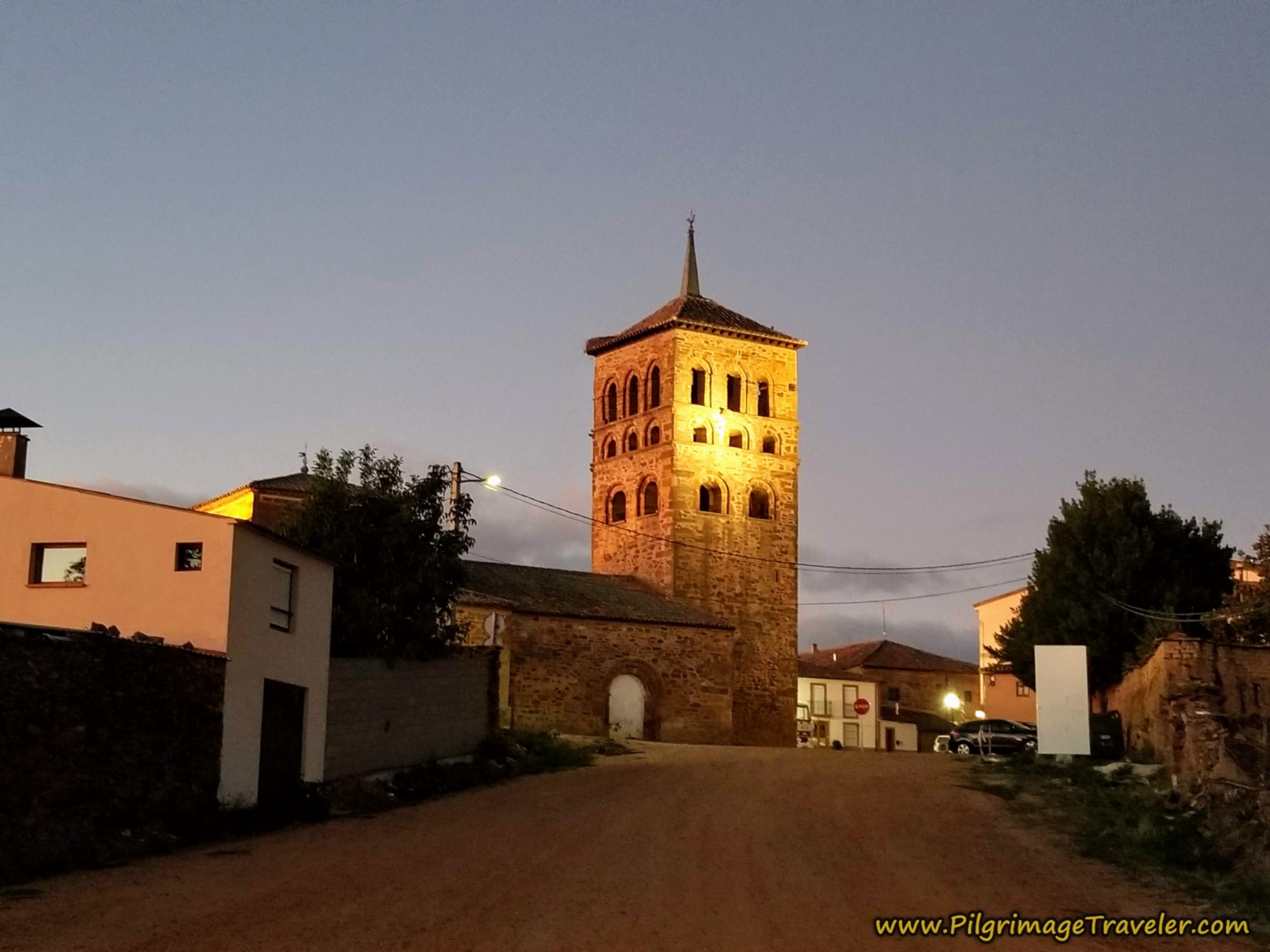
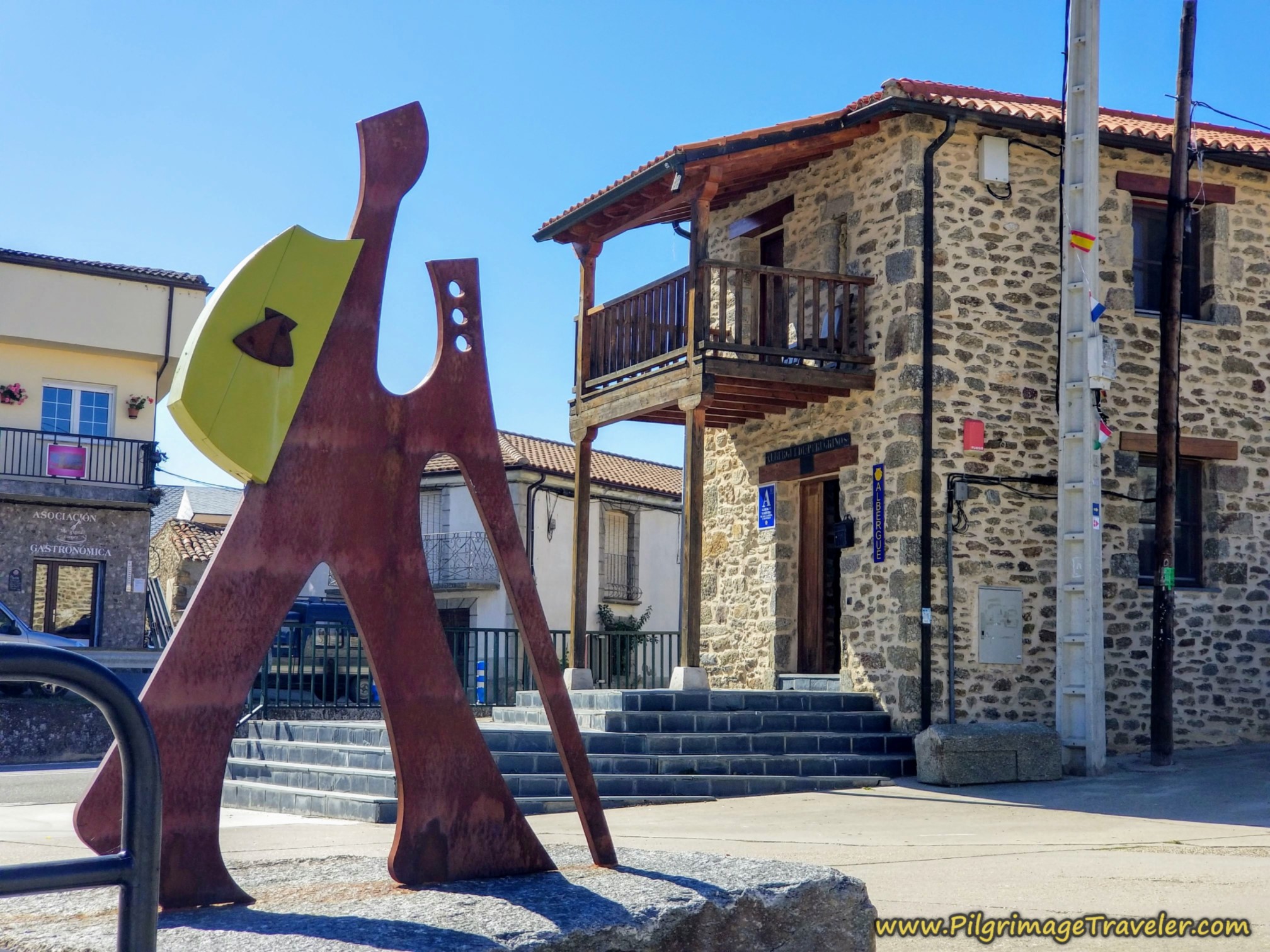
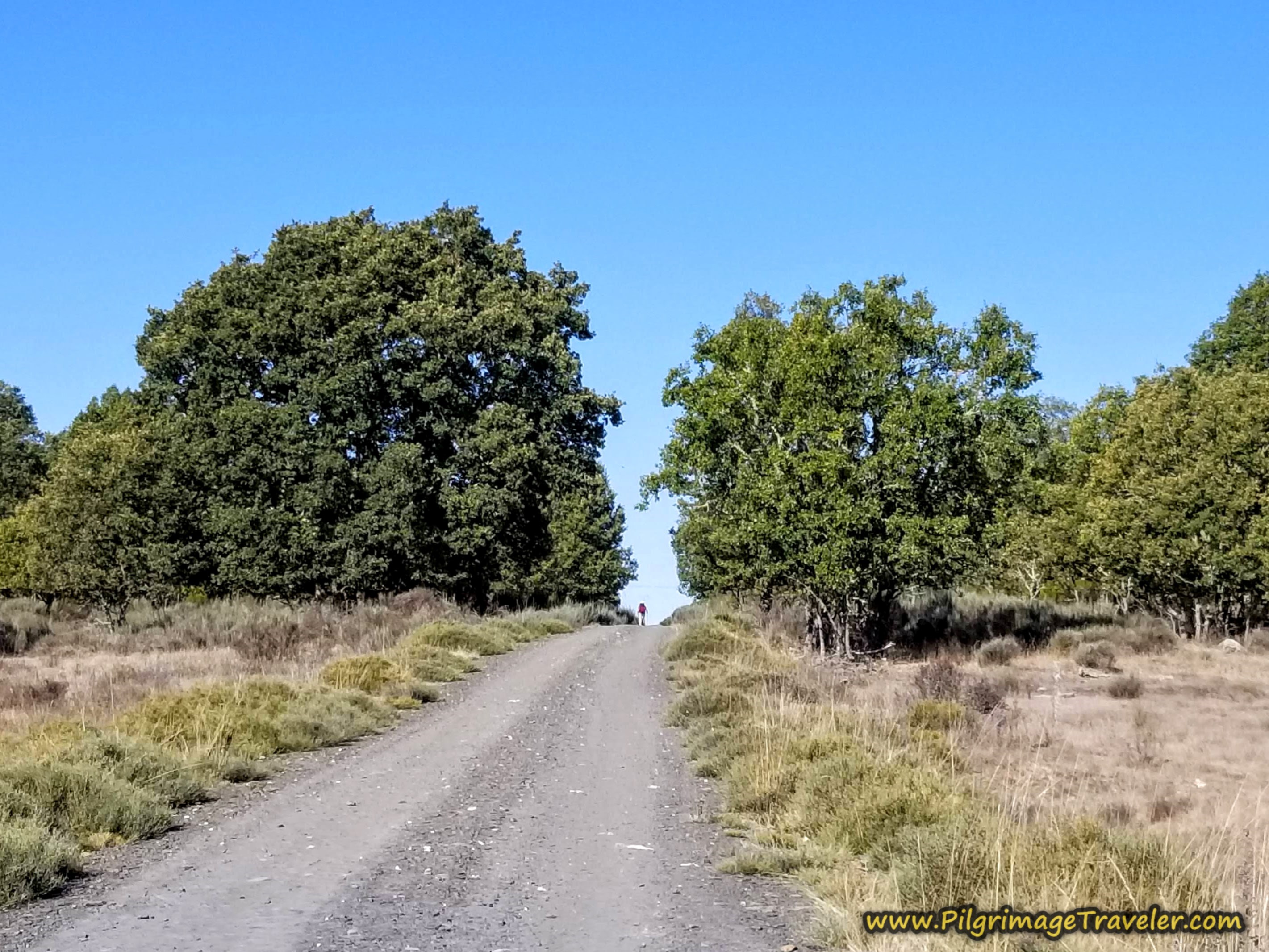
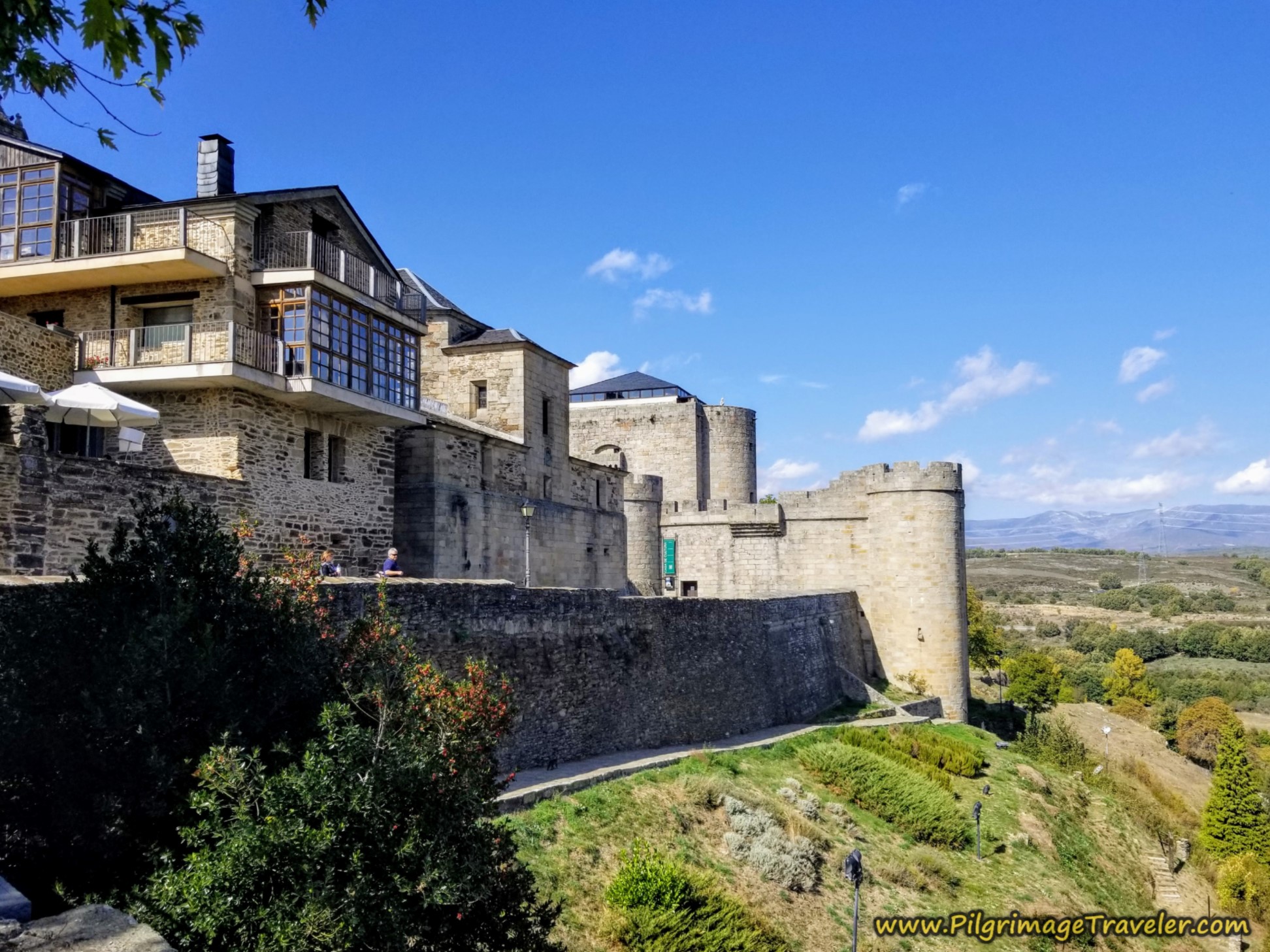
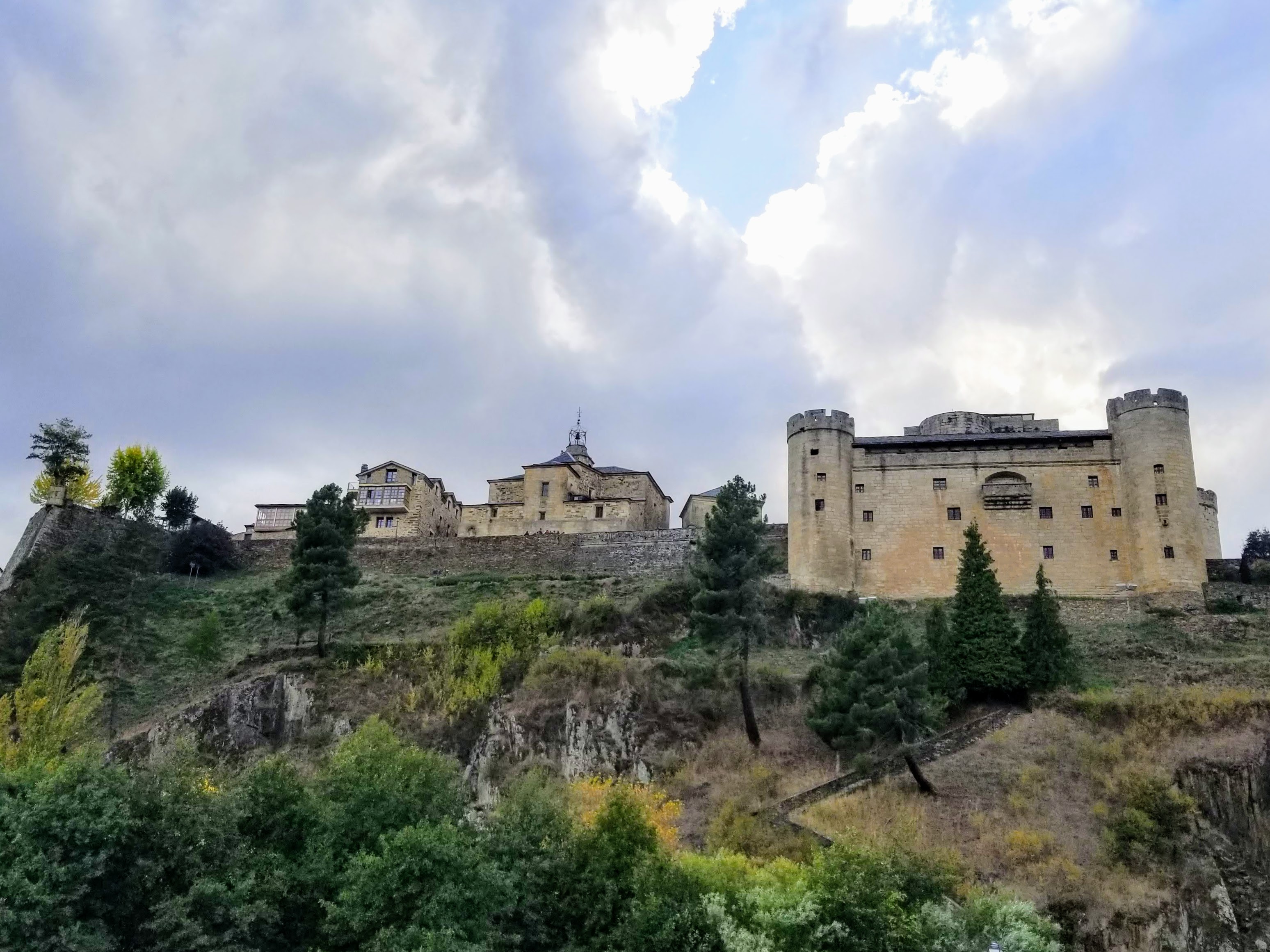
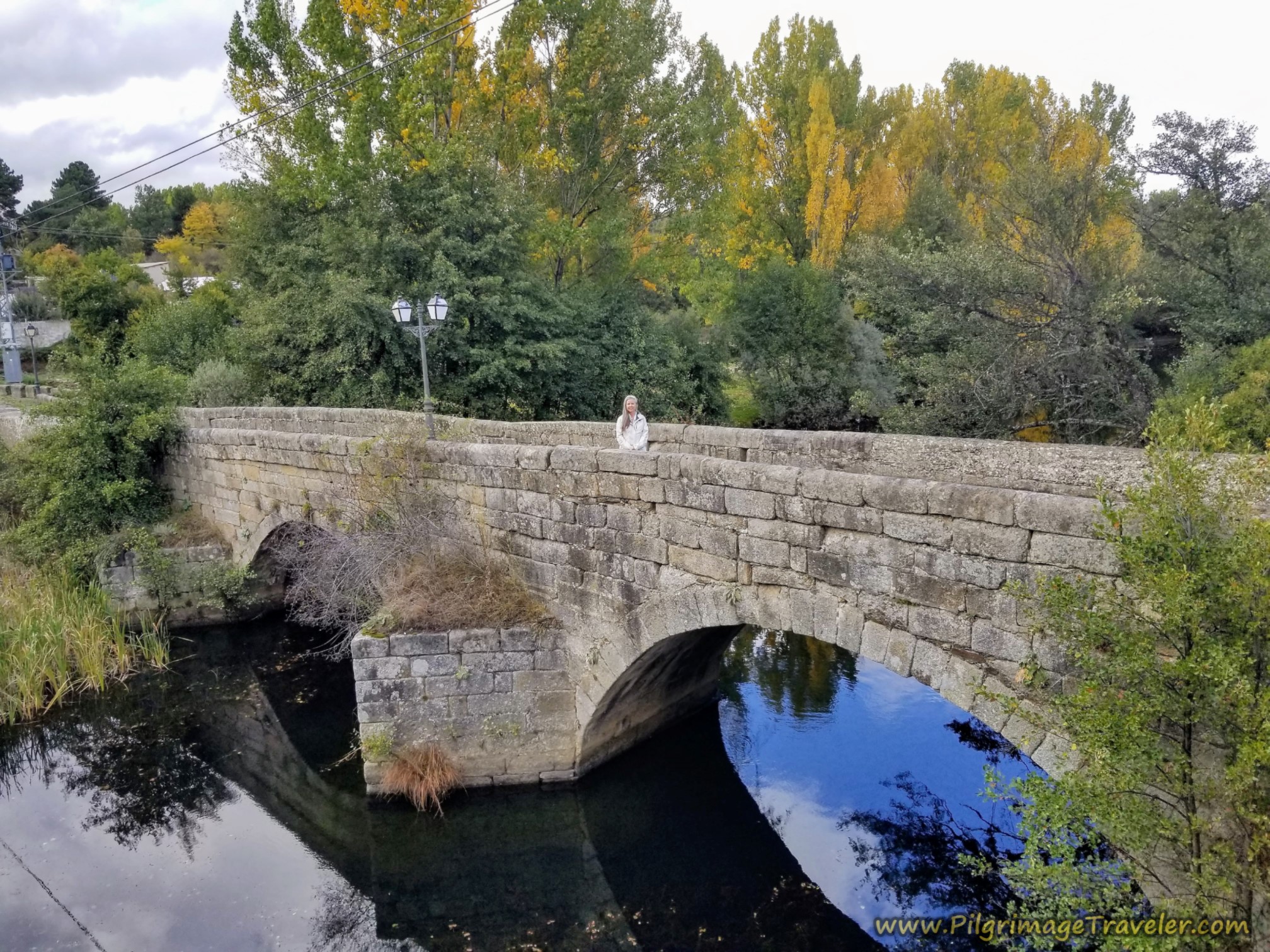
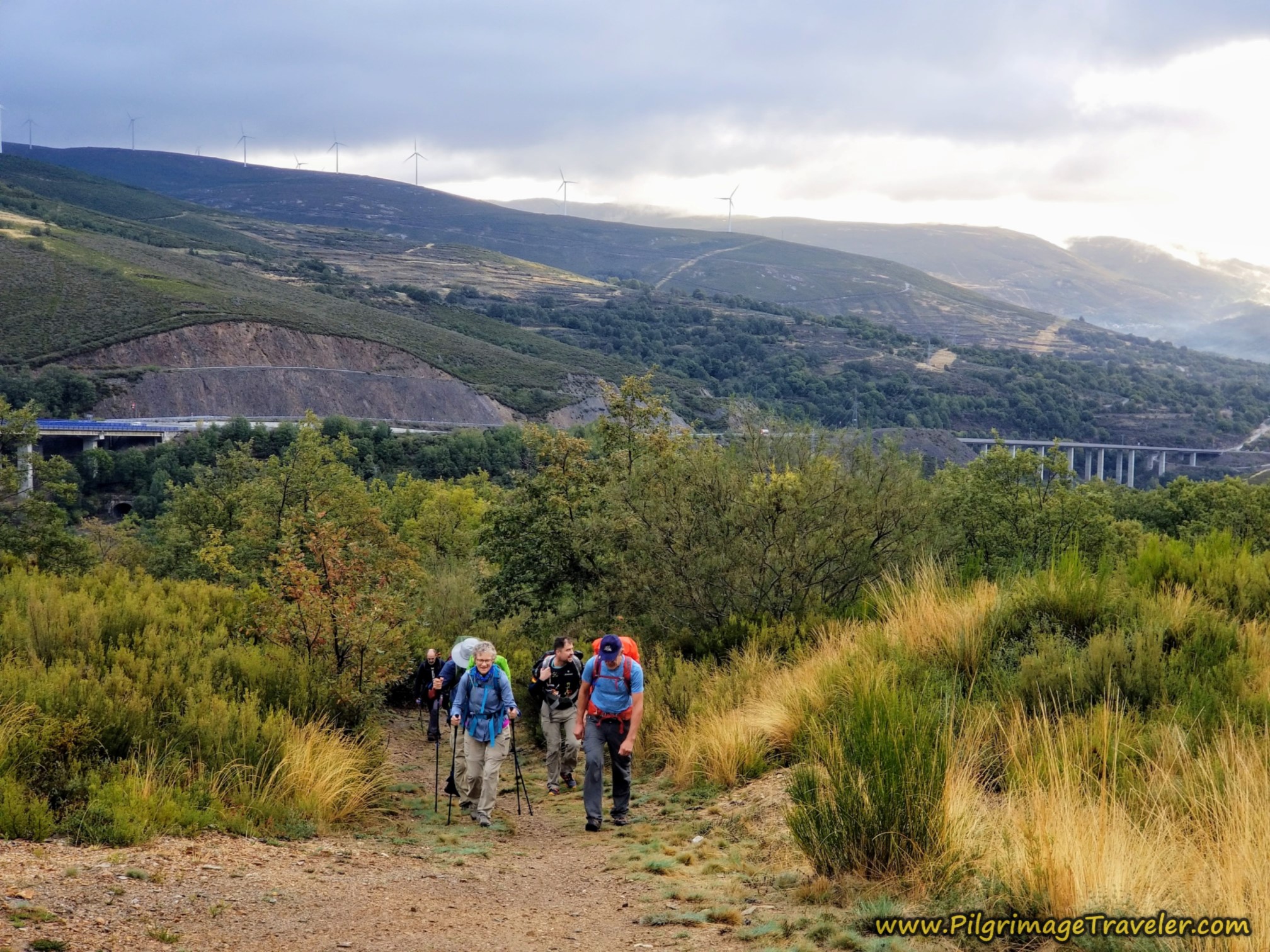
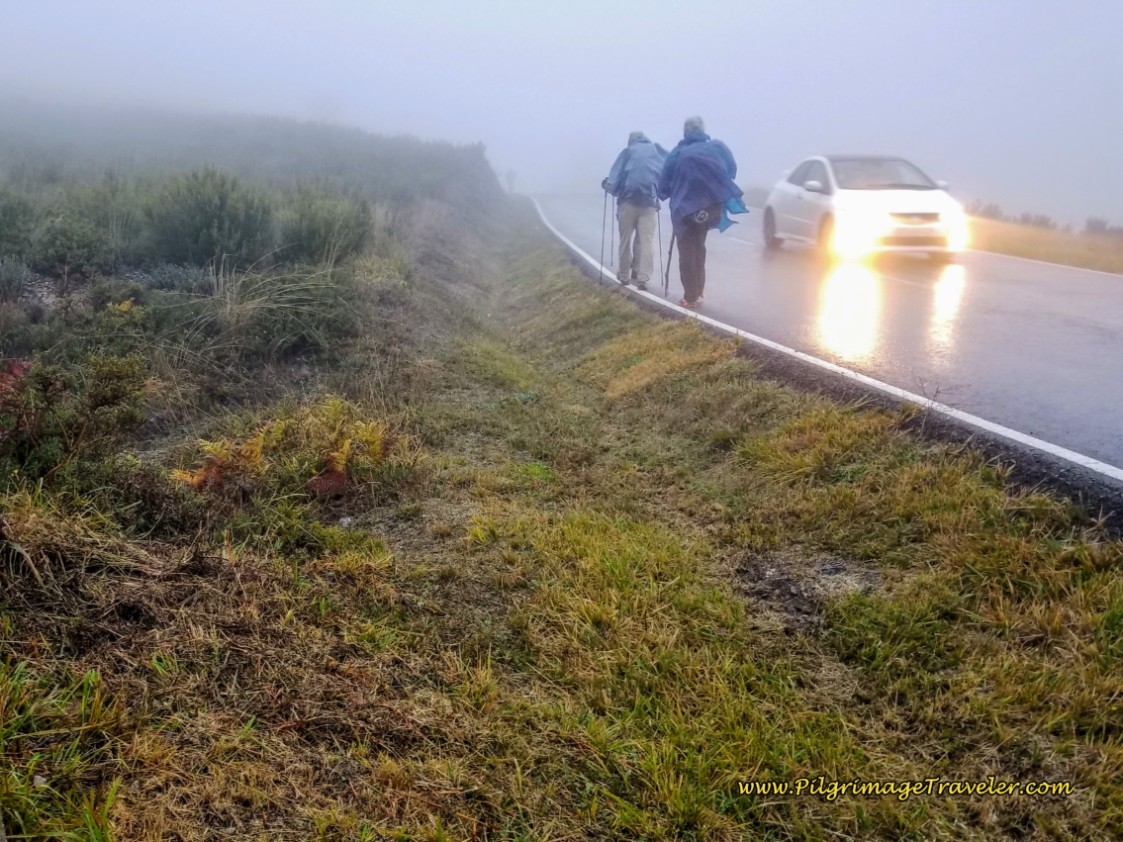
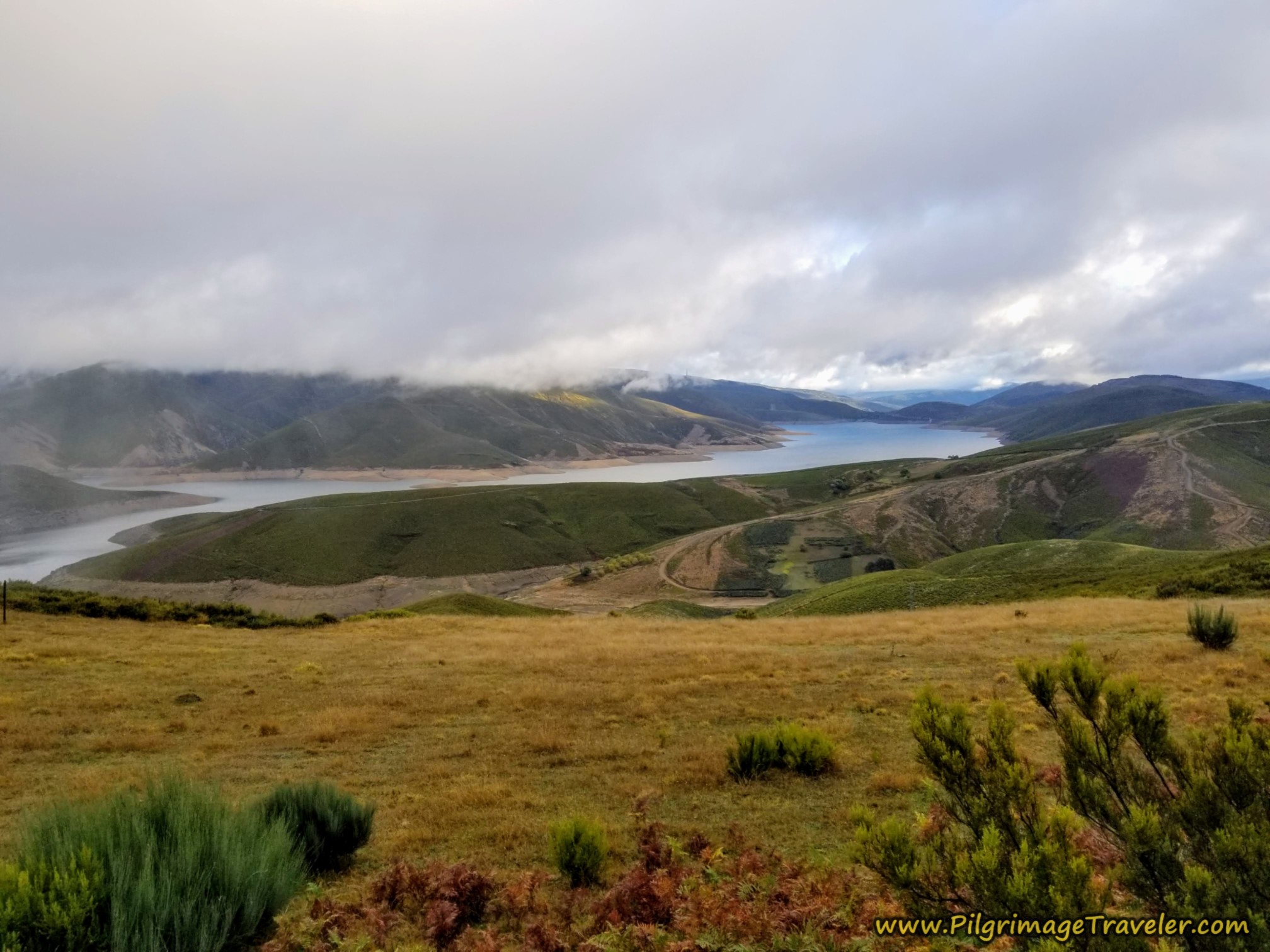
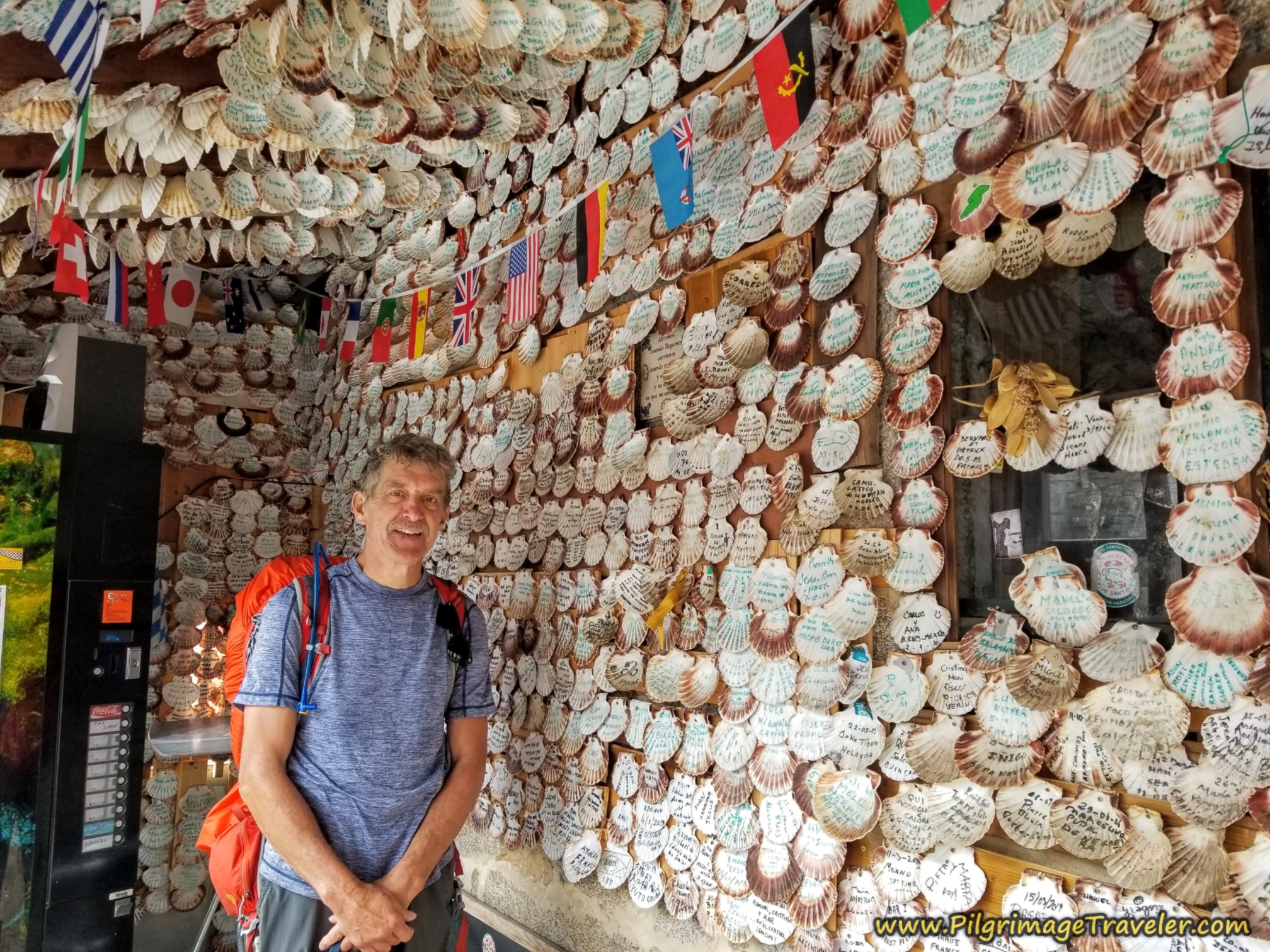
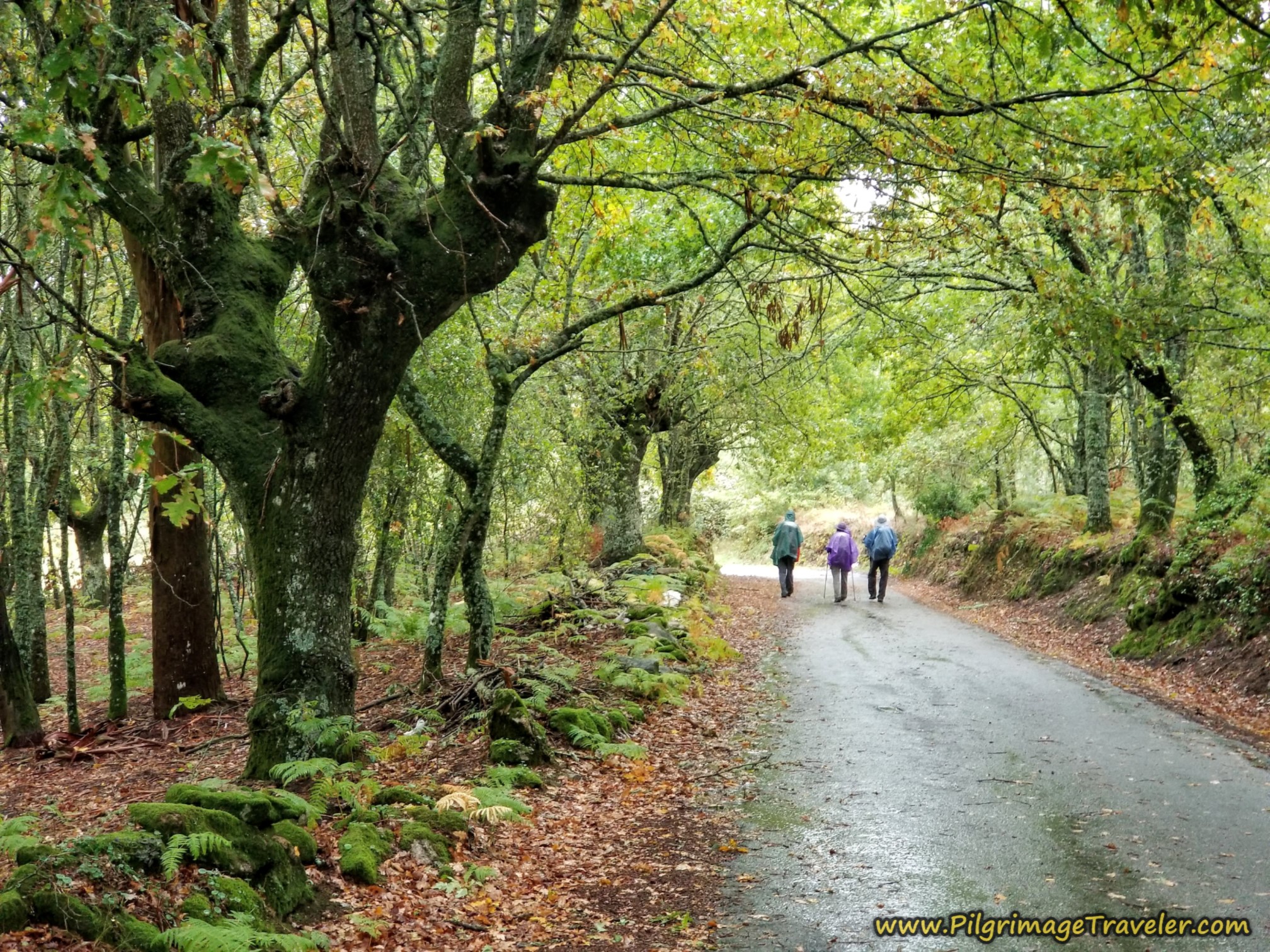
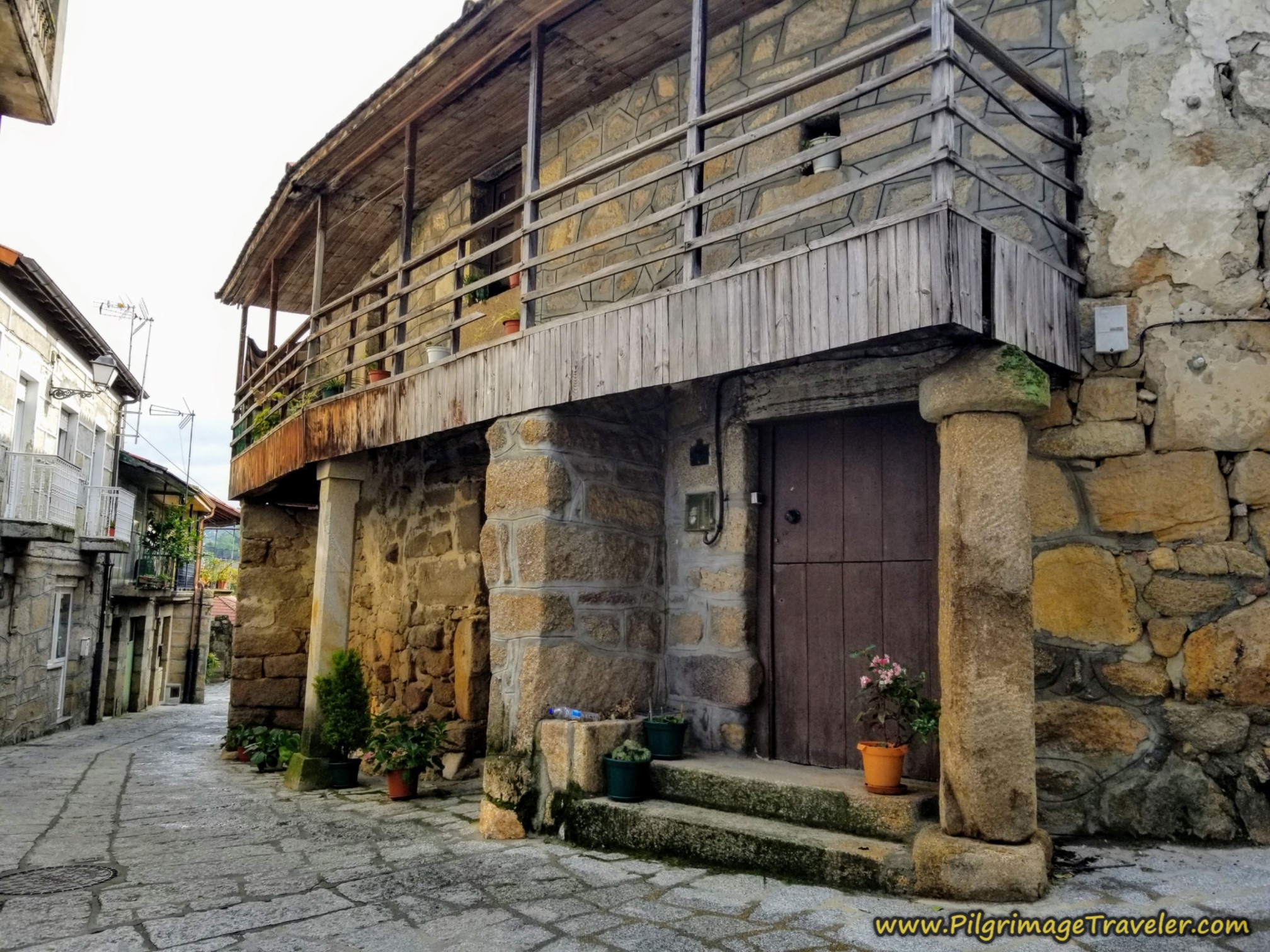
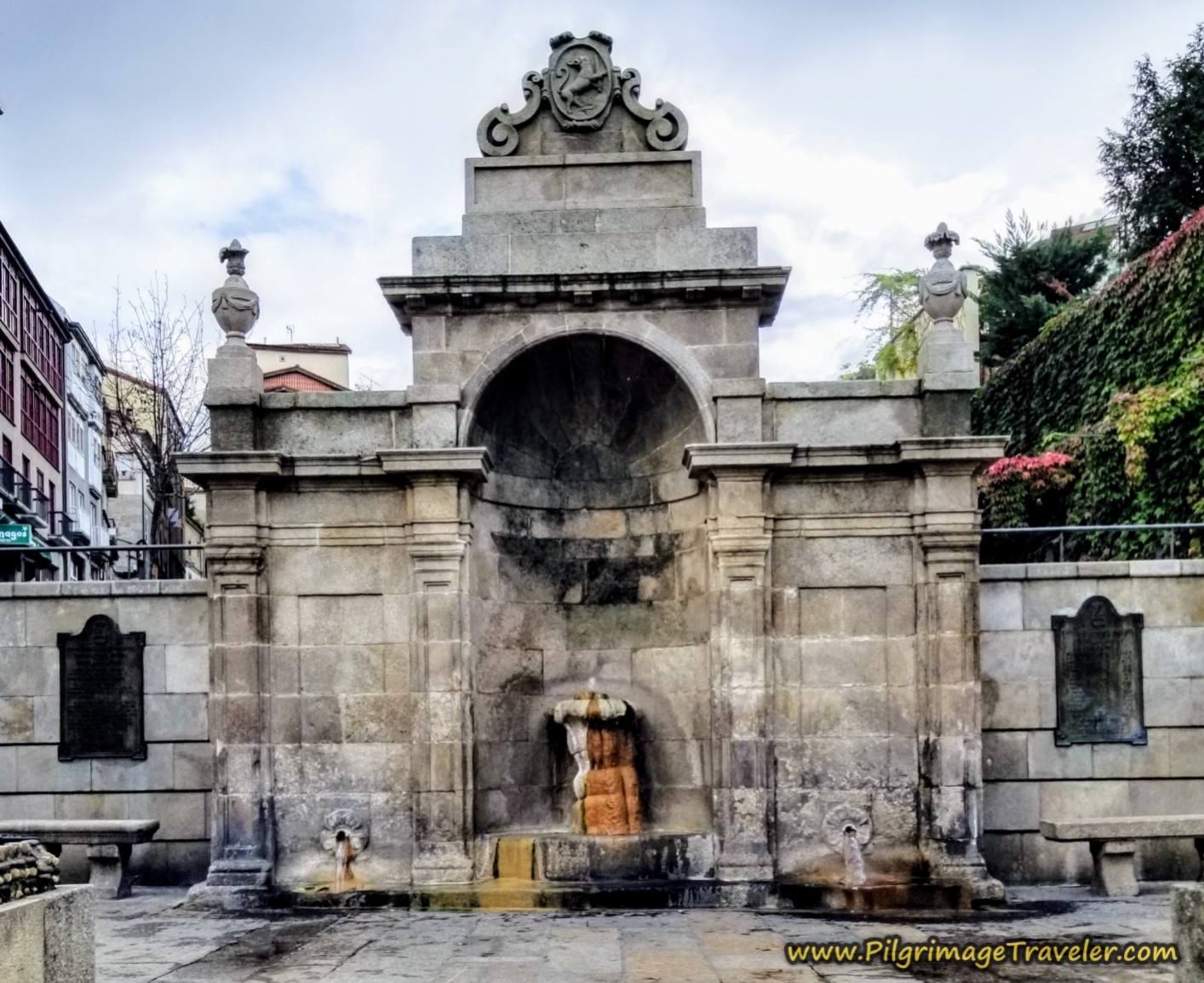
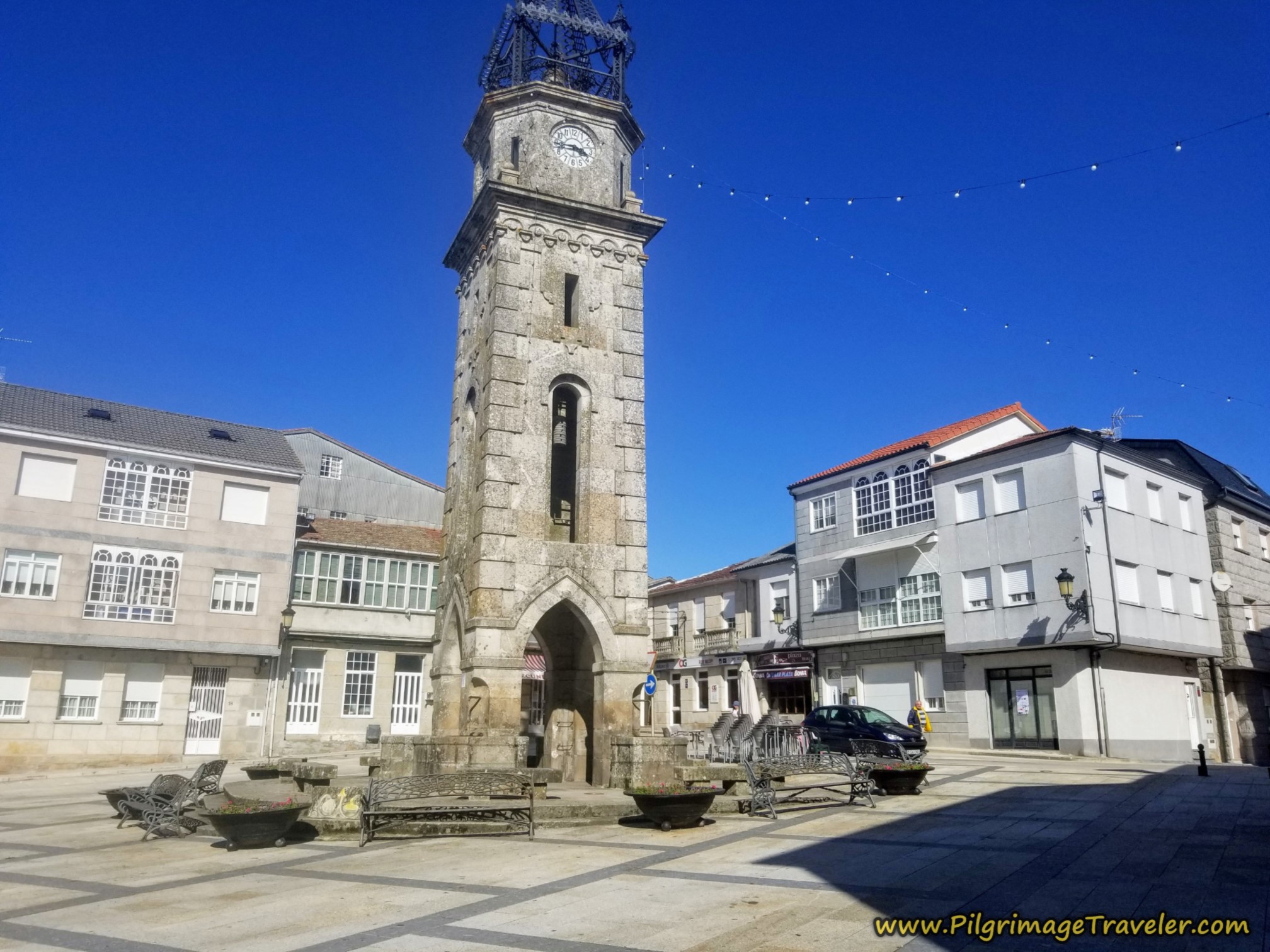
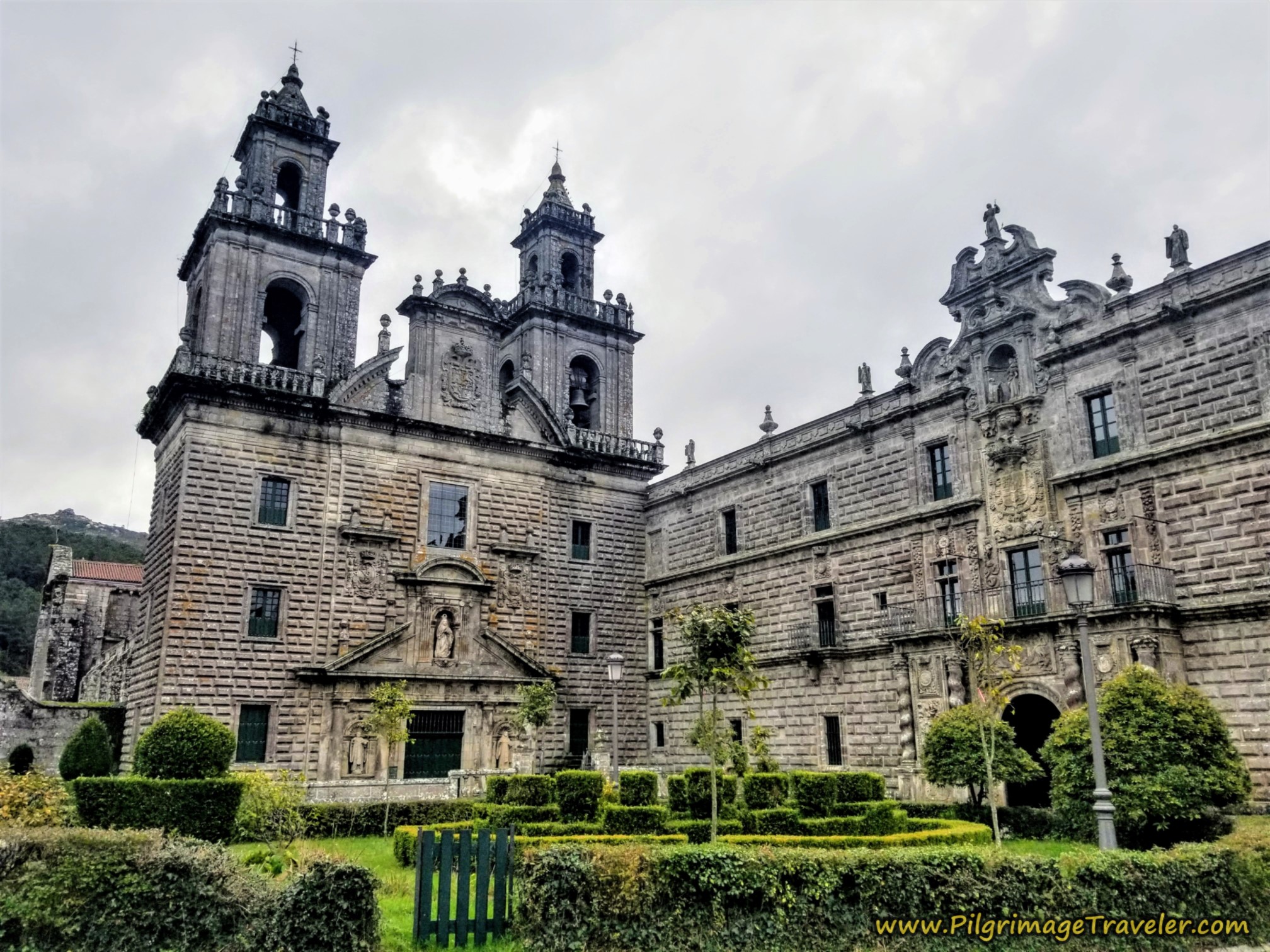
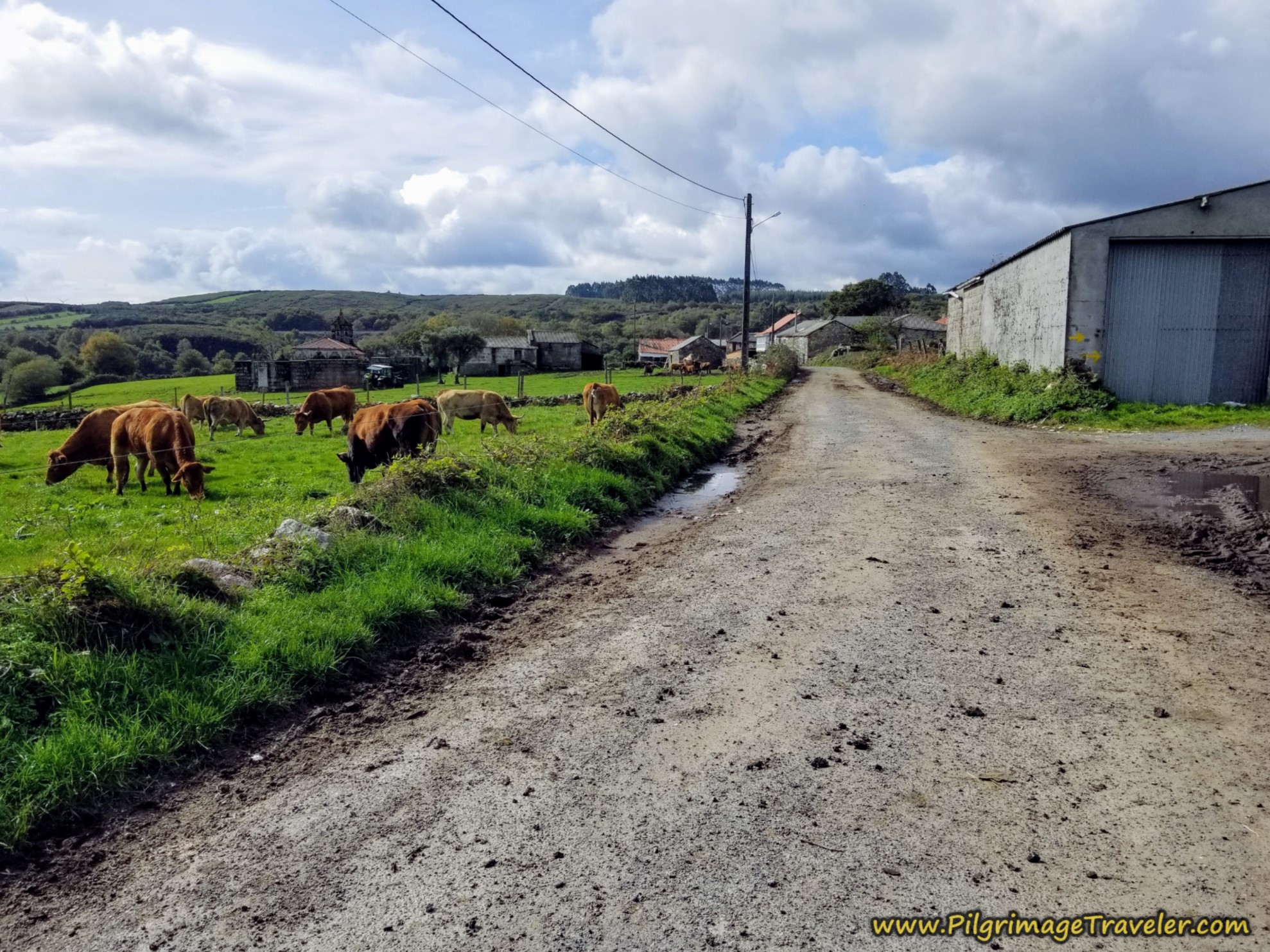
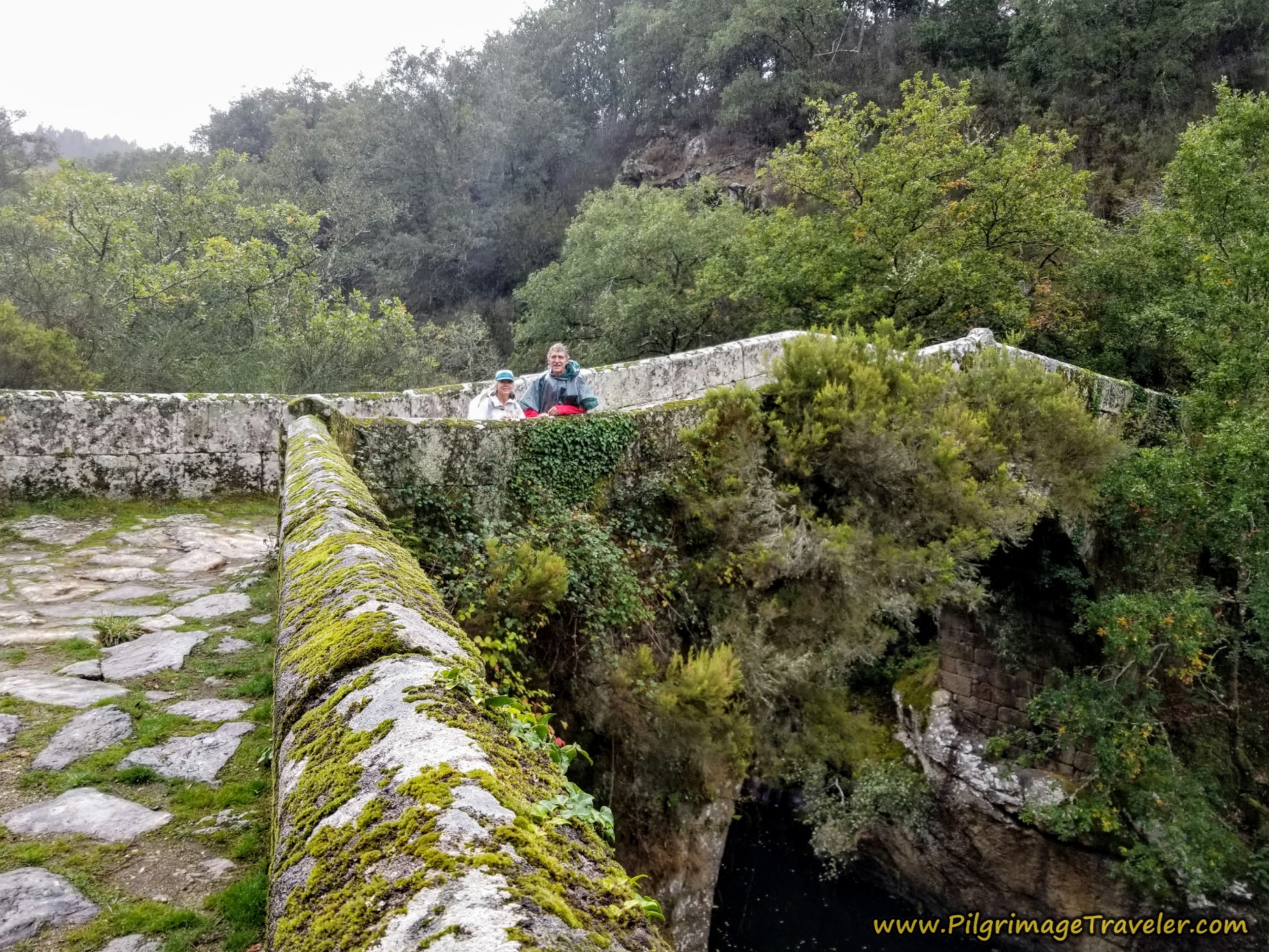
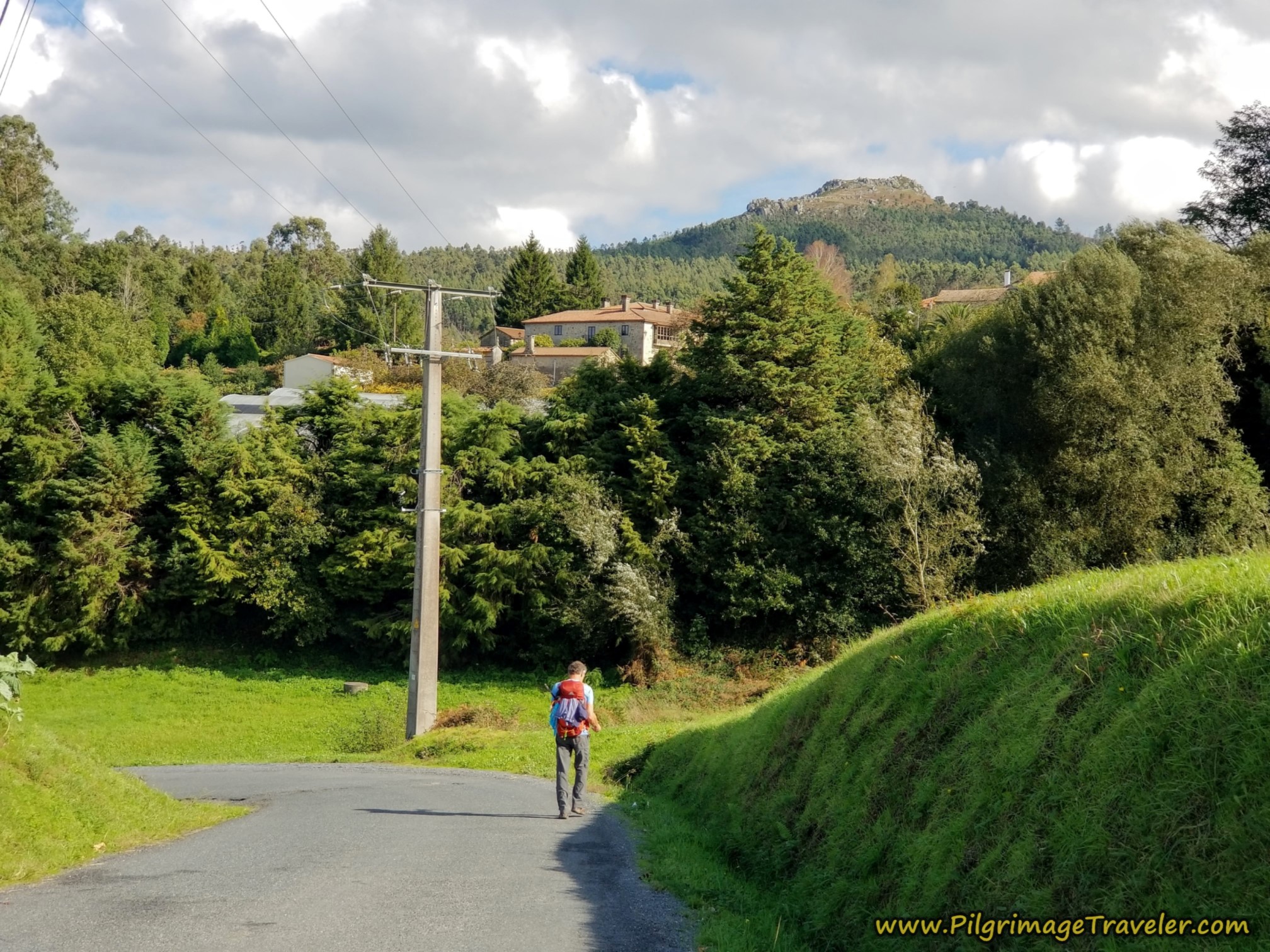
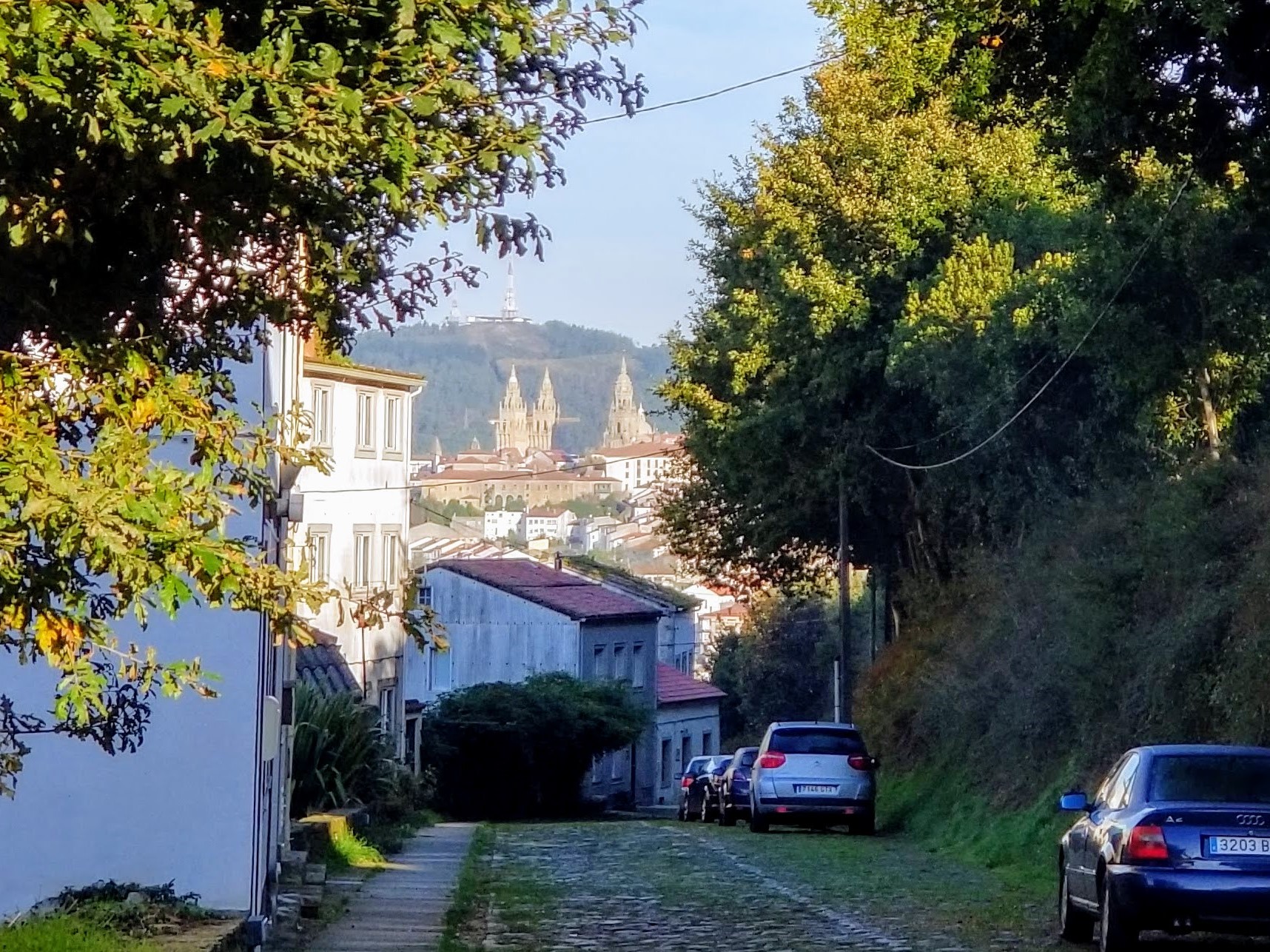
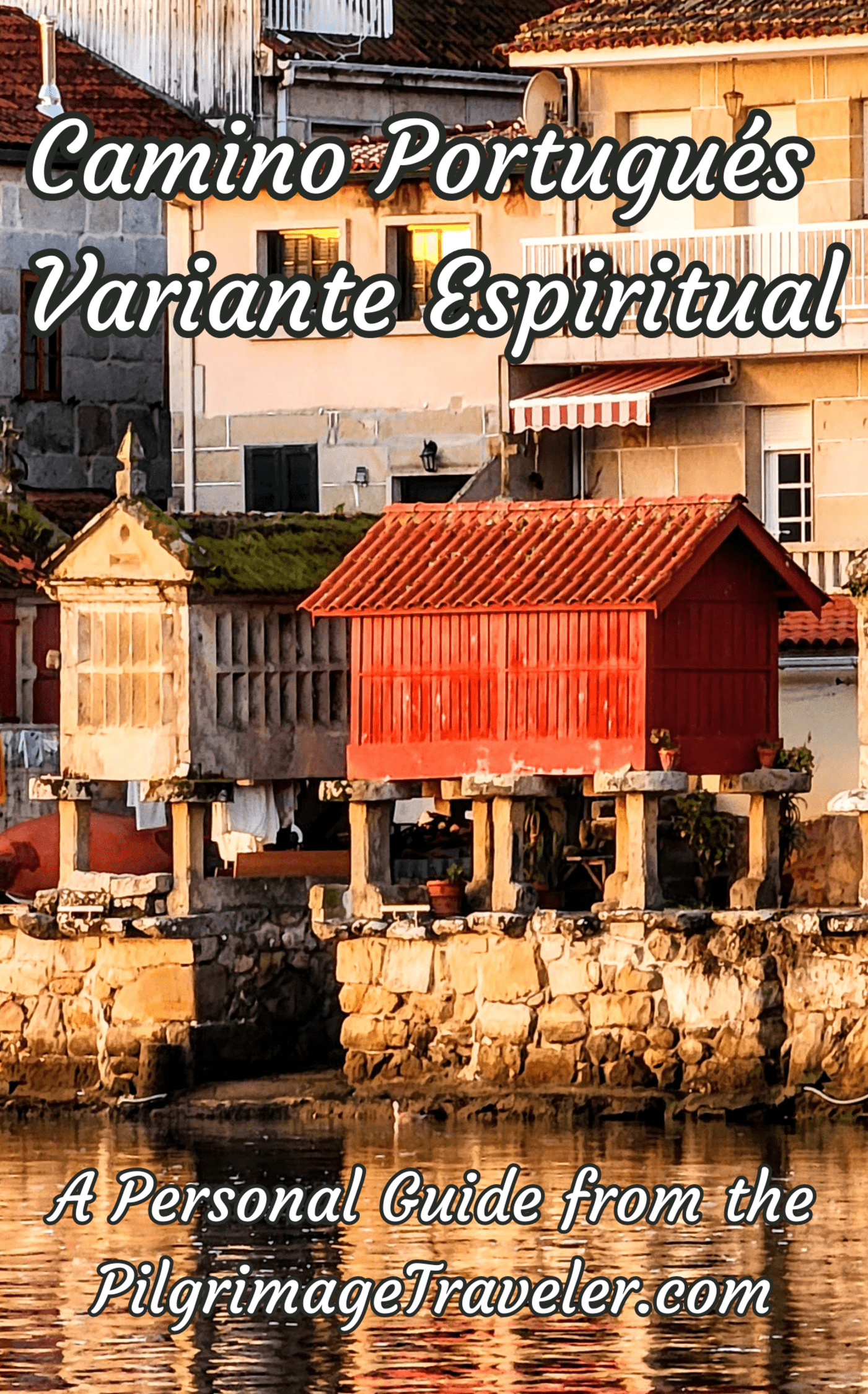
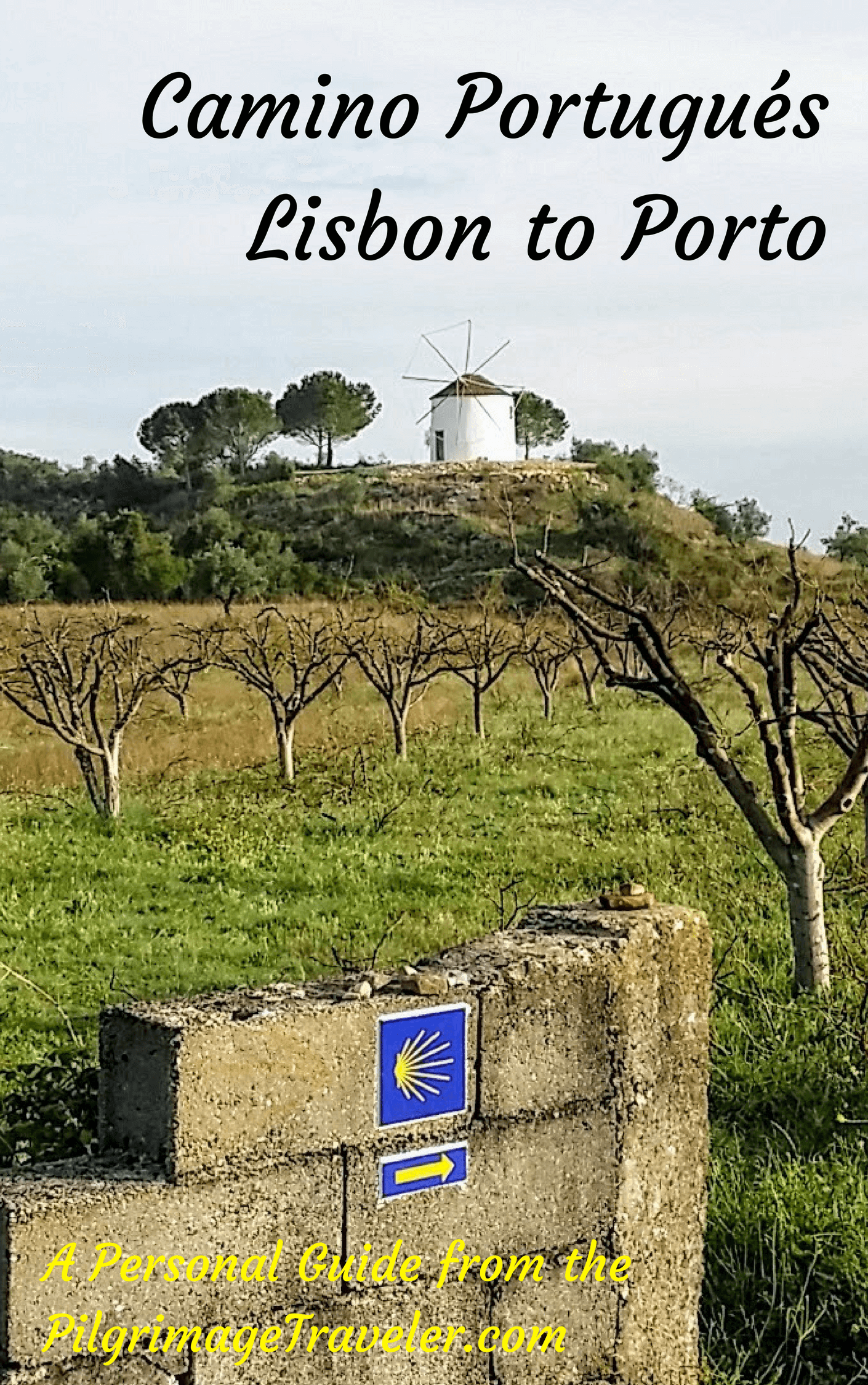
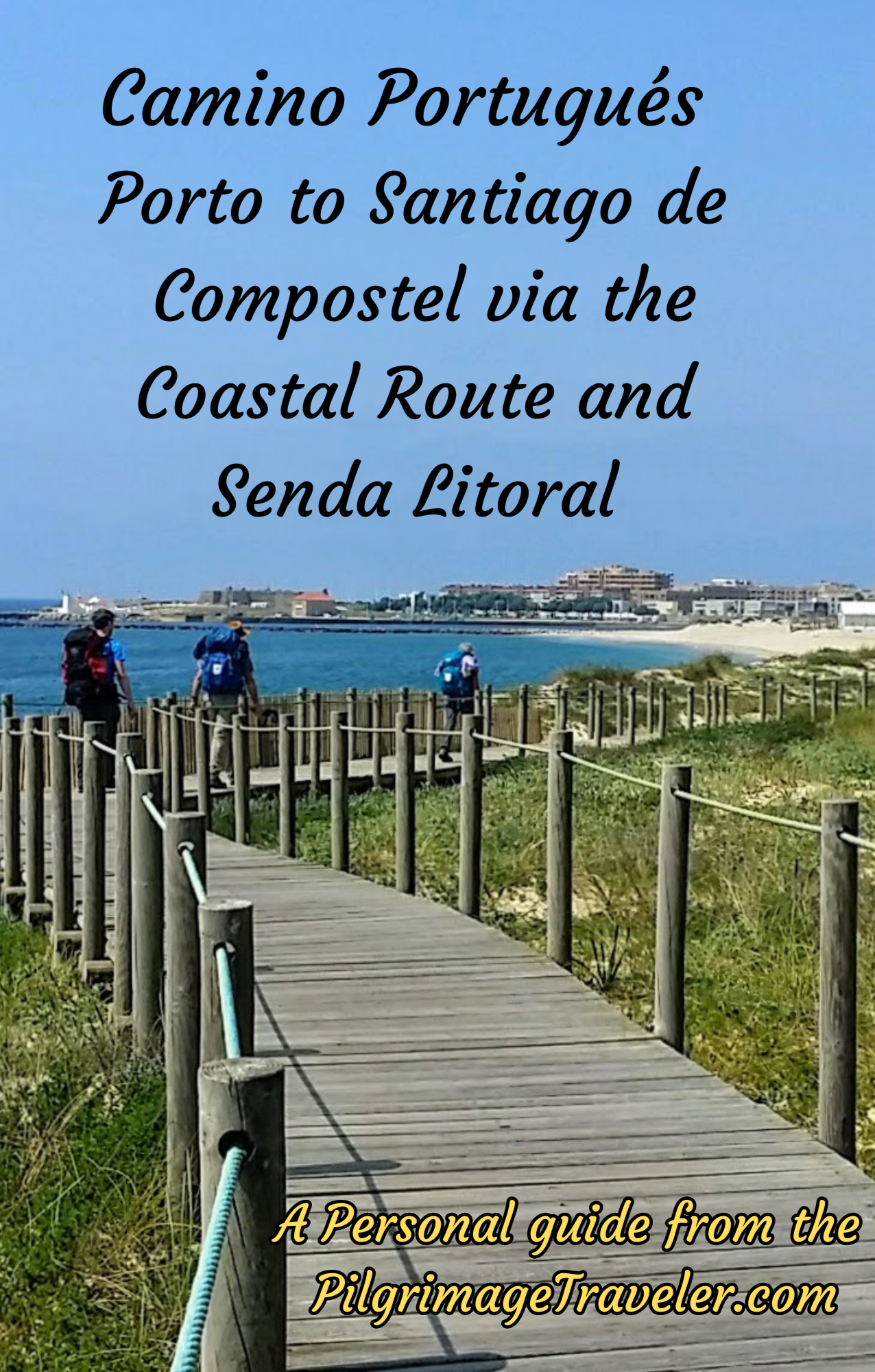
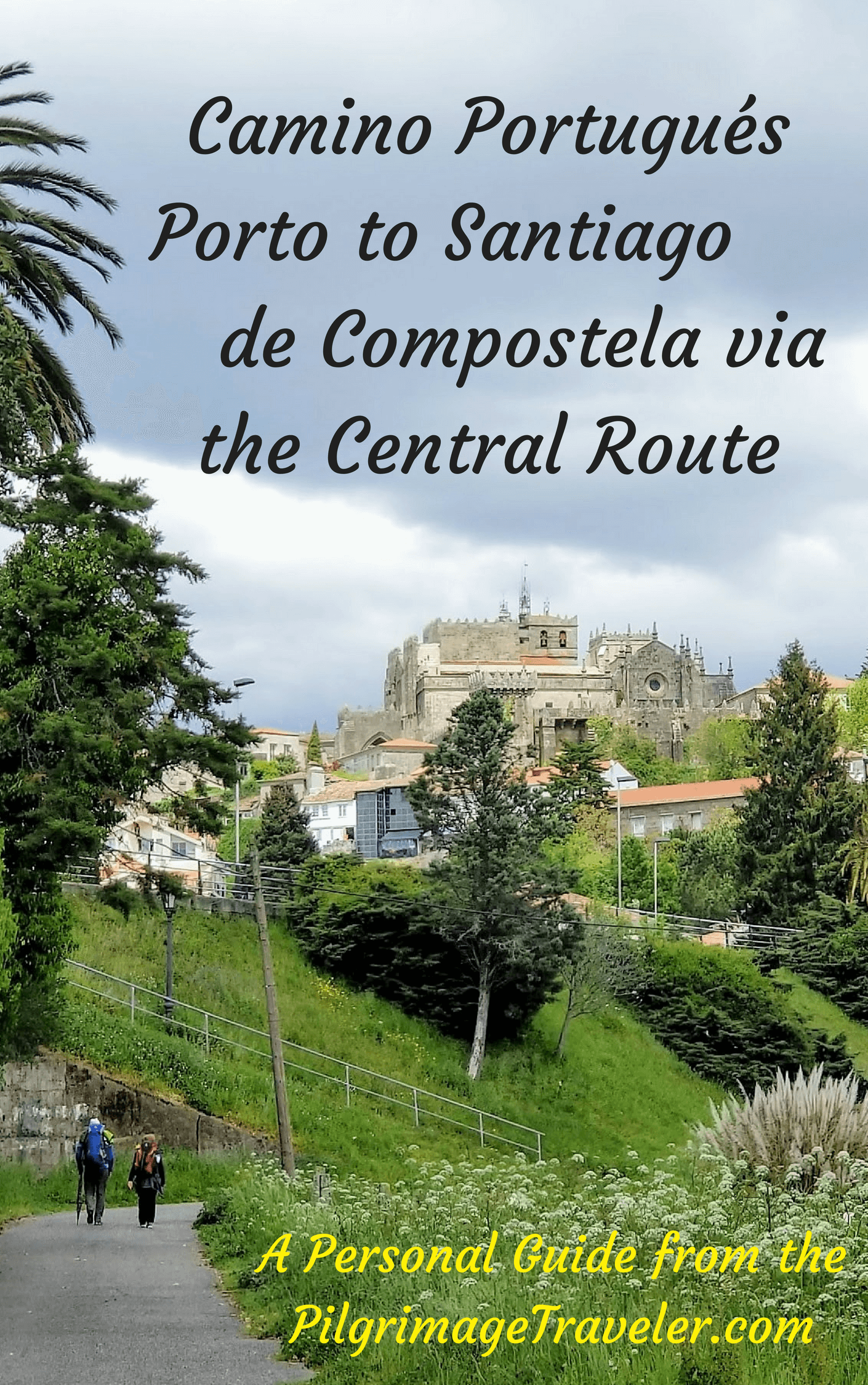
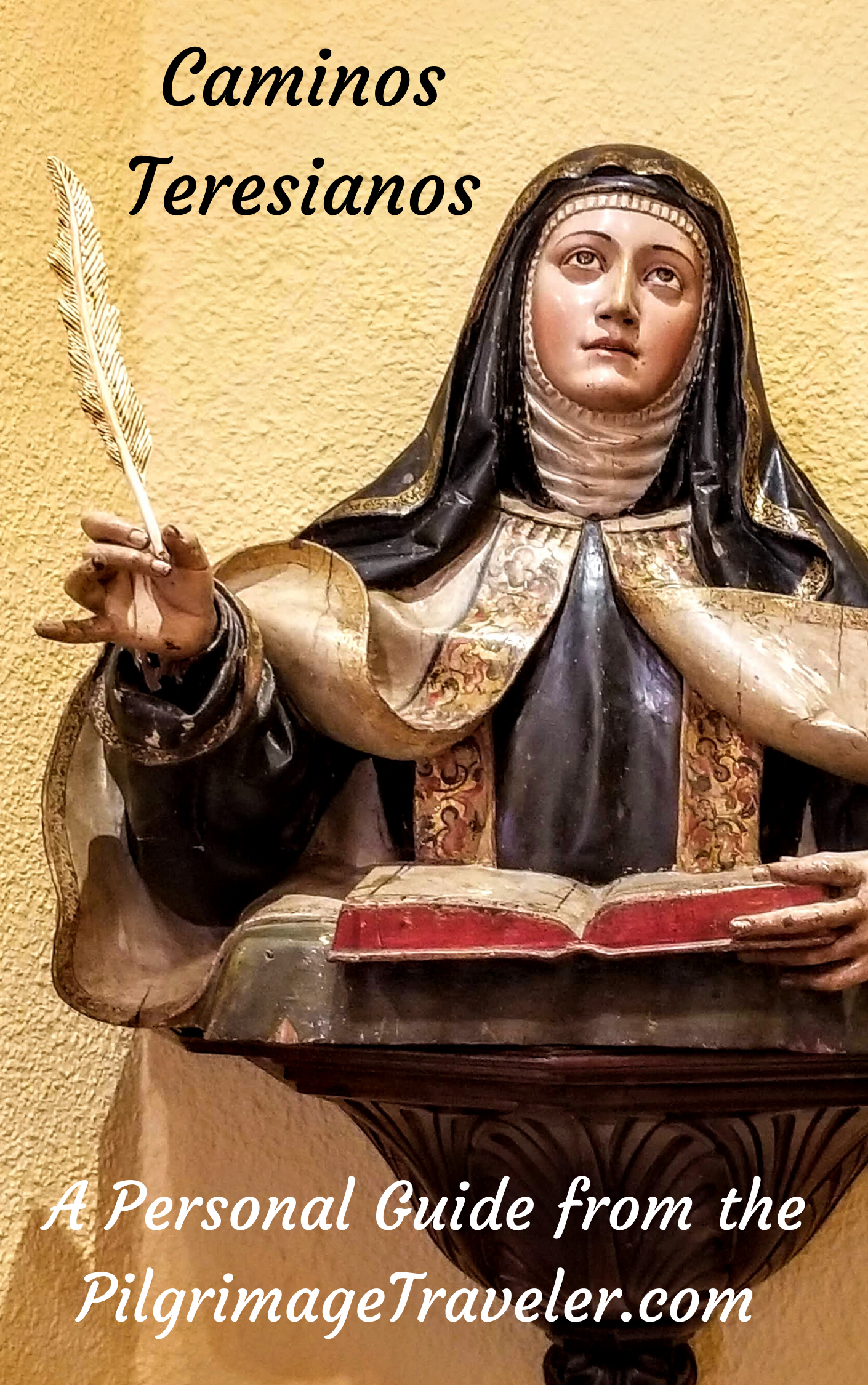
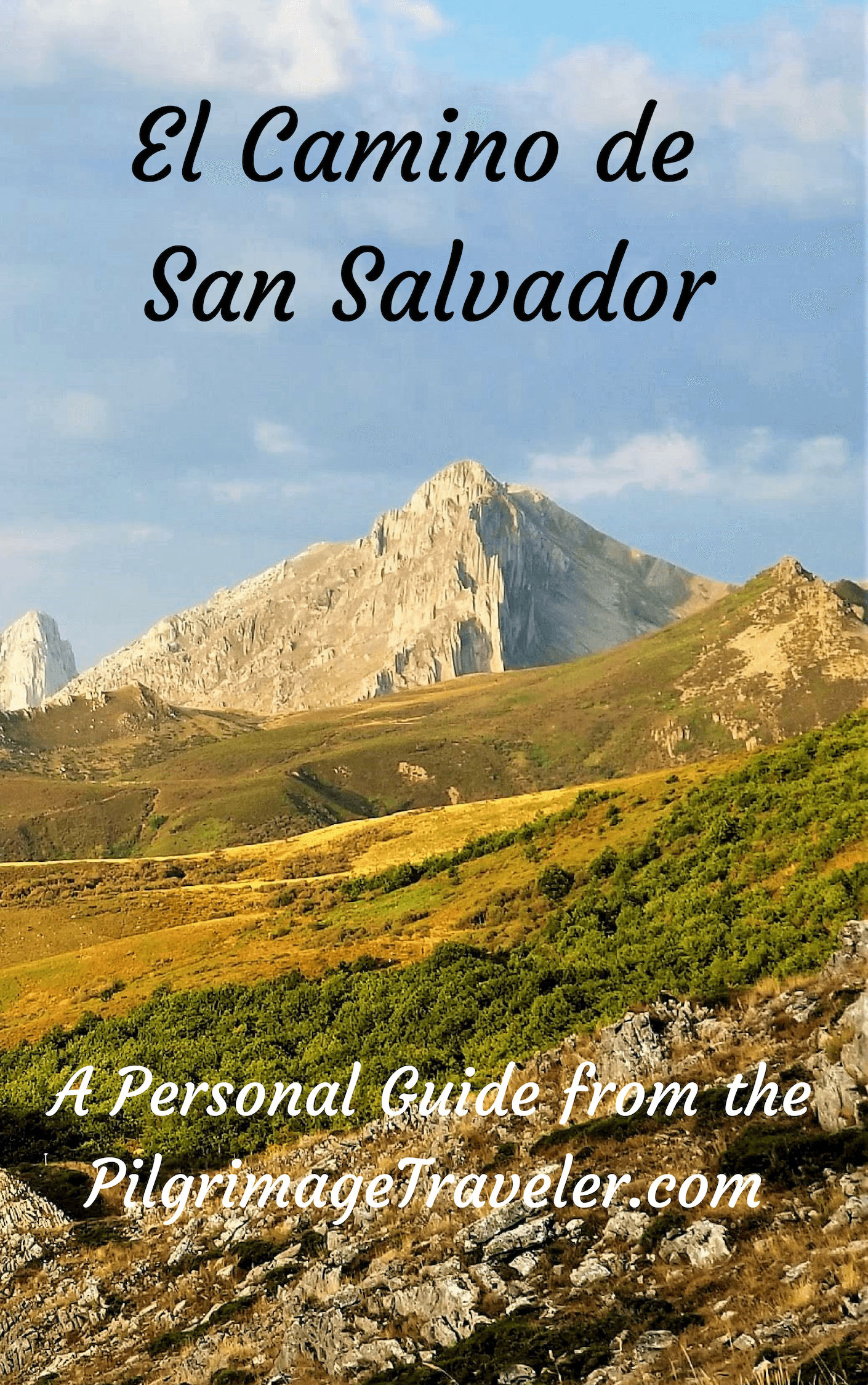
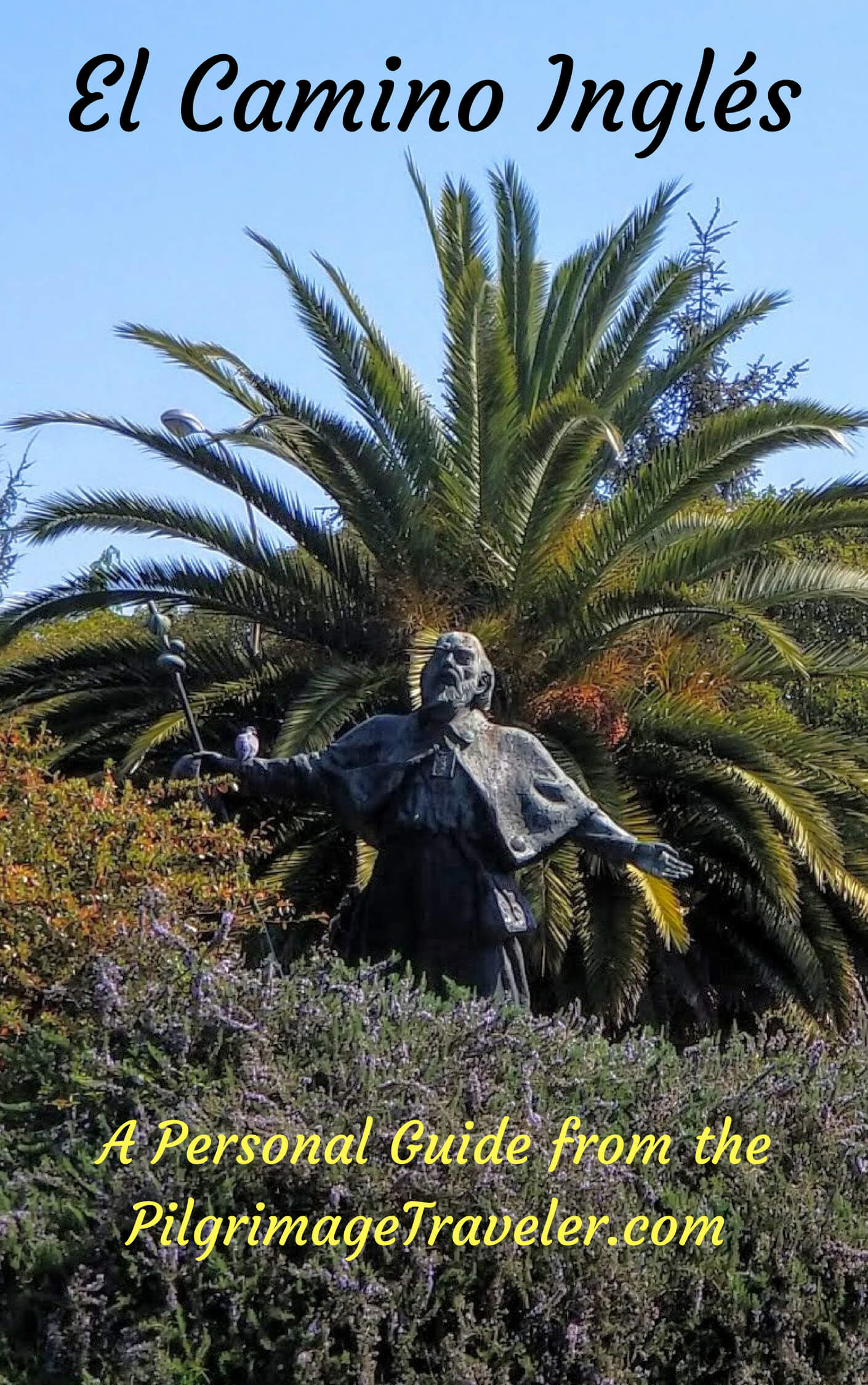
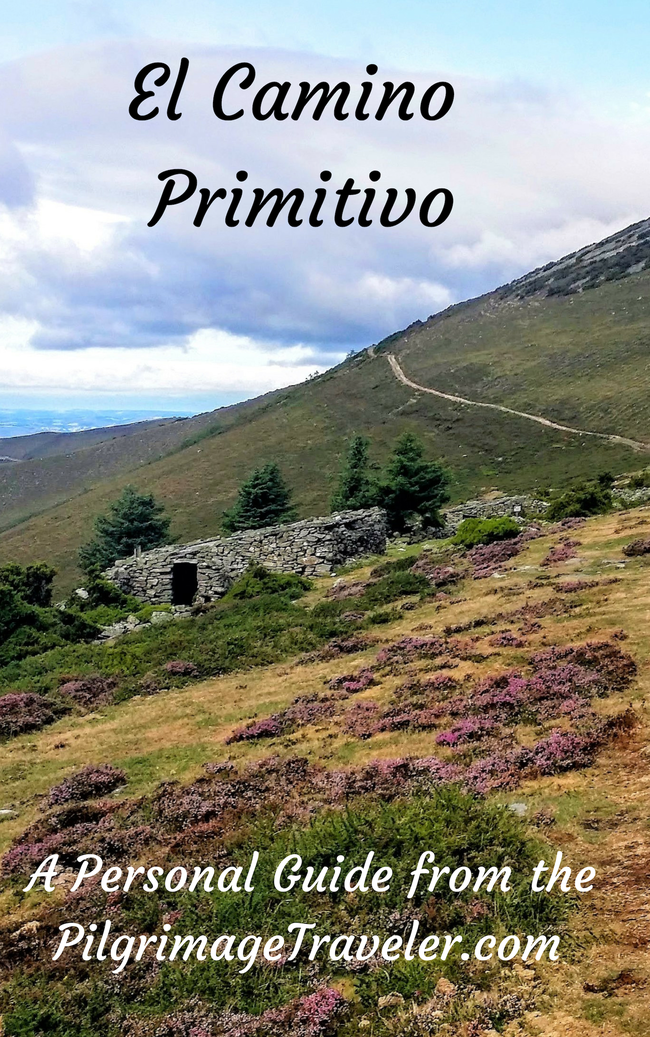
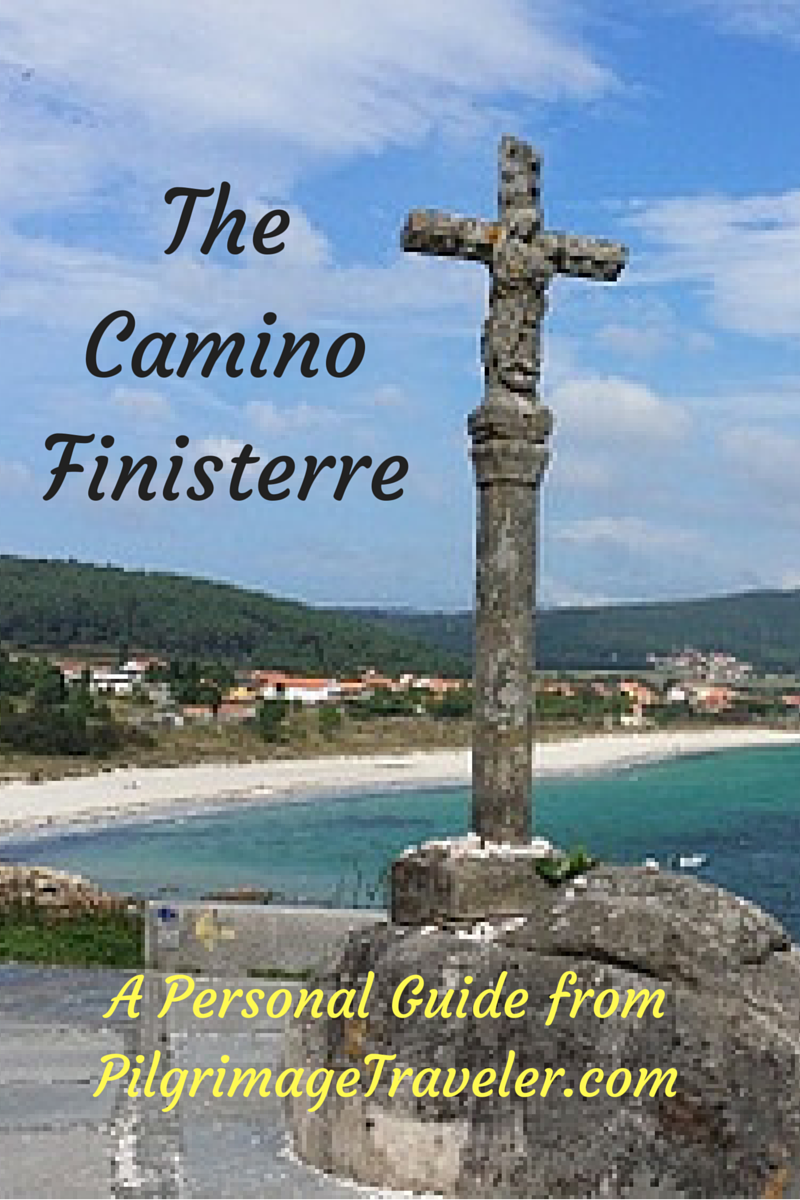
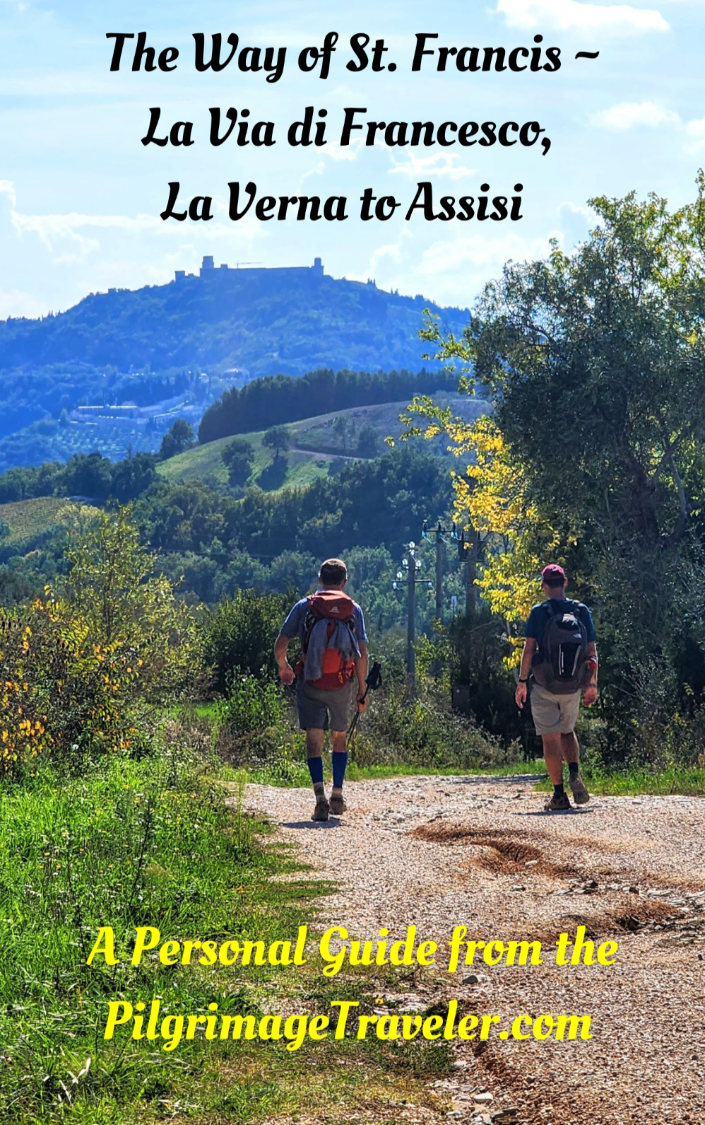

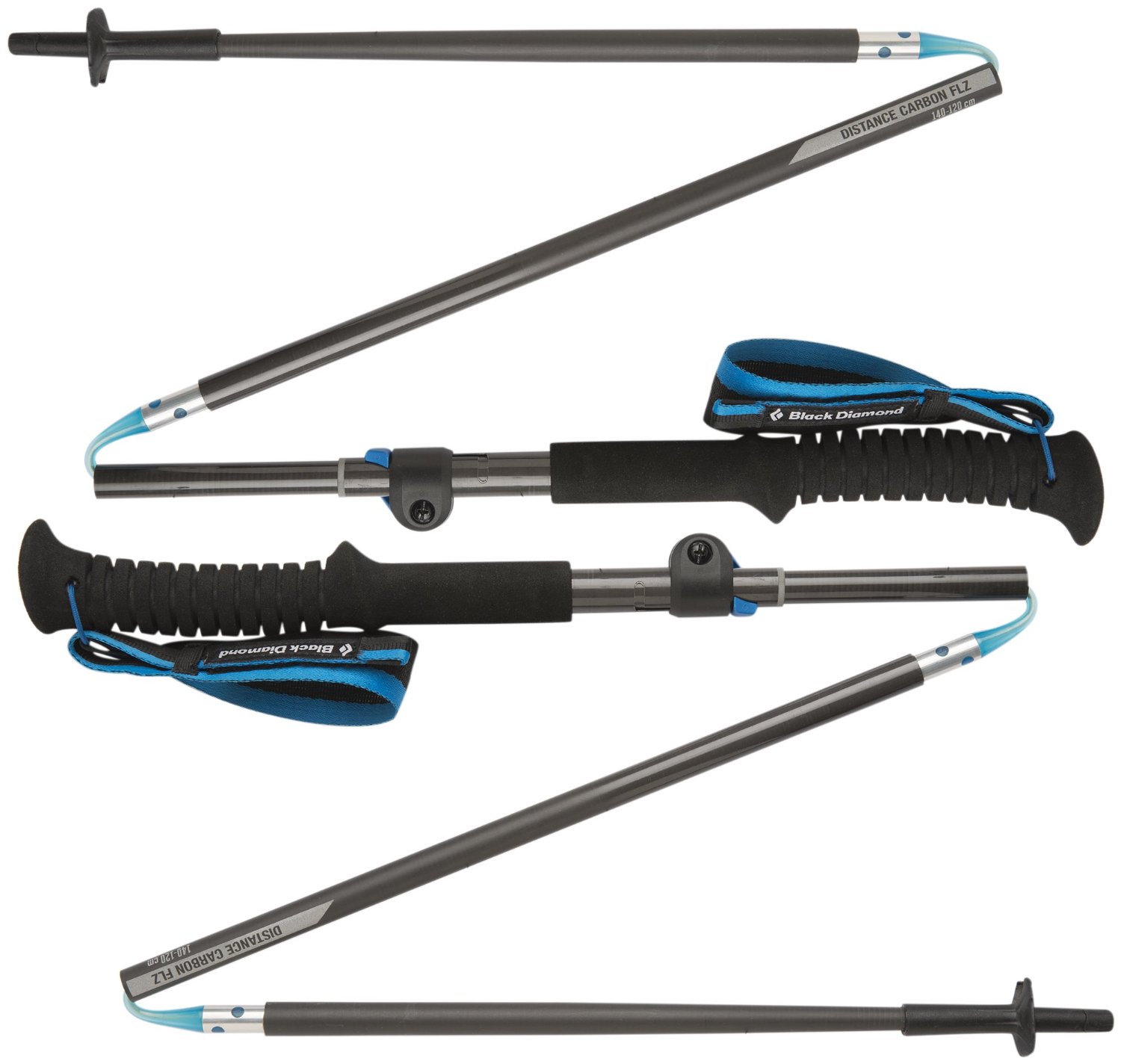


Your Opinion Matters! Comments
Have you had a similar experience, have some advice to give, or have something else you'd like to share? We would love to hear from you! Please leave us a comment in the box below.